Kyrie, LeBron overwhelm shorthanded Warriors to force Game 6 of Finals

Your teams. Your favorite writers. Wherever you want them. Personalize SI with our new App. Install on iOS or Android.
Sensational play is all the better with company. Cleveland has thrived in games this season behind the best of LeBron James and the best of Kyrie Irving, but rarely in the same night. The reality of playing multiple ball-dominant stars is that one will sometimes go underutilized relative to their maximum ability. To operate as a team is to make such sacrifices. Game 5, with Cleveland’s season at risk, proved exceptional. James took and took and took as Golden State’s defense ceded him open jumpers. Irving lit up the Warriors from inside and out. By night’s end, LeBron had put up a line (41 points, 16 rebounds, seven assists) no player in the Finals has ever matched, Irving became the first player to ever score 40+ (41 on 17-of-24 shooting) in tandem with his teammate during a game in the championship series, and the Cavs claimed a 112–97 win to push the series to a Game 6.
This was James at his most terrifying. Defenses of all kinds are structured around the concessions they can make to survive. Golden State, rightly given the percentages and alternatives, surmised that long LeBron jumpers were shots it could live with in the Finals. James approached those opportunities with an eagerness unseen in this series—confident enough to take the shot if also patient enough to seek out other means of scoring. Through those openings James shot 4-of-10 on mid-range jumpers and 4-of-8 on threes, totaling 24 points on just 18 shots. If that is the relatively inefficient portion of James’s output, one can surmise how damaging his scoring was overall. Cleveland did an excellent job of angling its screens to get LeBron driving downhill whenever possible and attacking the most hapless switches put in front of him. Andre Iguodala did what he could and wound up buried beneath the very shots the defense was designed to give up.
• MORE NBA:LeBron’s brilliance, Irving’s emergence spoil Warriors’ party
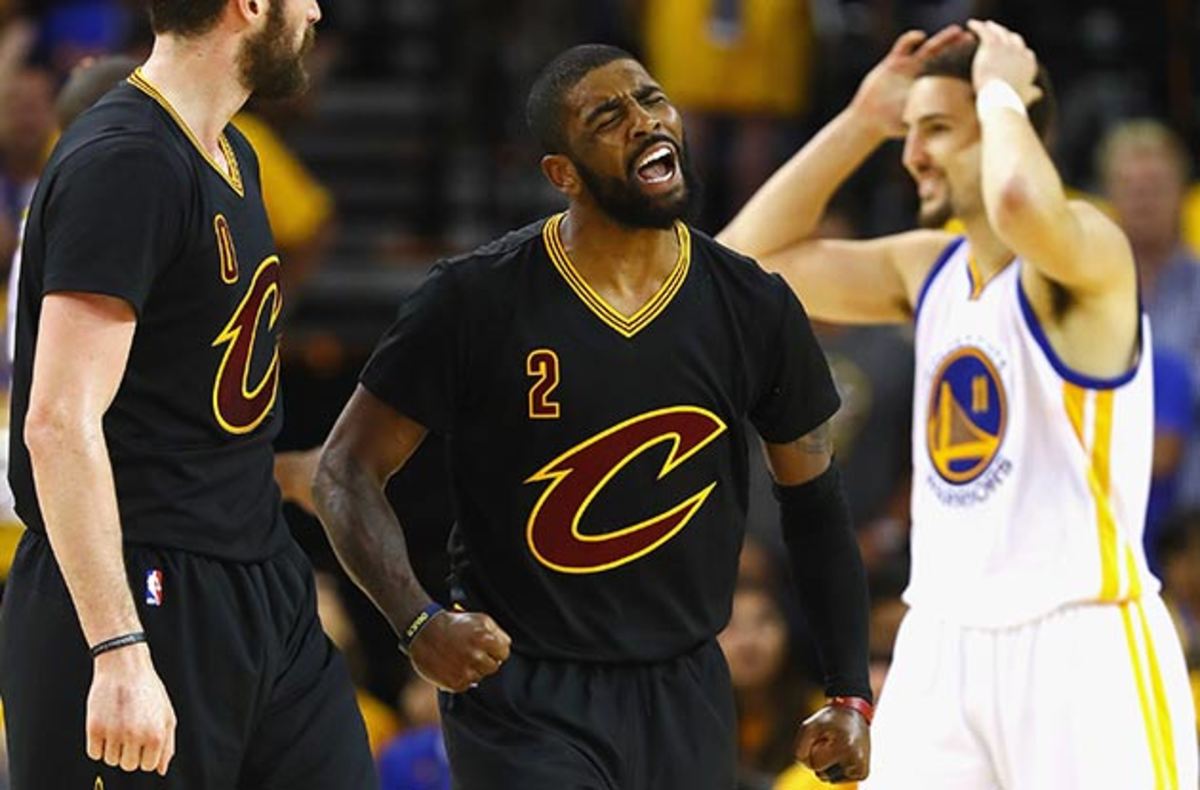
O’Neal) have ever scored 40+ points in a Finals game on fewer than 25 shot attempts. Both required 14 free throw attempts to get there. Irving, thanks to some unprecedented shot-making, managed to hit those marks while shooting just two free throws.
Considering just how brilliant James and Irving were individually, it would be unfair to attribute the difference in this game to Green’s absence. At the same time, the proceedings were altered on a fundamental level—from matchups to screen exchanges to defensive rebounding to offensive facilitation to rim protection—that it would be impossible to discount his potential impact. Cleveland couldn’t build its lead beyond single digits until deep in the fourth quarter. Green at the very least closes that gap, perhaps to the point of challenging the game’s result. No matter; Green didn’t play due to his own poor judgment and the Warriors paid the price for his continued indiscretions. The inconvenience of his absence, too, was compounded by a stroke of bad luck.
• Sports Illustrated’s 100 best Finals photos over the years
100 Best NBA Finals Photos
2016
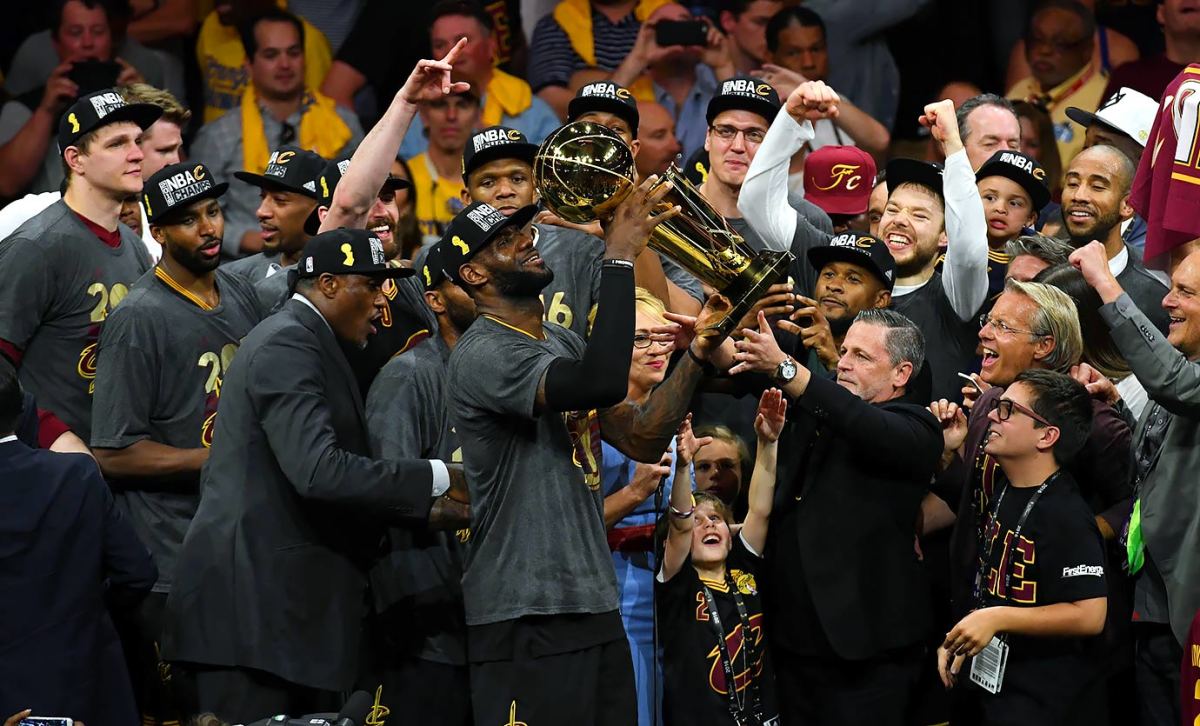
LeBron James holds up the shiny gold trophy in what might be his sweetest championship yet, the one he is so proudly bringing home to his native northeast Ohio just as he promised to do when he returned to the Cavaliers two summers earlier.
2015
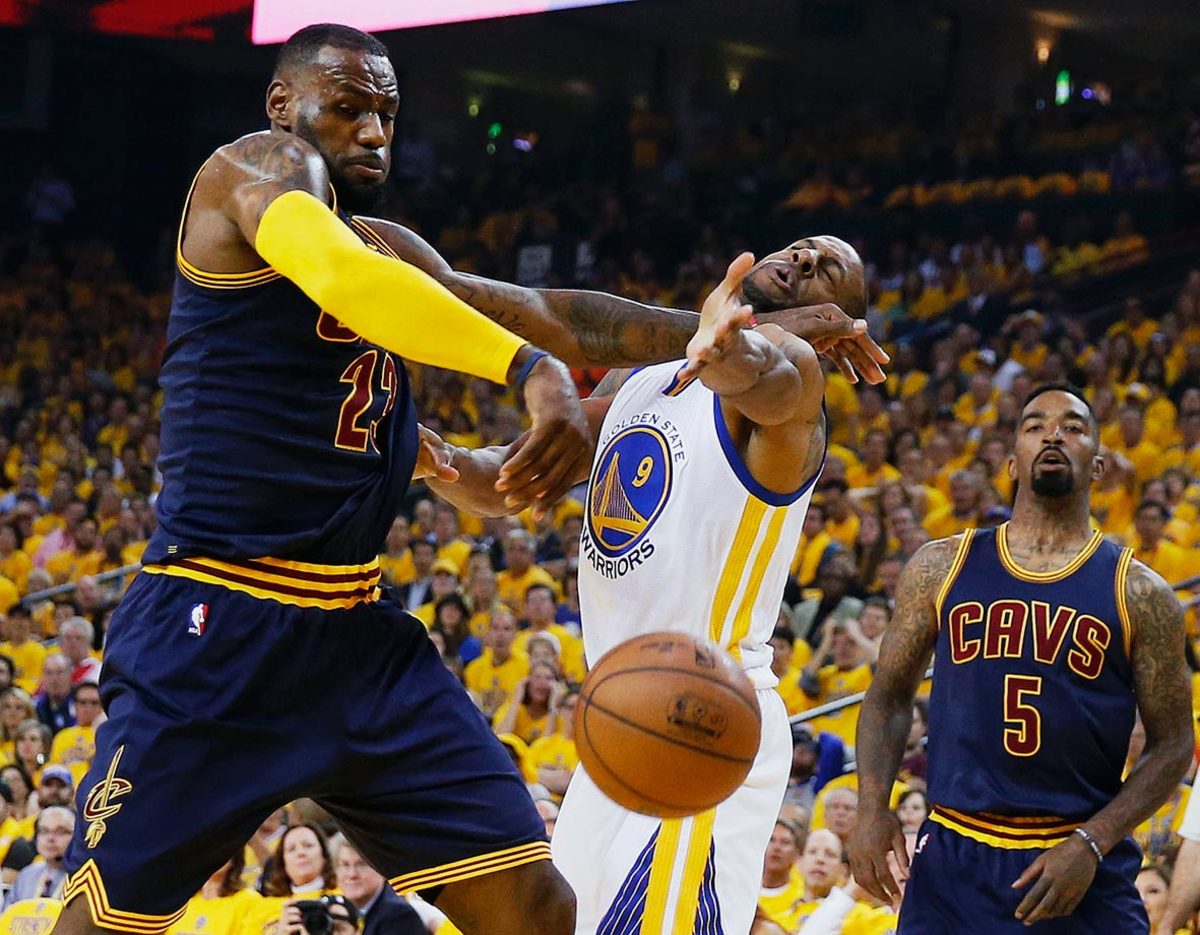
LeBron James loses the ball as he tries to fend off Andre Iguodala in Game 1 between the Warriors and Cavaliers. Golden State won the game and the series 4-2. Iguodala became the first player to win the Finals MVP award without having started every game in the series. He was tasked with guarding LeBron, who made only 38.1 percent of his shots when Iguodala was in the game.
2015
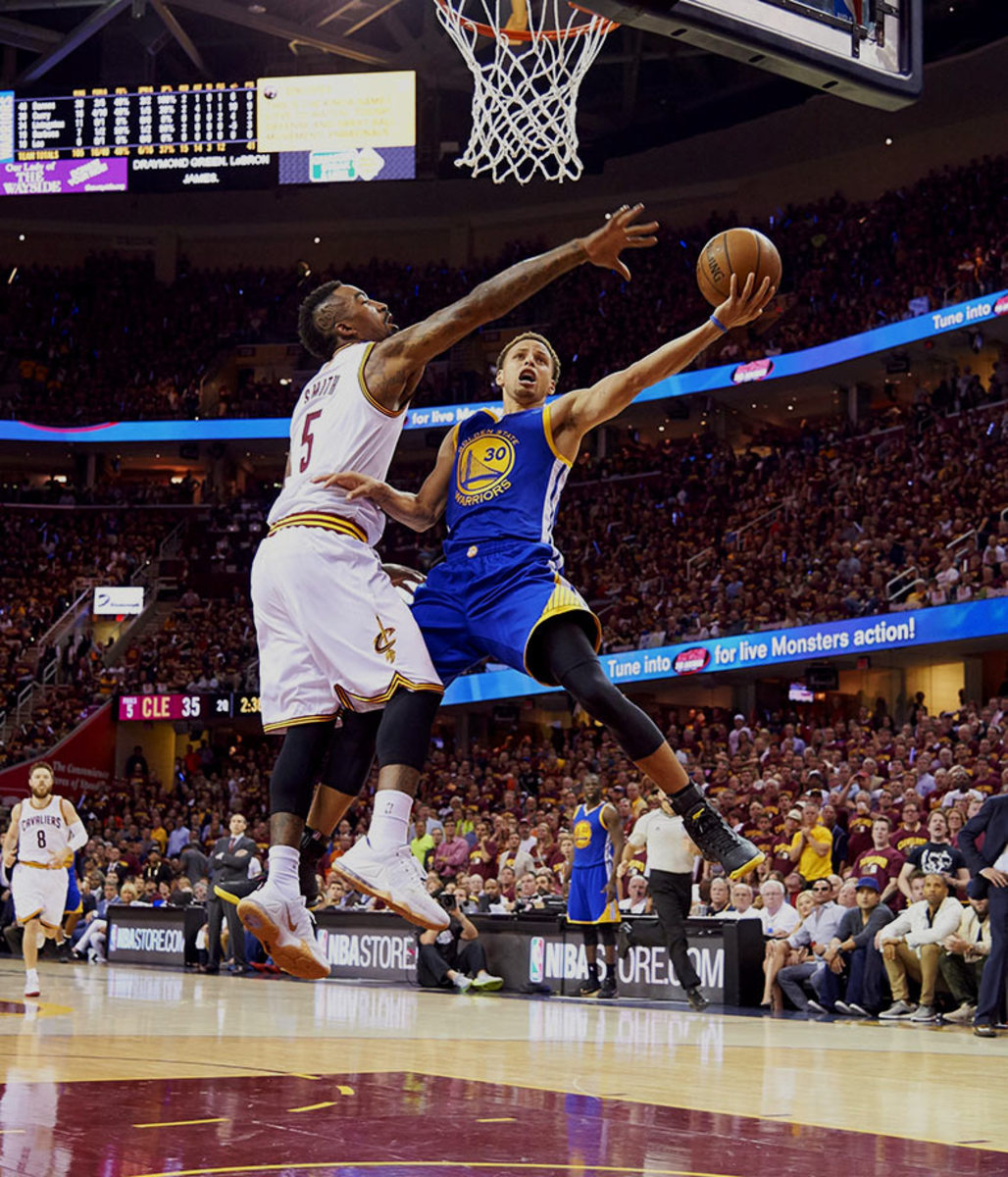
Steph Curry goes to the left hand against J.R. Smith to score two of his 25 points in Game 6. The Warriors defeated the Cavs 105-97 to clinch the franchise's first NBA title since 1975.
2014
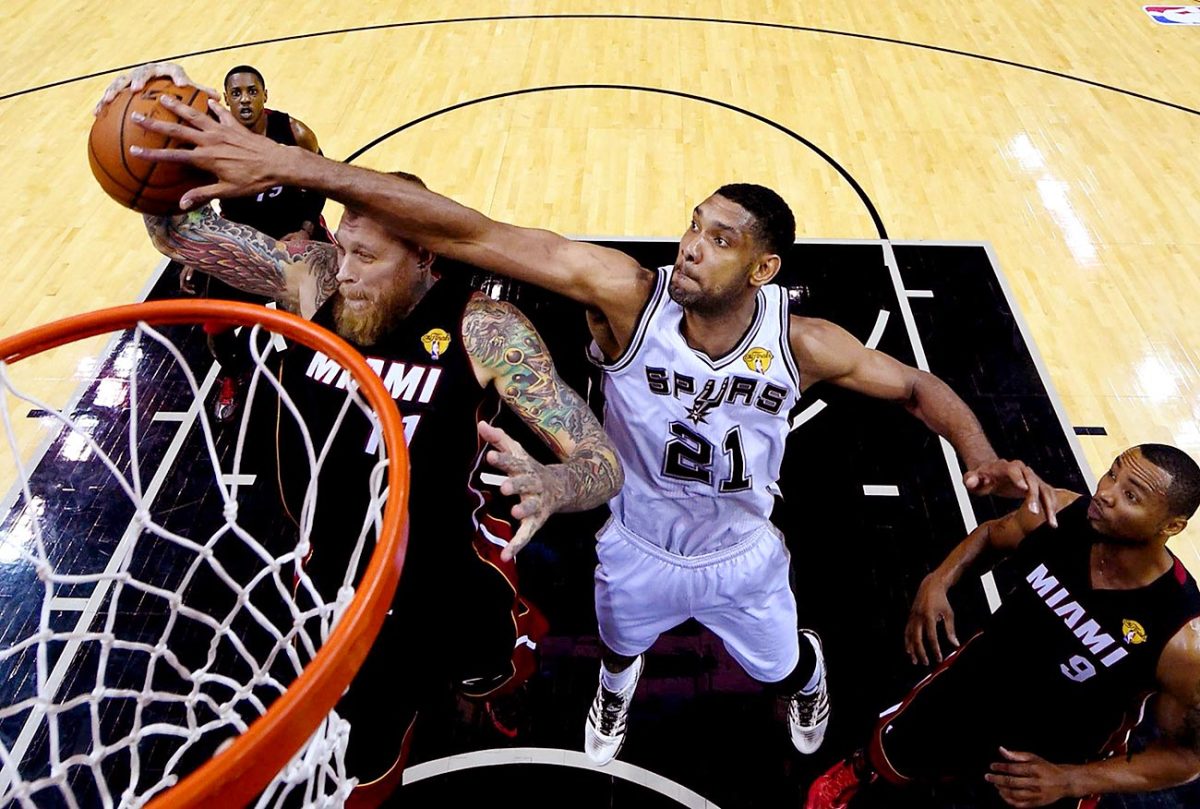
A year after an excruciating loss to the Miami Heat in the NBA Finals, Tim Duncan and the Spurs got their revenge, winning the title in five games.
2013
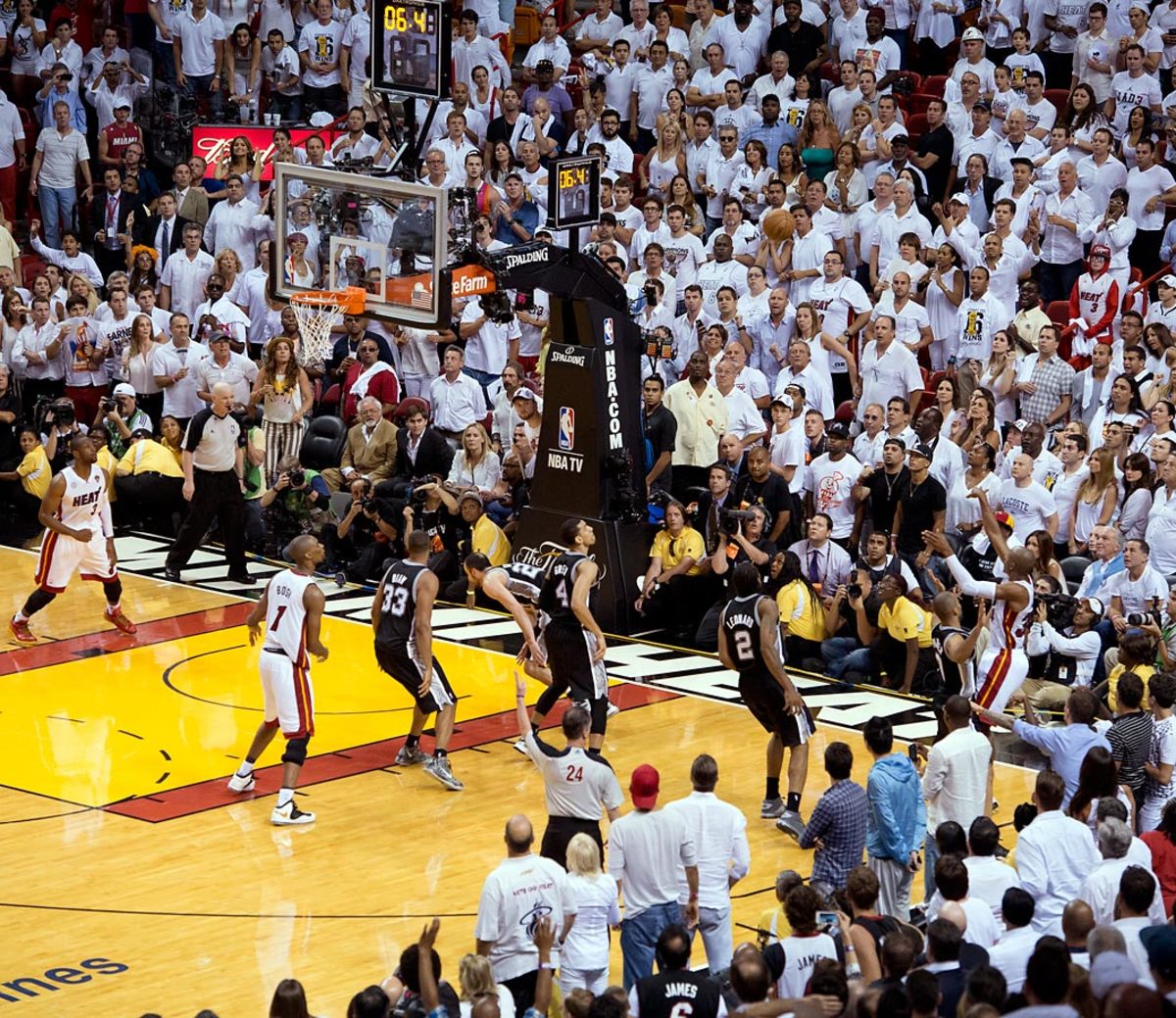
Ray Allen lets loose a series-changing three over Tony Parker in Game 6. With Miami down 3-2 in the series, it was the veteran Allen who sent the game to overtime and an eventual Heat victory. With a huge momentum boost, Miami went on to win the series.
2013
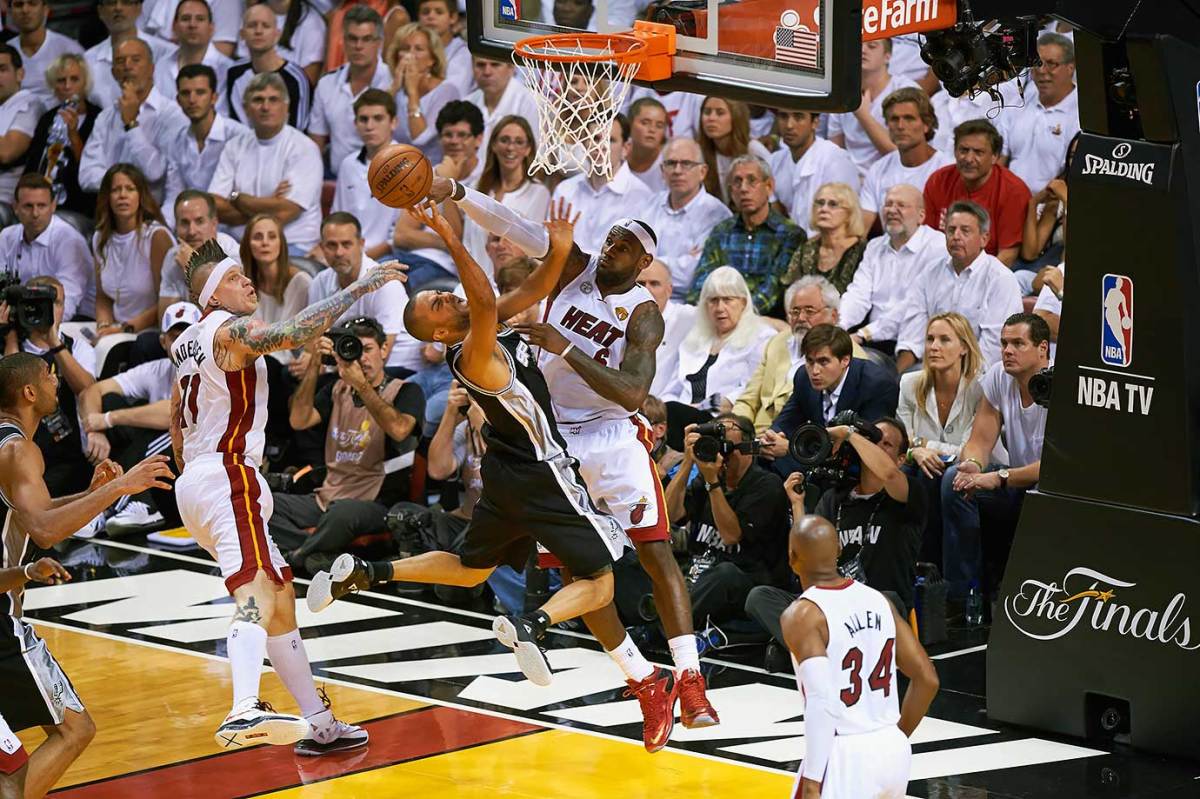
LeBron James led Miami to the finals for a third straight year and to a second consecutive title, duking it out with the Spurs for seven games. James won his second Finals MVP award with another series of stellar showings.
2012
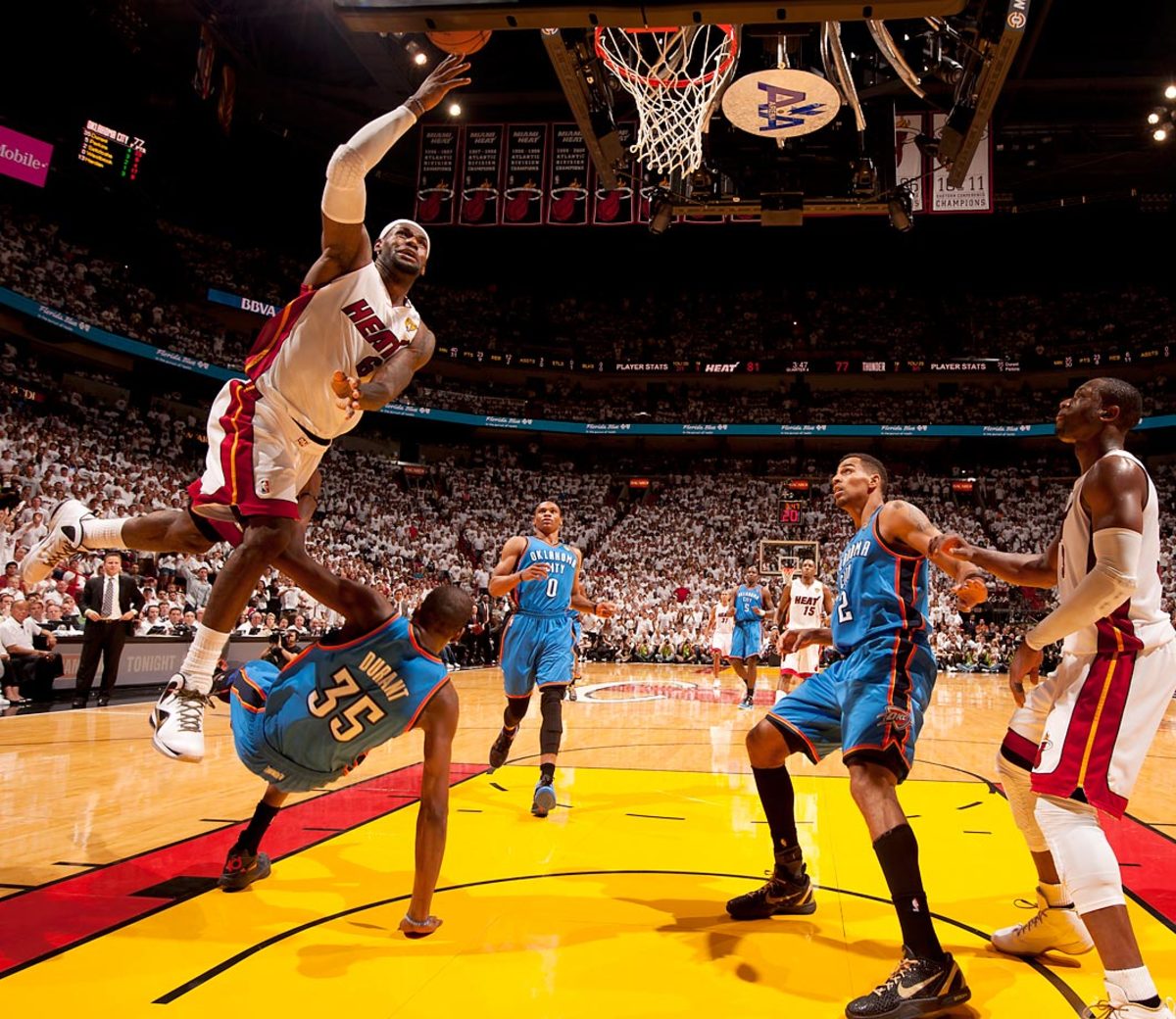
LeBron James soars over Kevin Durant in Game 3. James got the championship monkey off his back in a big way, averaging 28.6 points, 10.2 rebounds and 7.4 assists in the series.
2012
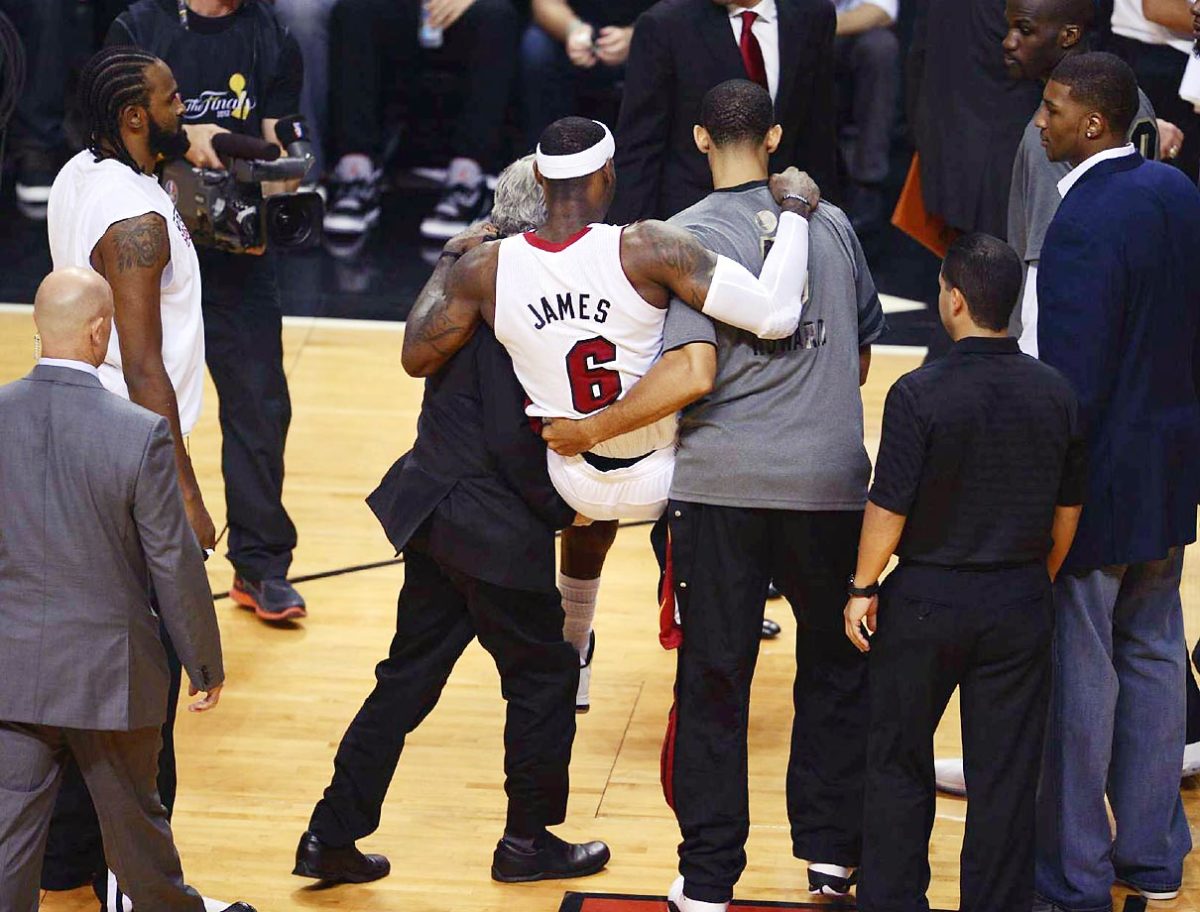
LeBron James battled cramps in Game 4 and was unable to finish out a 104-98 Heat victory. He still had 26 points, nine rebounds and 12 assists.
2011
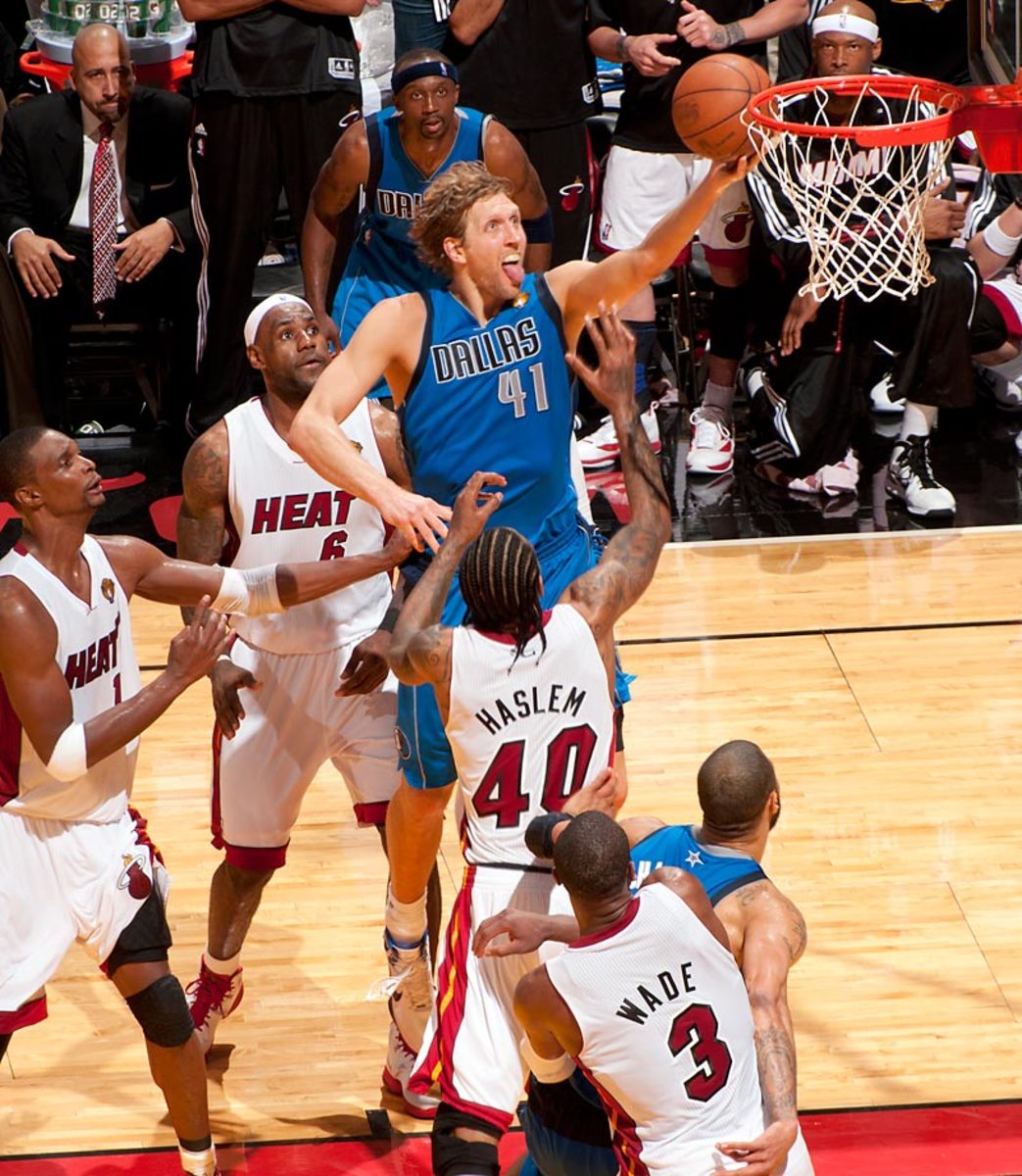
Dirk Nowitzki avoids traffic to drop in the game-winner for Dallas in Game 2. Nowitzki's clutch shot capped a furious 15-point fourth-quarter Mavs comeback. Dallas would knock off favored Miami and the "Big Three" of LeBron James, Dwyane Wade and Chris Bosh in six games in a rematch of the 2006 Finals.
2010
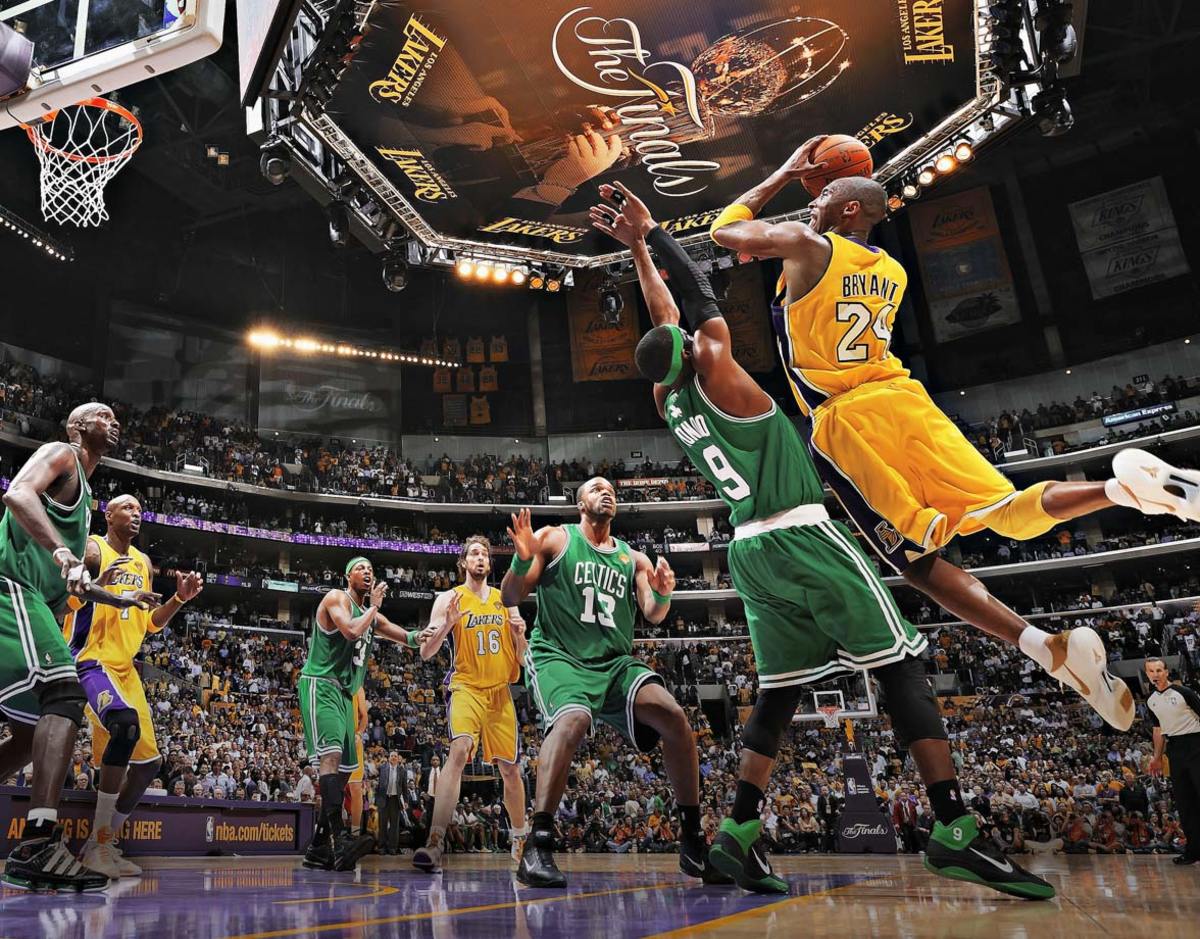
Kobe Bryant looks to shoot over Rajon Rondo in Game 6 between the Lakers and Celtics. Kobe averaged 29 points per game in the series, en route to his second consecutive Finals MVP award.
2010
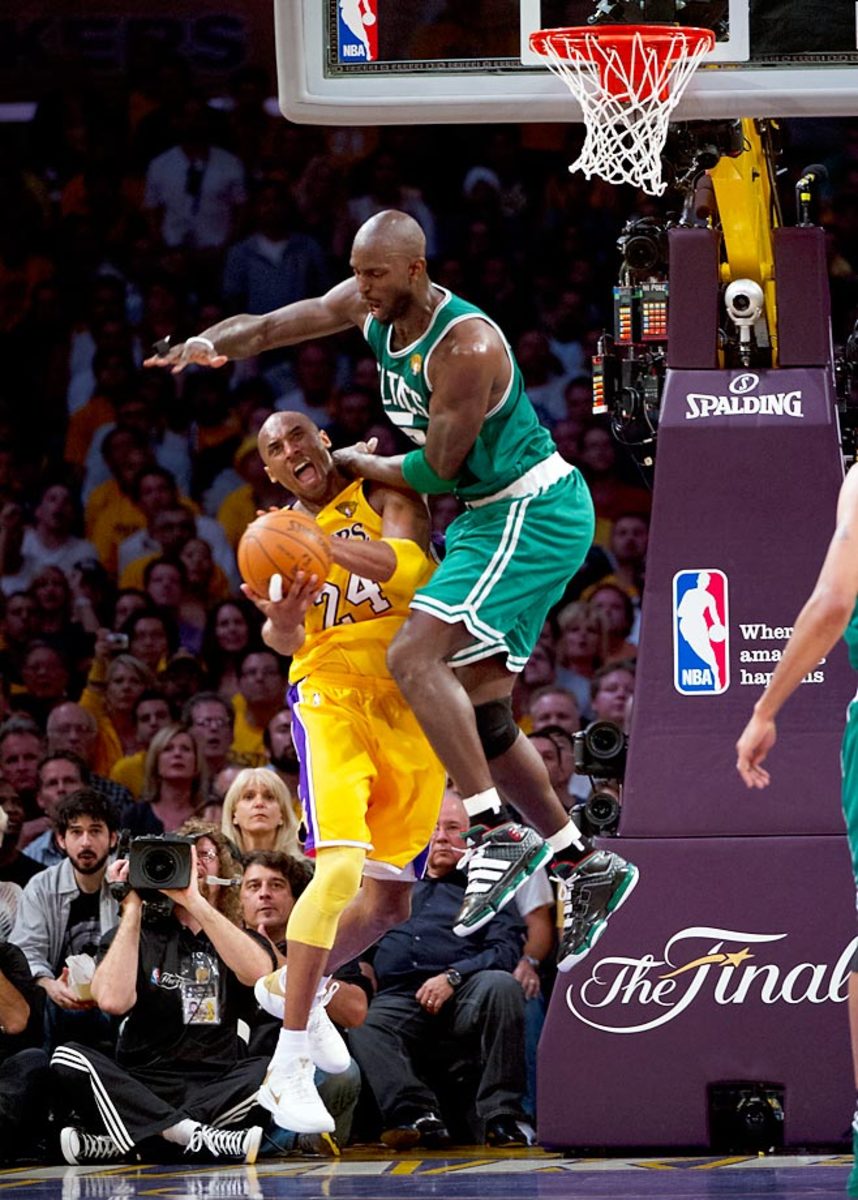
Kevin Garnett bodies a driving Kobe Bryant in a tight Game 7. The Celtics-Lakers rivalry was renewed in a back-and-forth series that saw Los Angeles come out on top for a second straight title.
2010
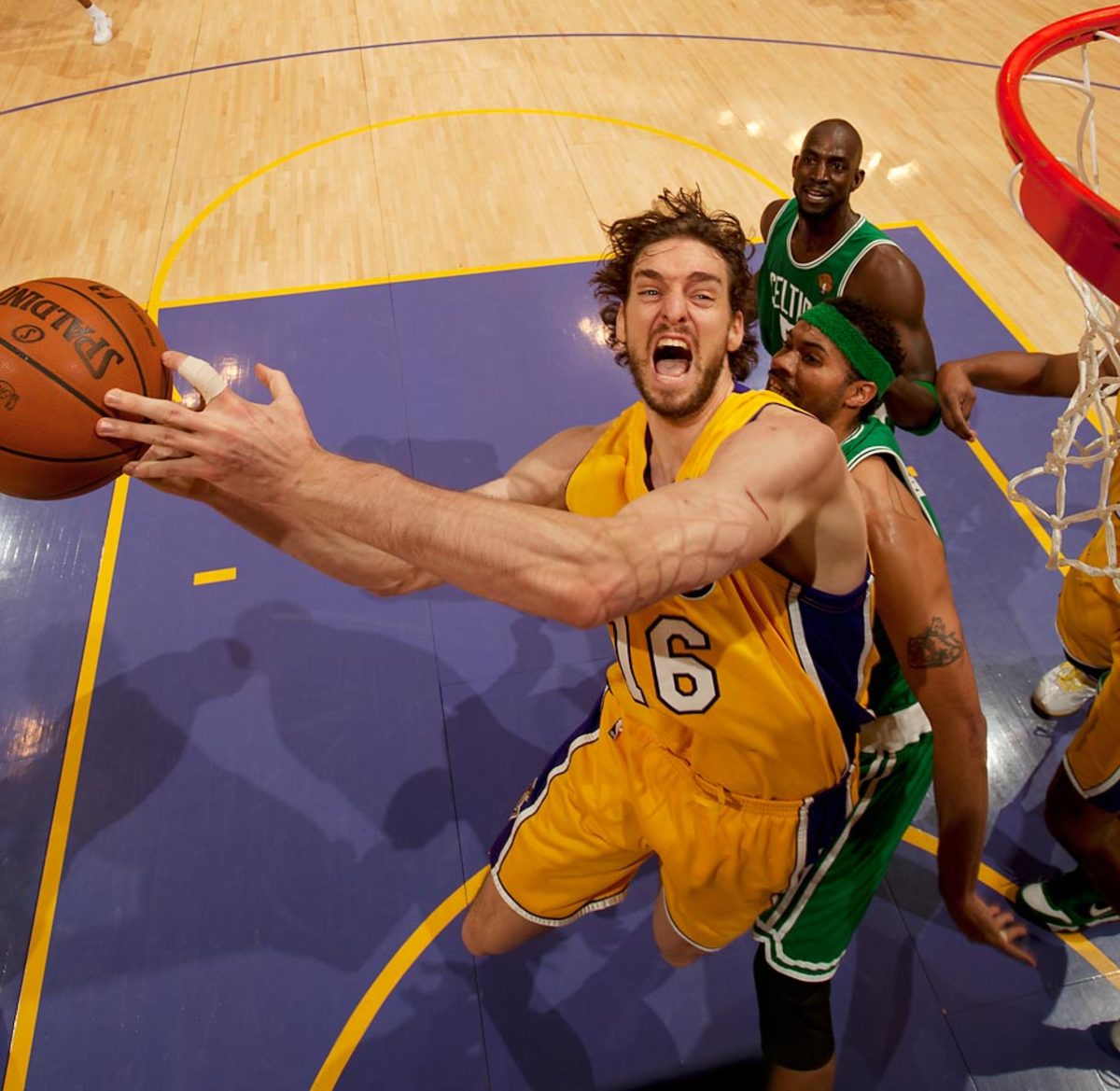
Pau Gasol owned the paint in Game 7 with 19 points and 18 rebounds to push the Lakers to an 83-79 win.
2009
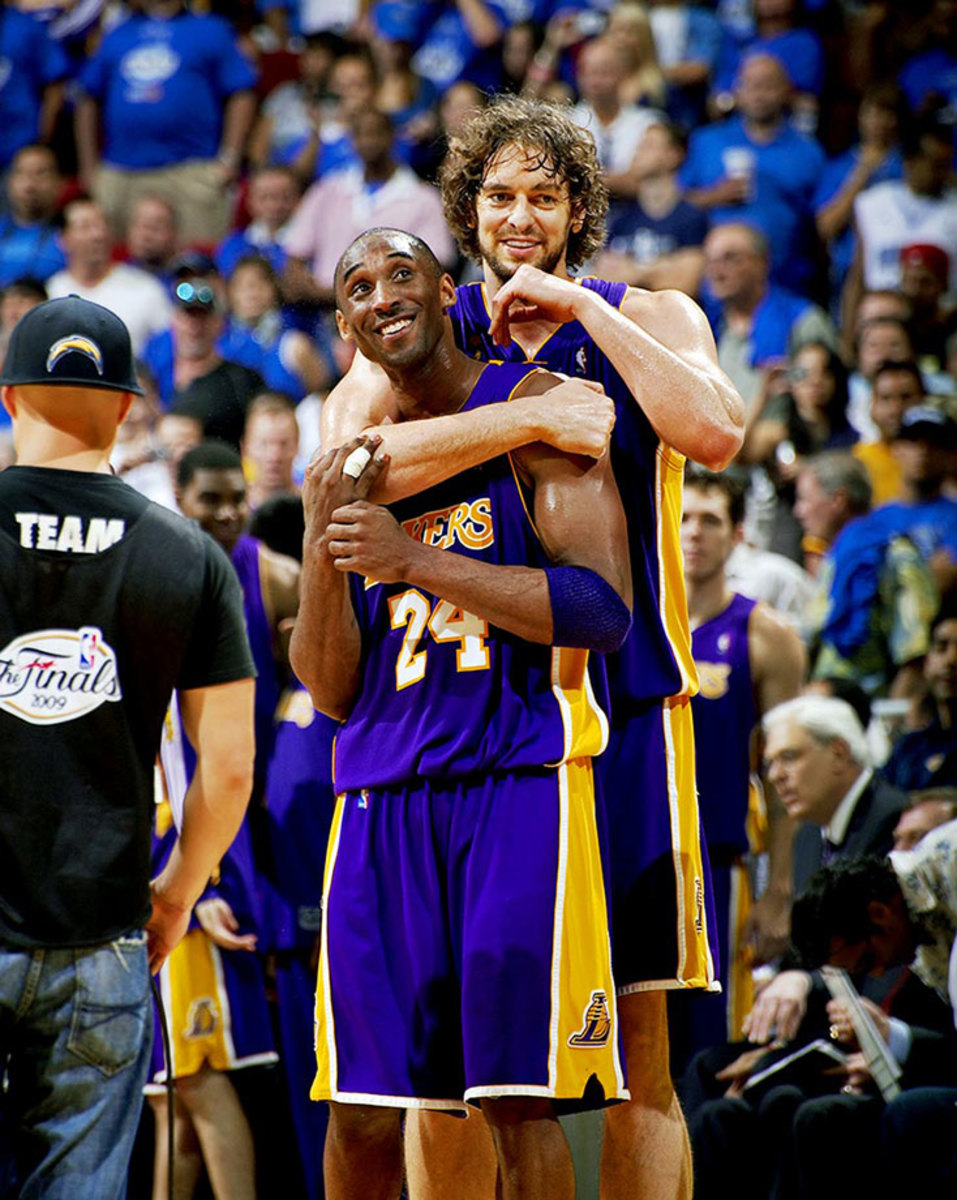
Pau Gasol hugs Kobe Bryant near the end of a series-clinching Game 5. The duo was crucial to L.A.'s five-game victory over Orlando, with Bryant named Finals MVP and winning his first title out of Shaquille O'Neal's shadow.
2008
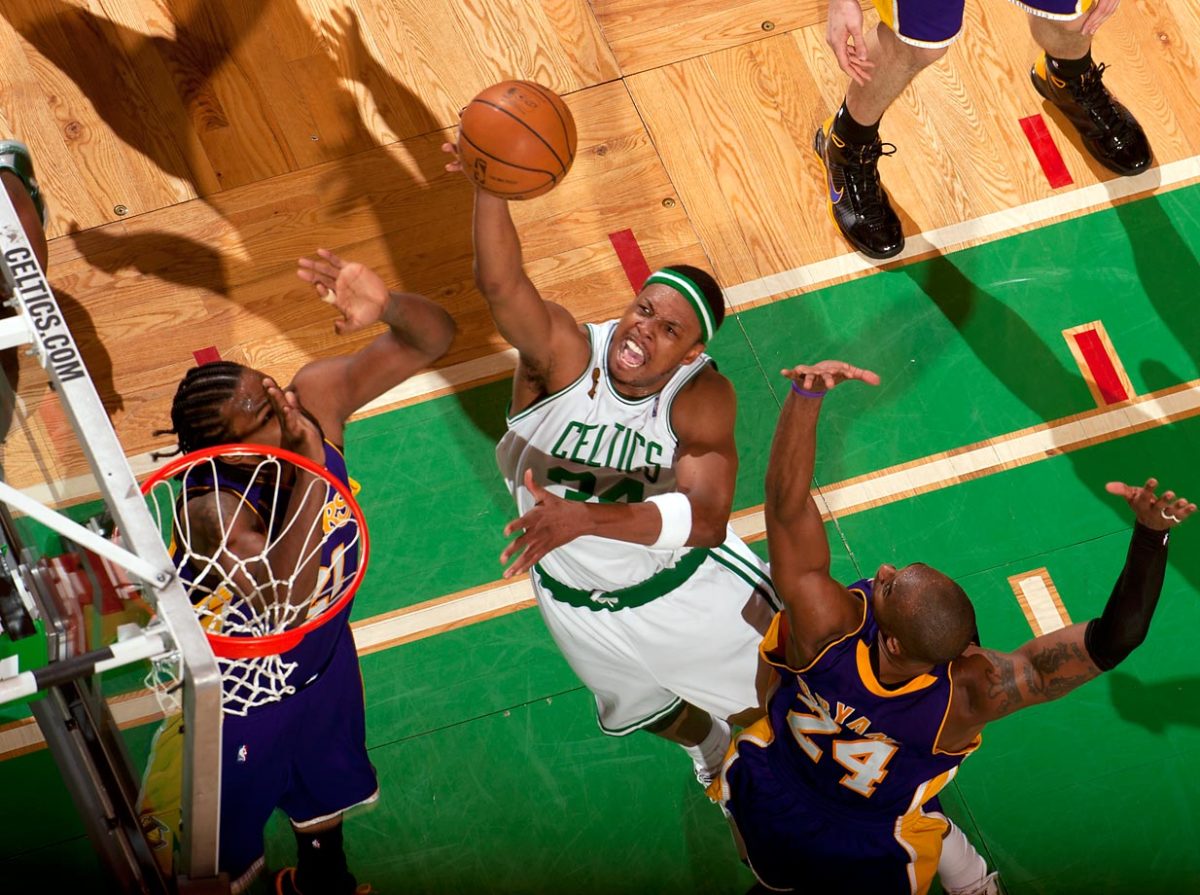
Averaging nearly 22 points per game, Finals MVP Paul Pierce paired with offseason acquisitions Kevin Garnett and Ray Allen to return the Celtics to their championship ways against the rival Lakers. The win marked the first title for each of the three stars.
2007
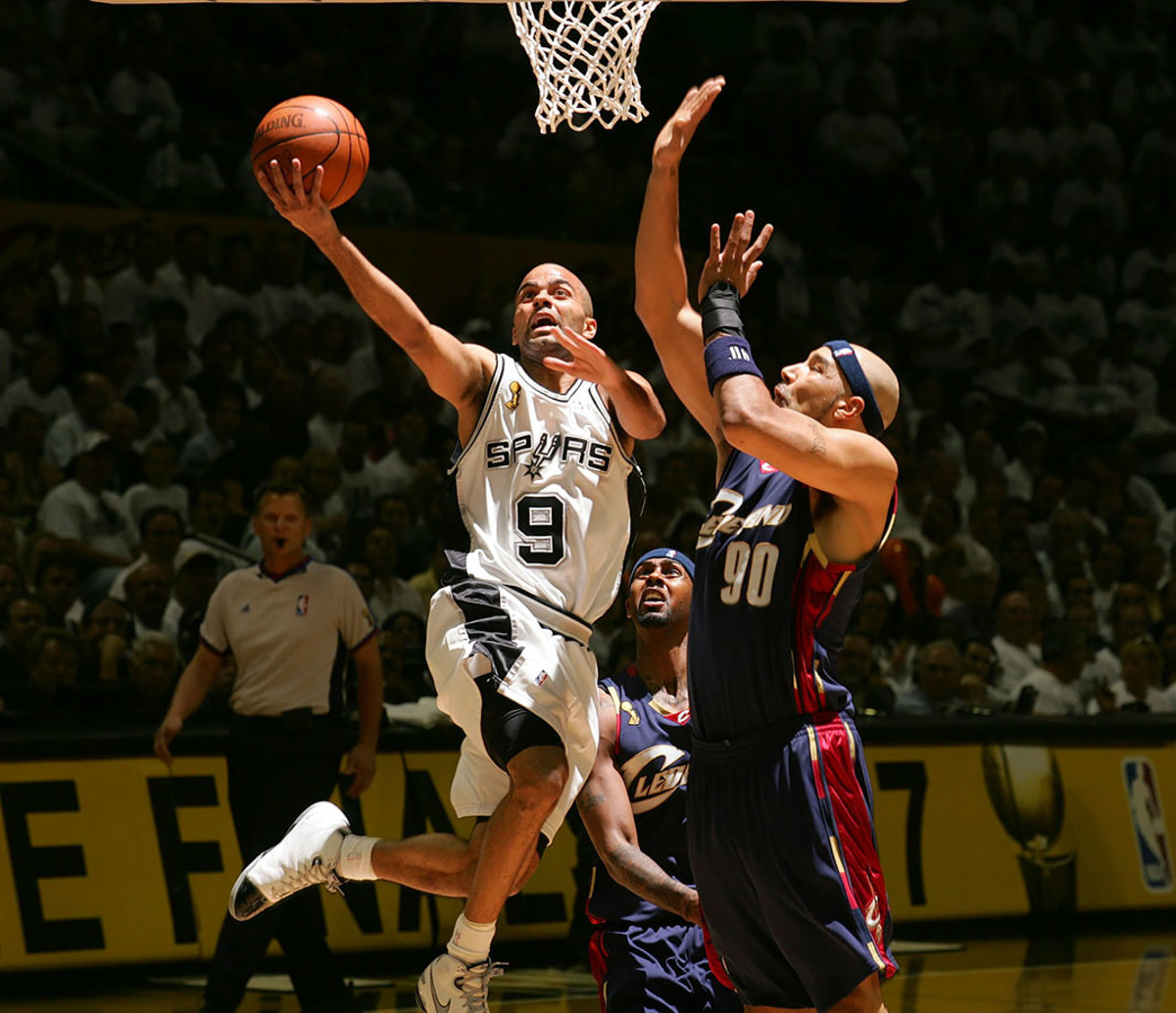
San Antonio's Tony Parker was named Most Valuable Player of the series, averaging 24.5 points per game in the sweep.
2007
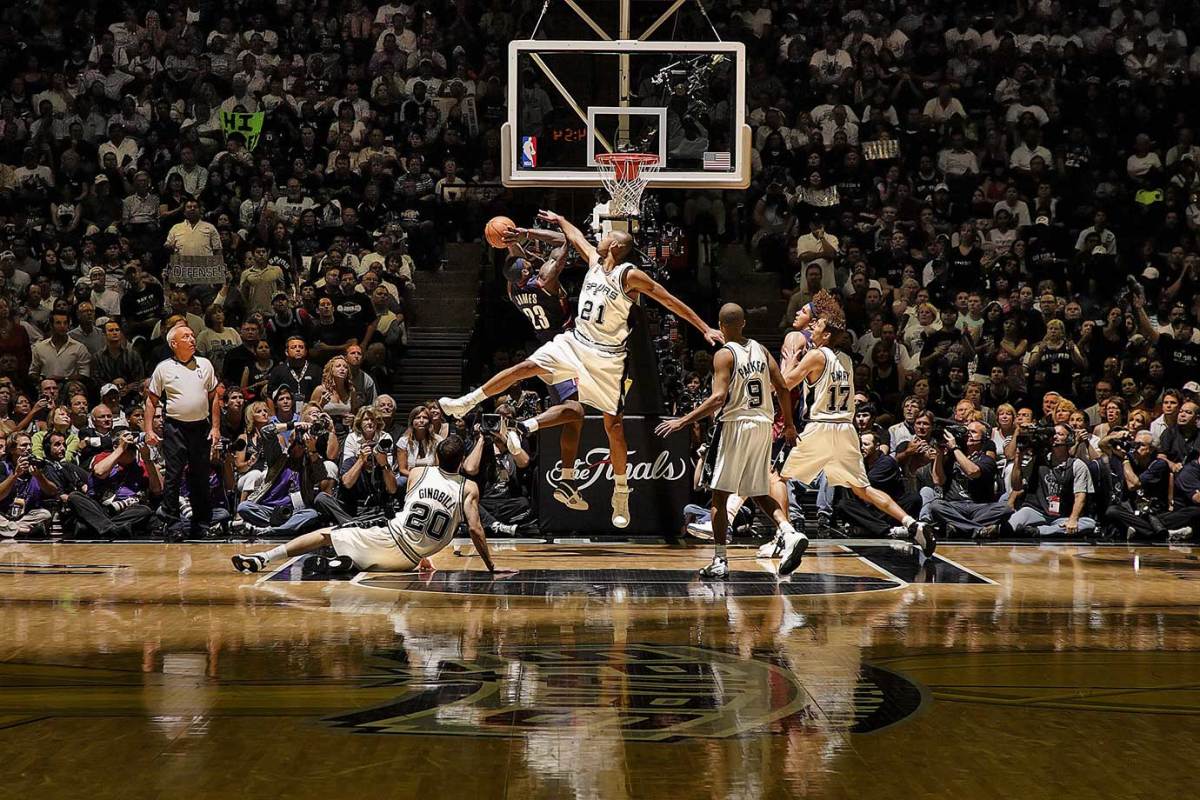
Tim Duncan and the Spurs spoiled LeBron James' first Finals, limiting him to 35.6% shooting and efficiently sweeping the series.
2006
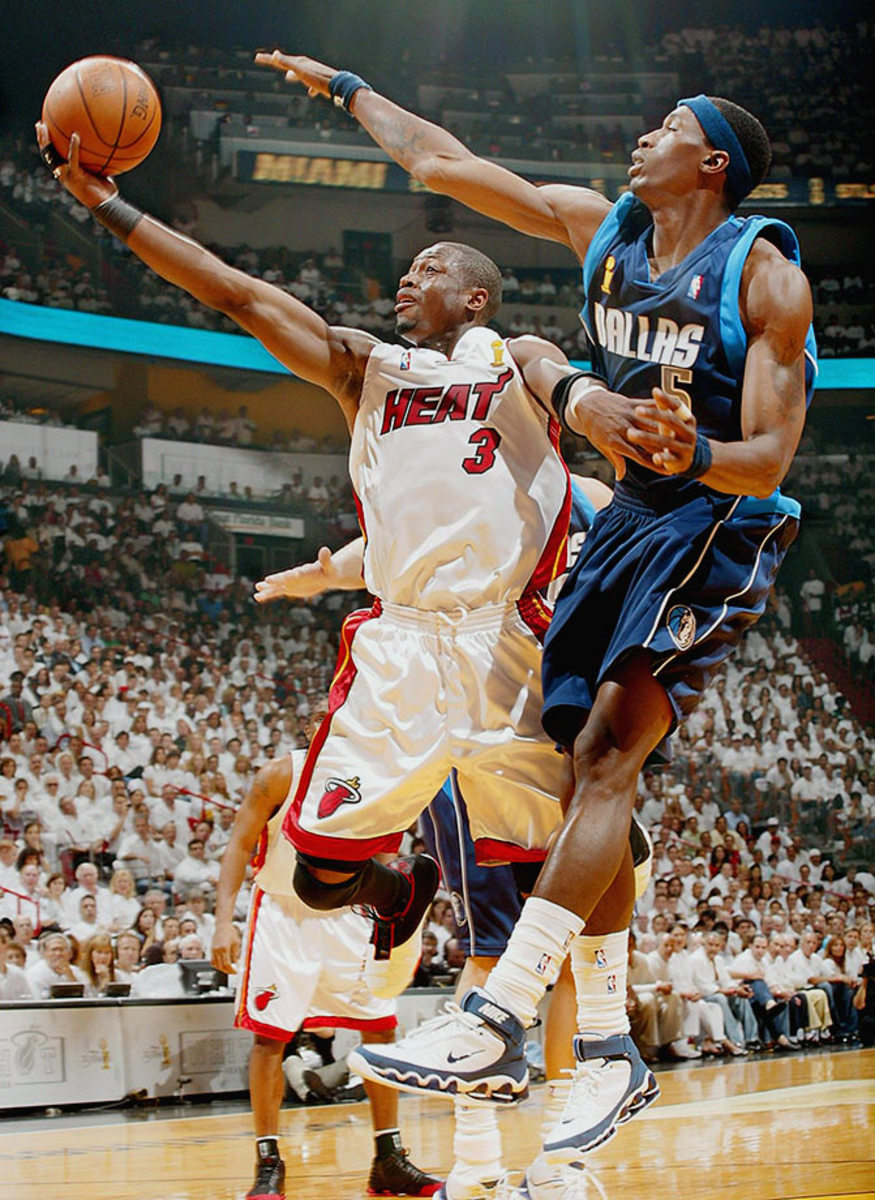
Dwyane Wade, at just 24 years old, catalyzed the Heat past Dallas in six, memorably scoring 42 points and leading a comeback from a 13-point deficit with six minutes left in Game 3. The series marked Wade's arrival as a superstar, as he averaged nearly 35 points and eight rebounds per game to lead Miami to its first title.
2005
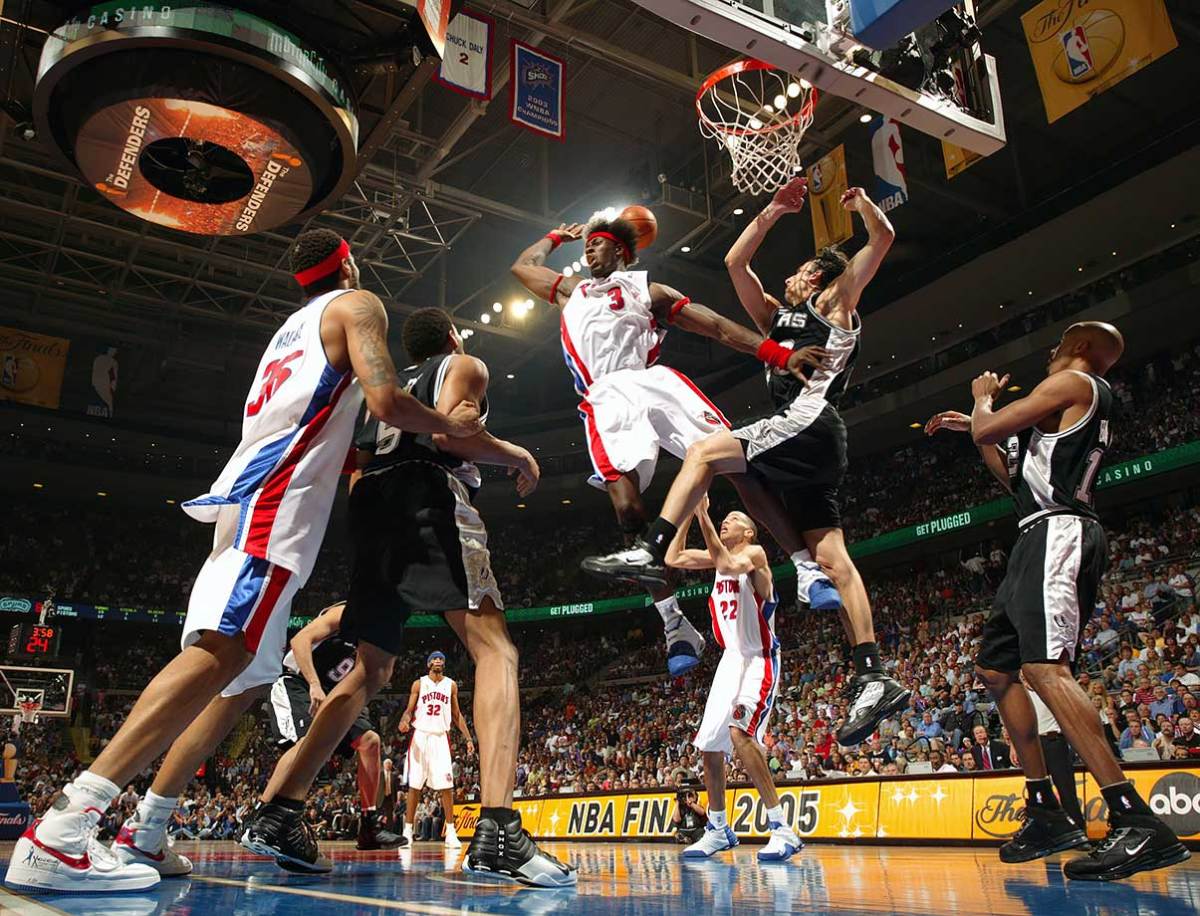
Ben Wallace and Manu Ginobili battle for a loose ball in Game 5 between the Pistons and Spurs. The past two NBA champs traded blows in a tough series that went seven games, with San Antonio coming out on top.
2005
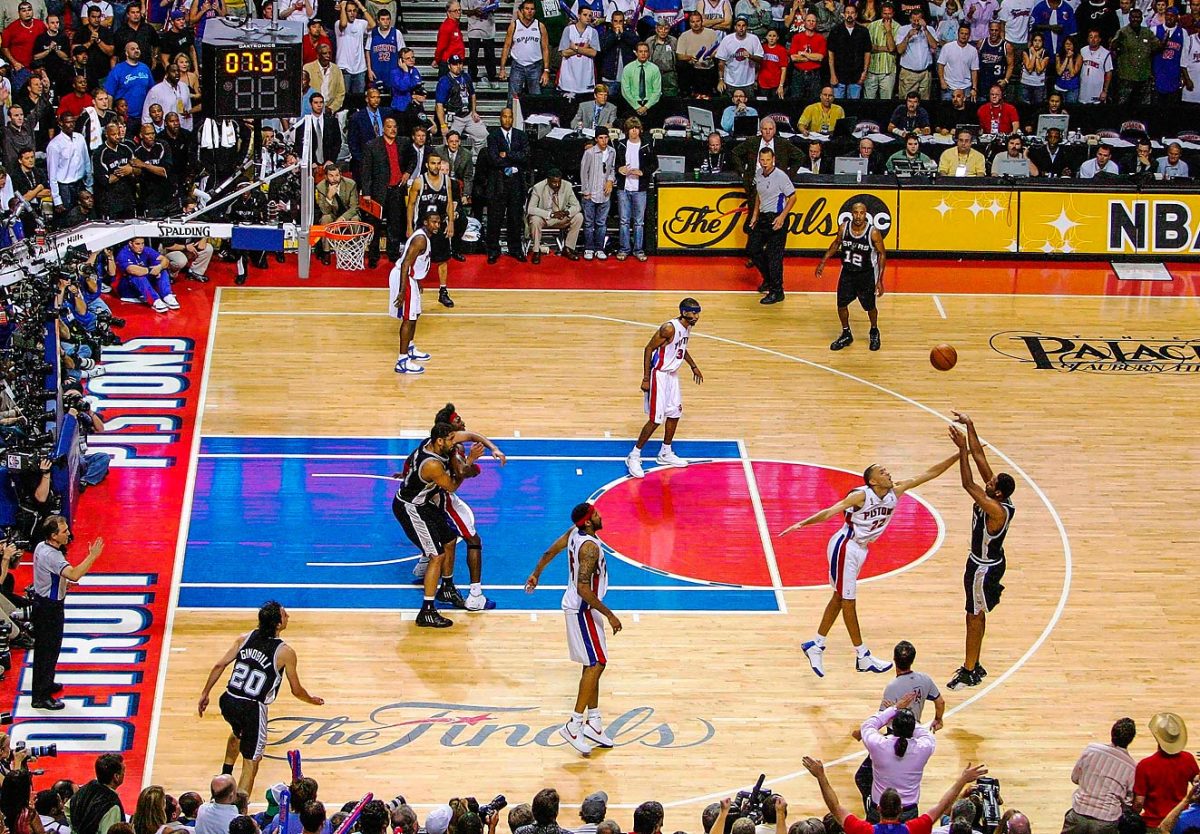
Robert Horry, better known as "Big Shot Rob," buries the three to win Game 5 for San Antonio.
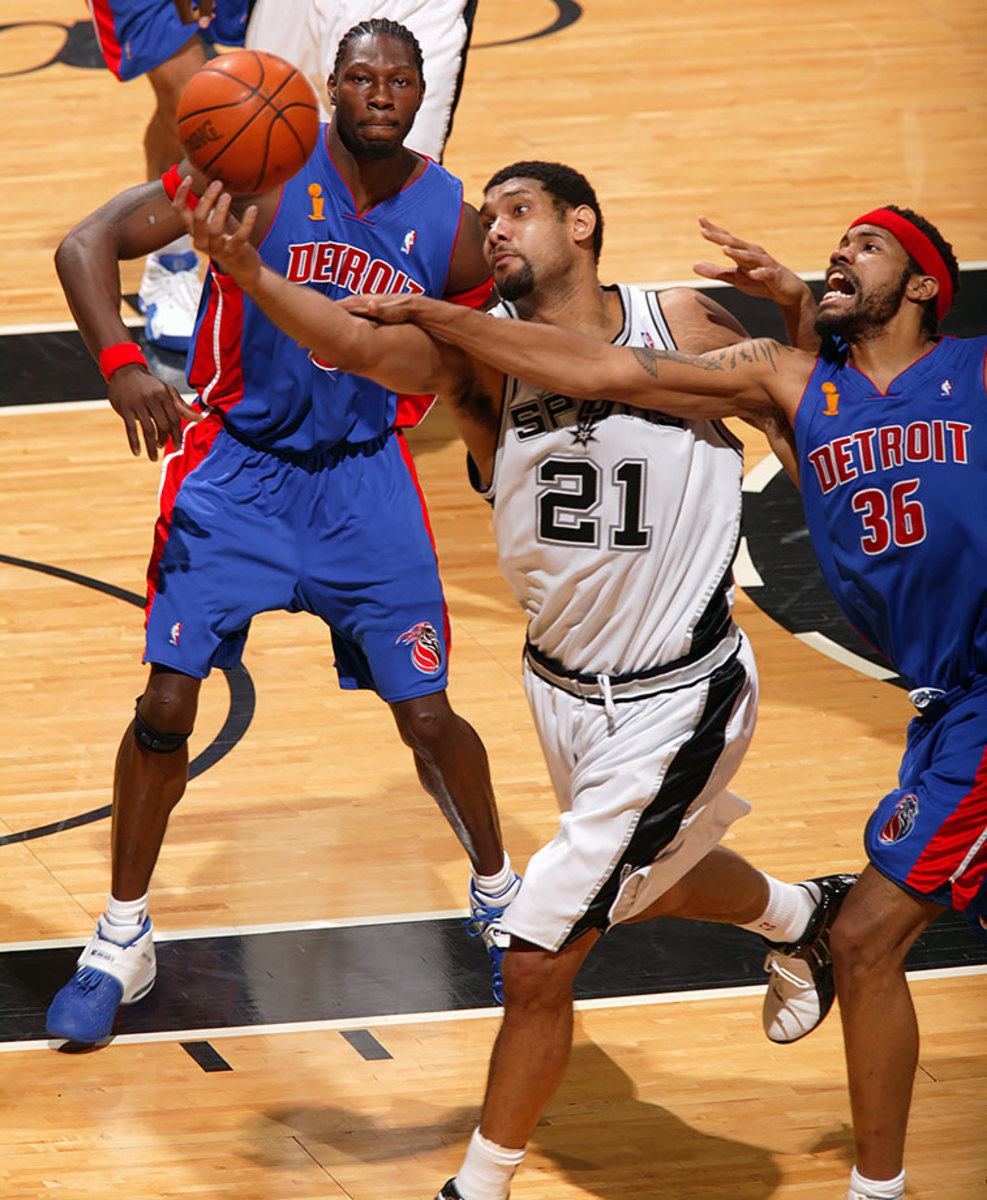
Tim Duncan drives to basket against Rasheed Wallace in Game 7 between the Spurs and Pistons. Duncan scored a game-high 25 points and 11 rebounds as he led San Antonio to their third title and won his third Finals MVP award.
2004
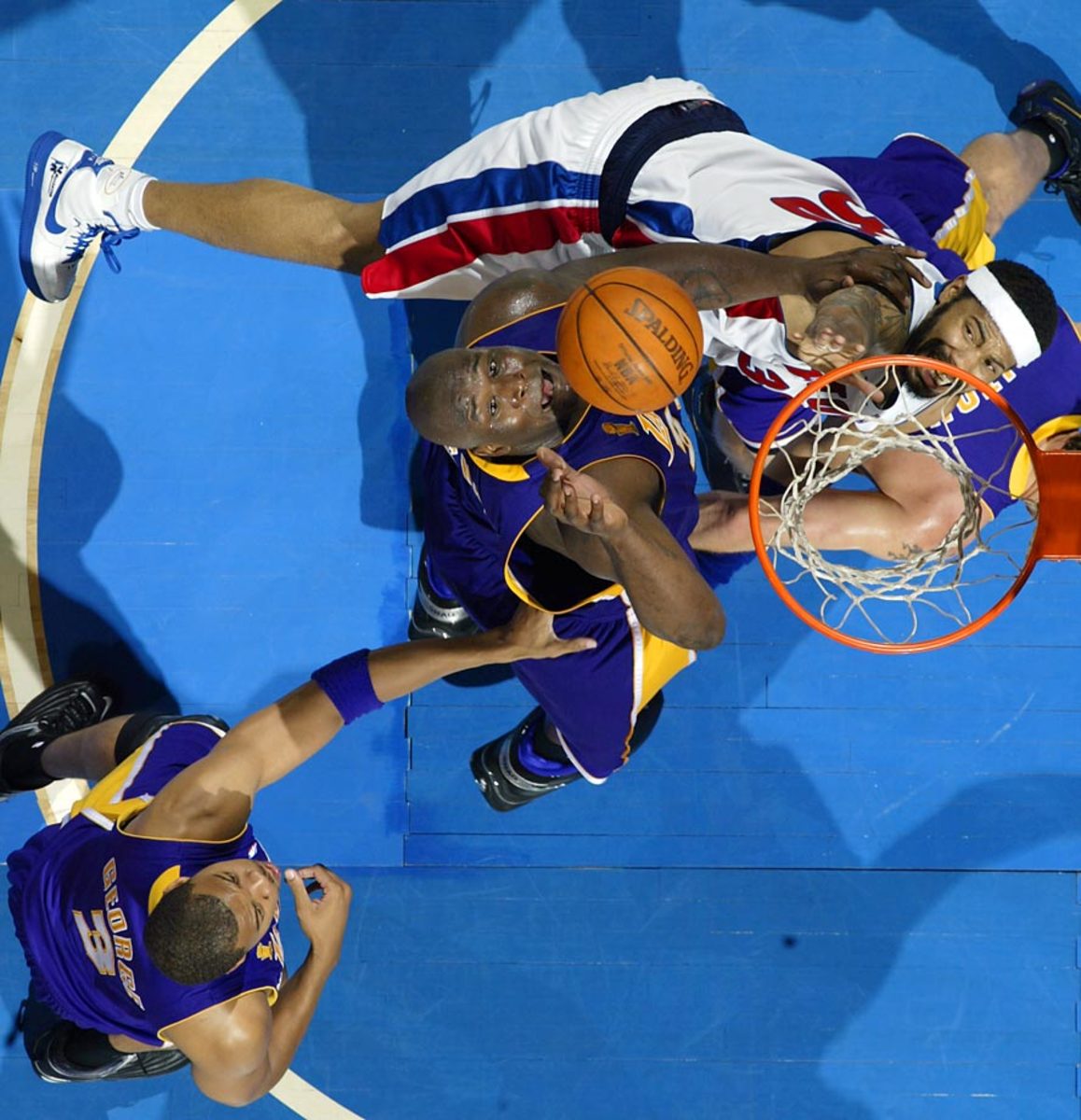
Shaquille O'Neal of the Lakers and Rasheed Wallace of the Pistons grapple for a rebound. Detroit impressively dispatched L.A.'s O'Neal-Kobe Bryant tandem in five games.
2004
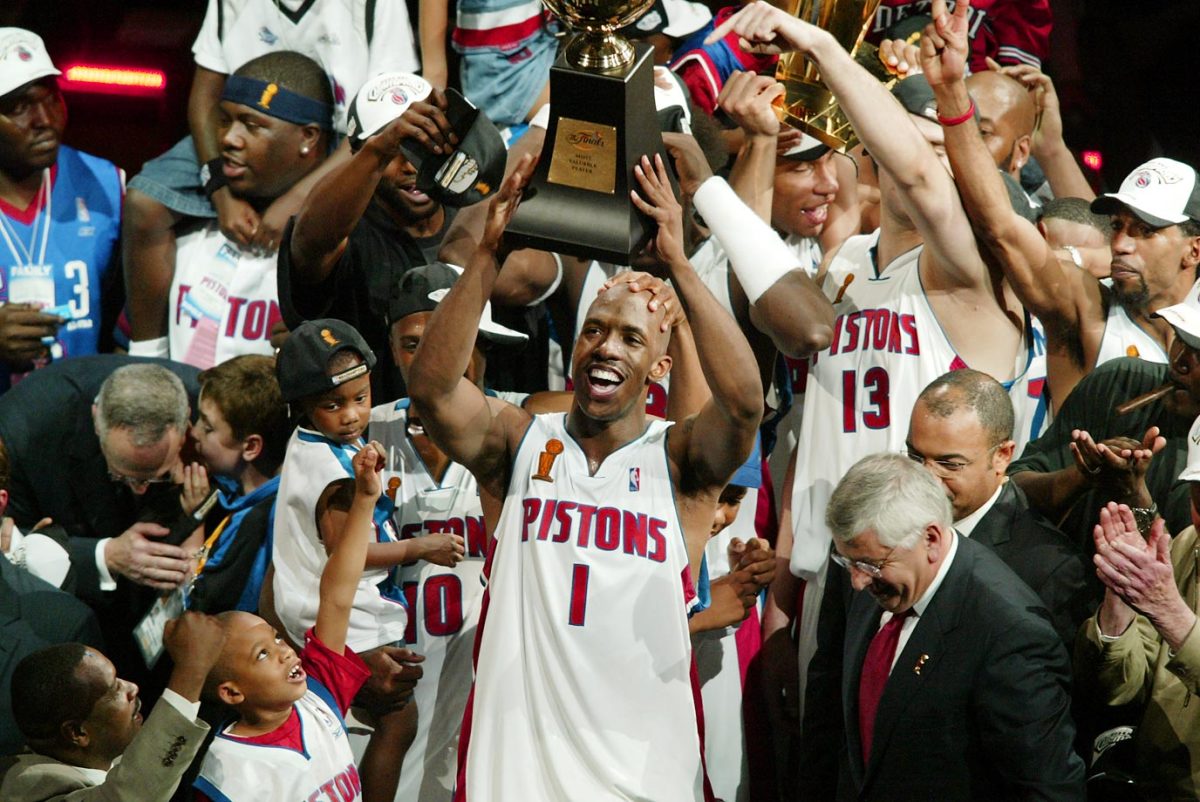
Chauncey Billups hoists the trophy as the Pistons celebrate their championship. With a penchant for making shots in critical moments, Billups was named Finals MVP.
2003
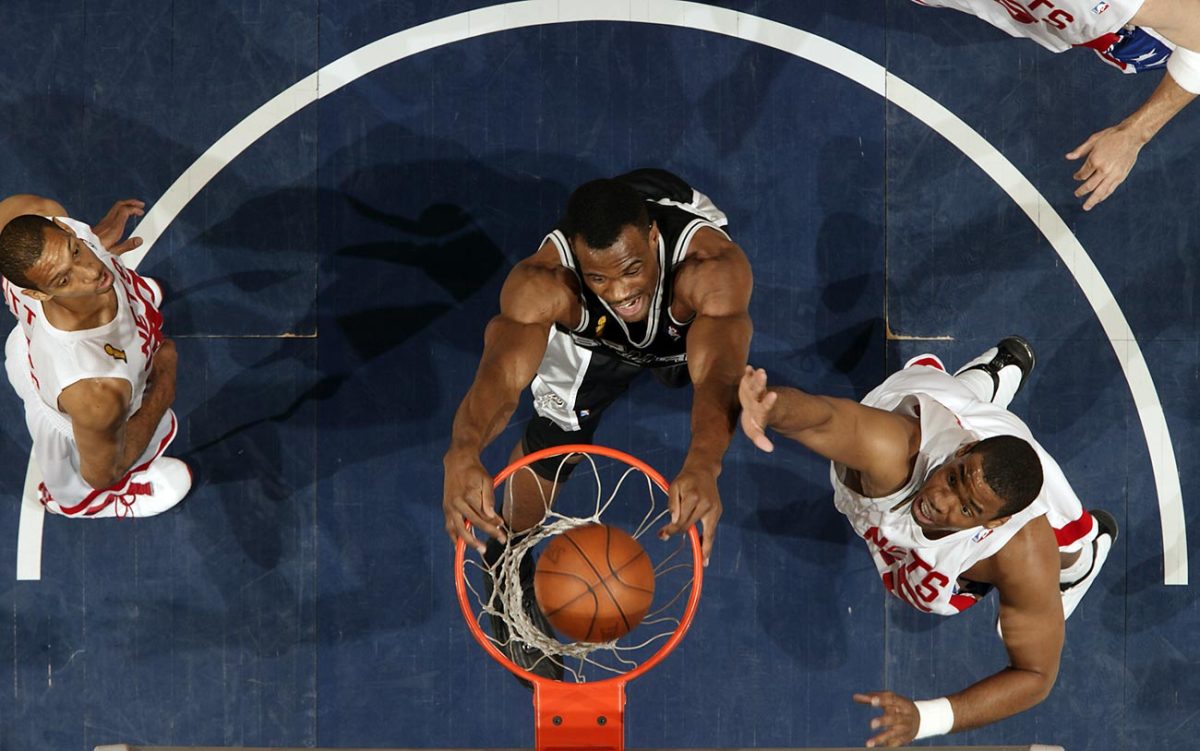
David Robinson of the Spurs dunks on Jason Collins of the Nets in Game 5. San Antonio took the series in six games, with Robinson teaming up with the core of Tim Duncan, Tony Parker and Manu Ginobili winning their first title together.
2003
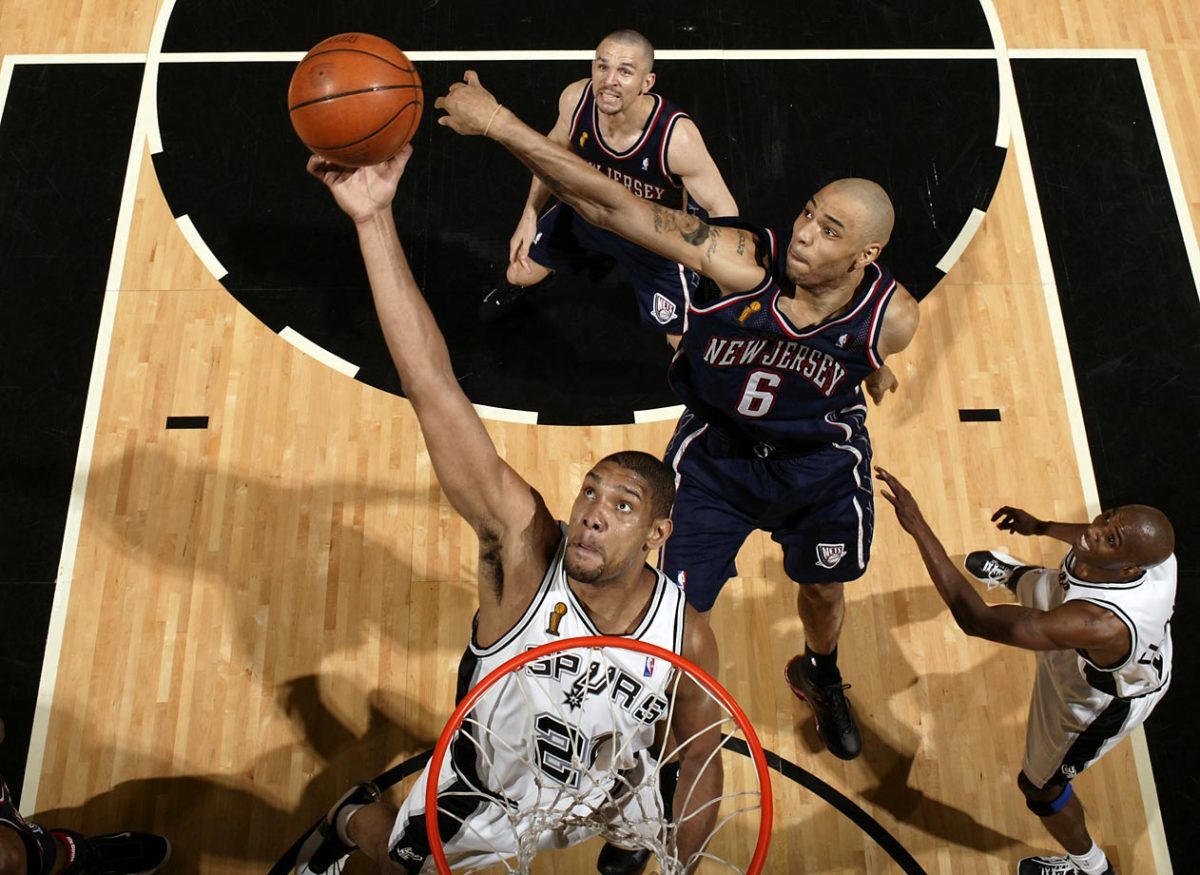
Finals MVP Tim Duncan came up huge for San Antonio in the Game 6 series-clincher with 21 points, 20 boards, 10 assists and eight blocks.
2002
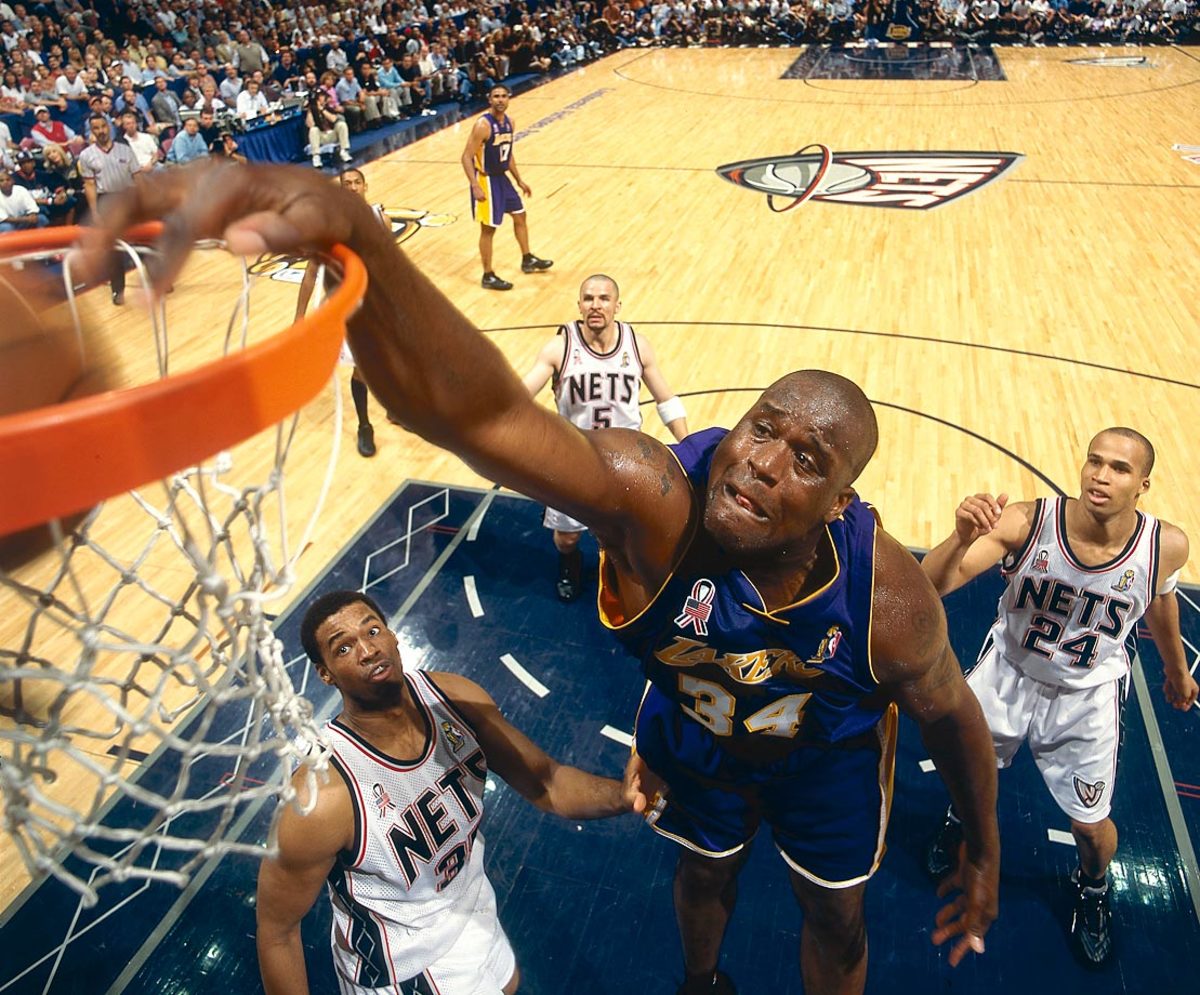
Shaquille O'Neal and the Lakers blew away the Jason Kidd-led Nets in a four-game sweep. O'Neal averaged more than 36 points per game as L.A. took home a third straight title.
2001
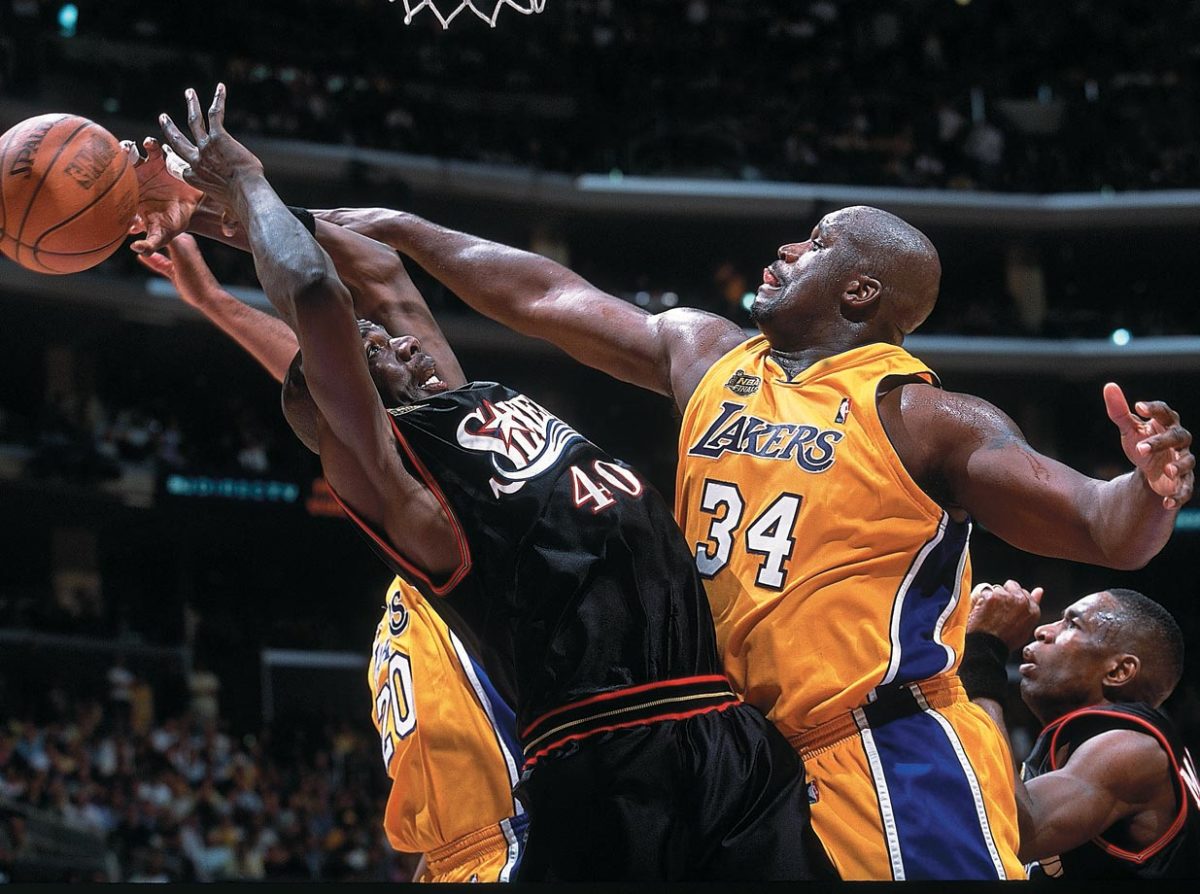
Shaquille O'Neal was simply too much for Philadelphia to handle in the series, winning his second straight Finals MVP honors and contributing a near quadruple-double in Game 2 with 28 points, 20 rebounds, nine assists and eight blocks.
2001
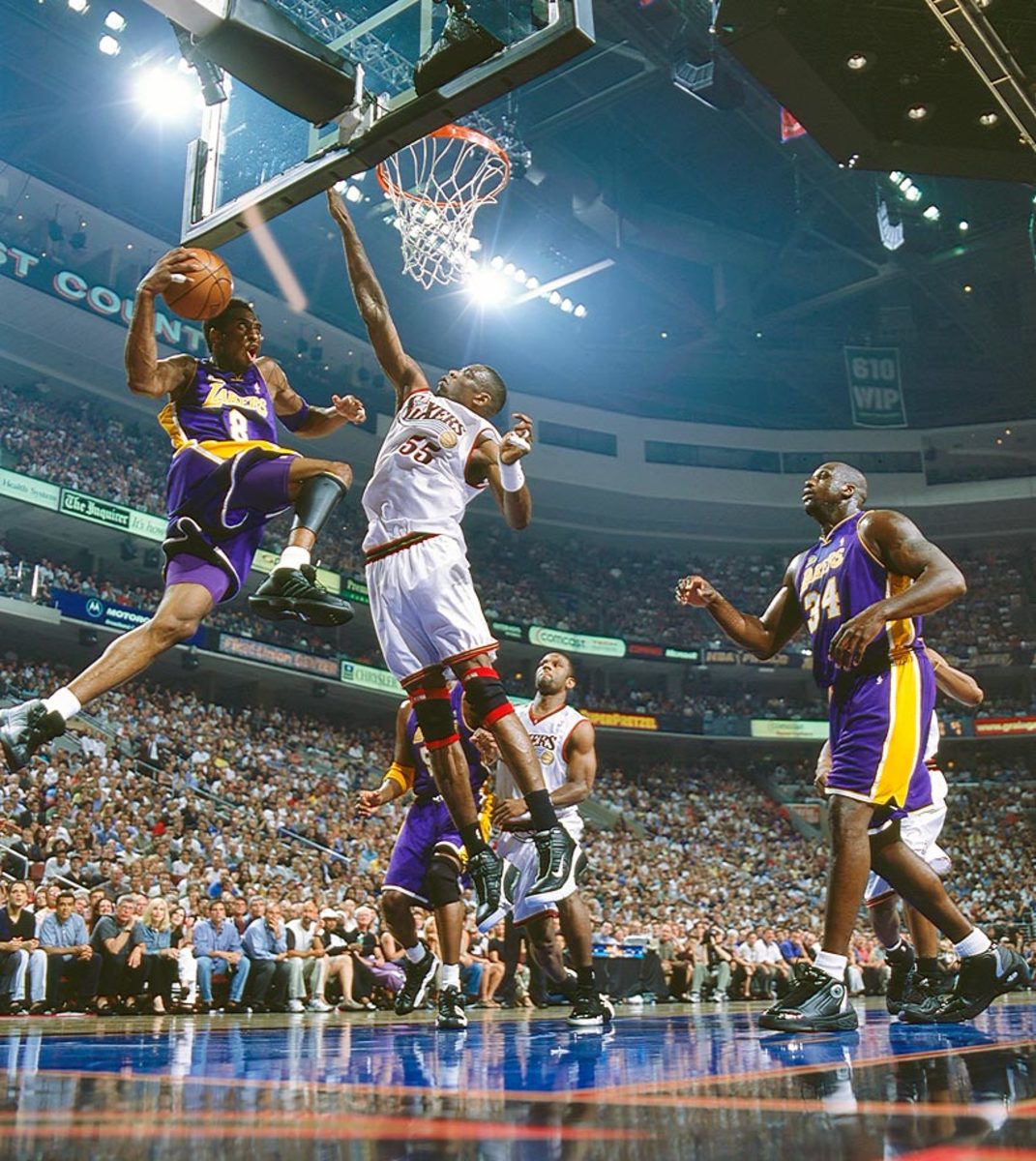
Kobe Bryant of the Lakers avoids 76ers center Dikembe Mutombo in Game 4. Though still overshadowed by Shaquille O'Neal, the 22-year-old Bryant continued to shine in his own right, averaging nearly 25 points for the series.
2001
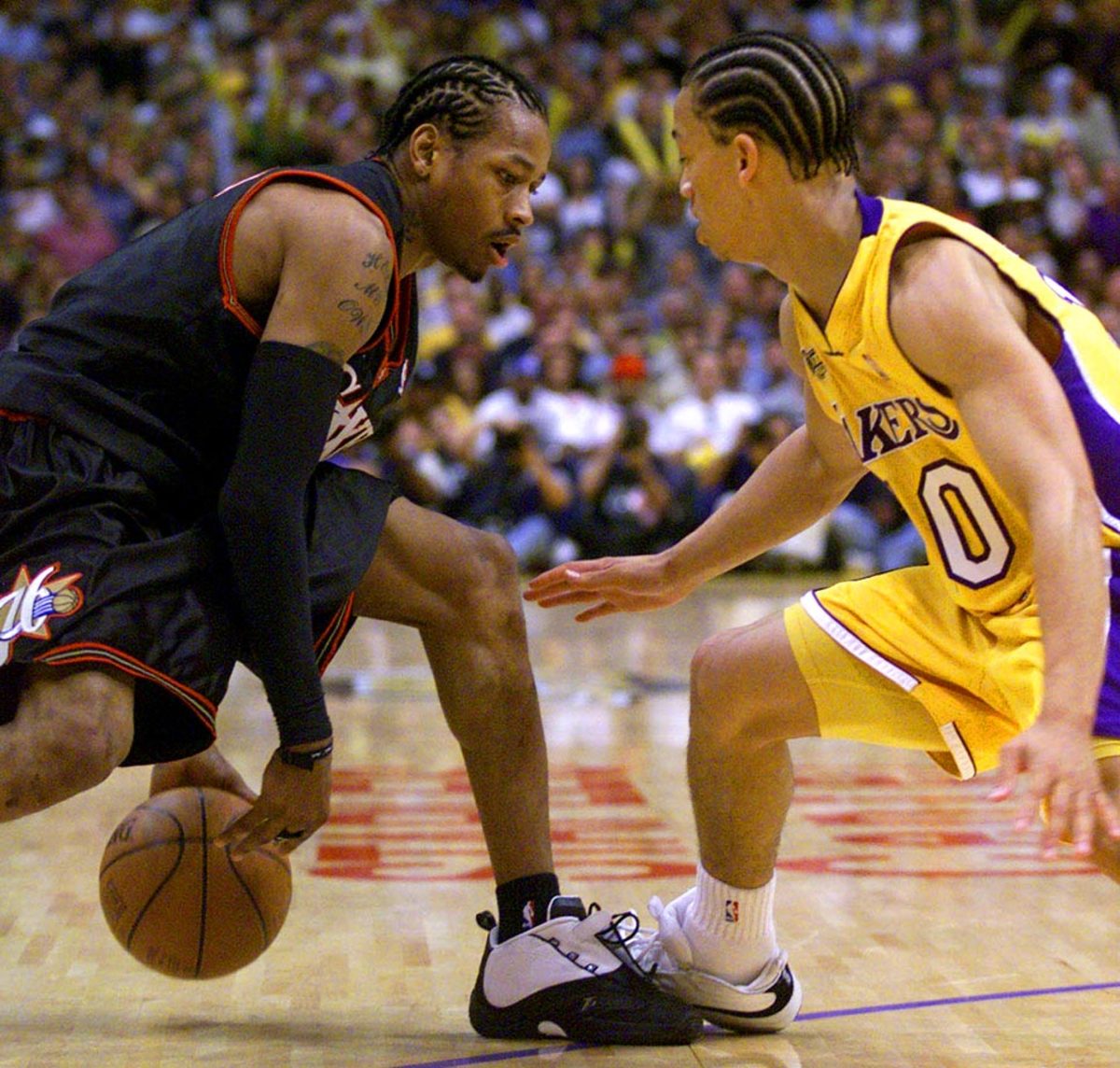
Sixers guard Allen Iverson dribbles the ball against Tyronn Lue of the Lakers during Game 1. Bolstered by the dynamic Iverson's 48 points, Philadelphia pulled off an upset, 107-101.
2000
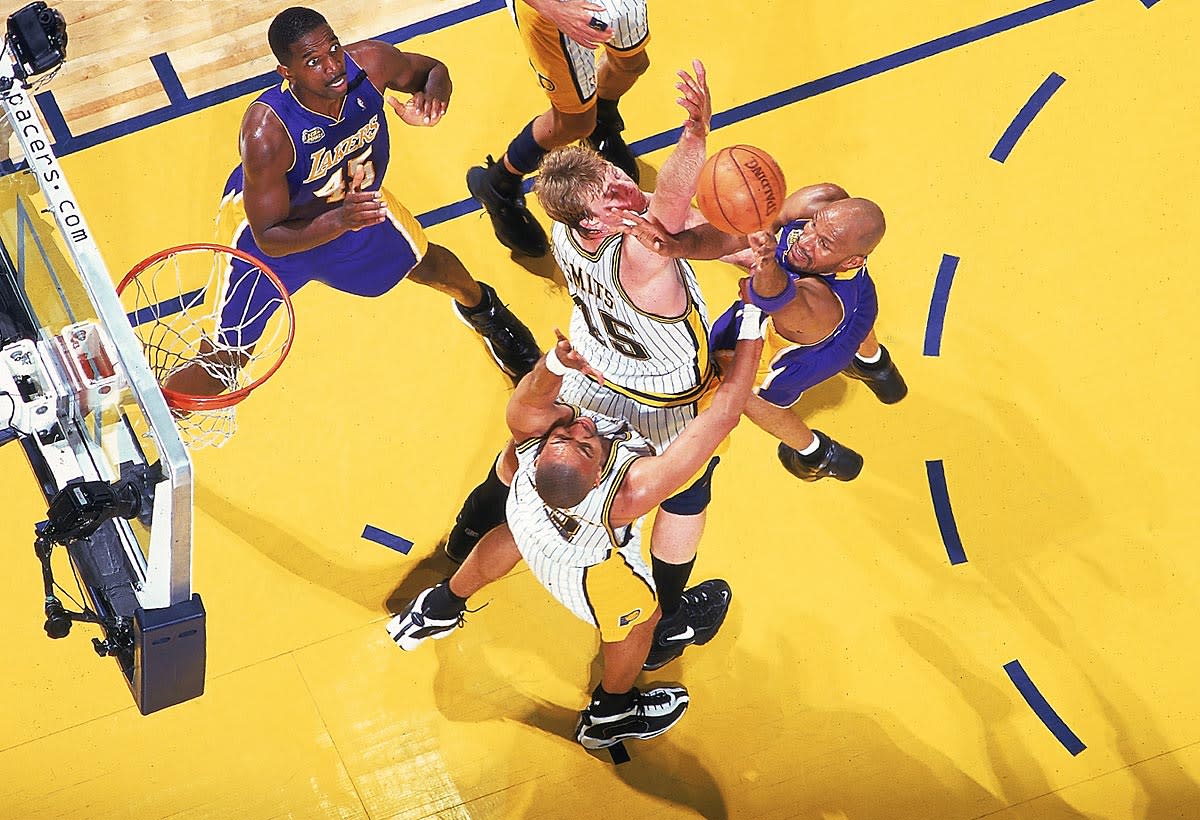
Ron Harper of the Lakers shoots over Pacers center Rik Smits in Game 4.
2000
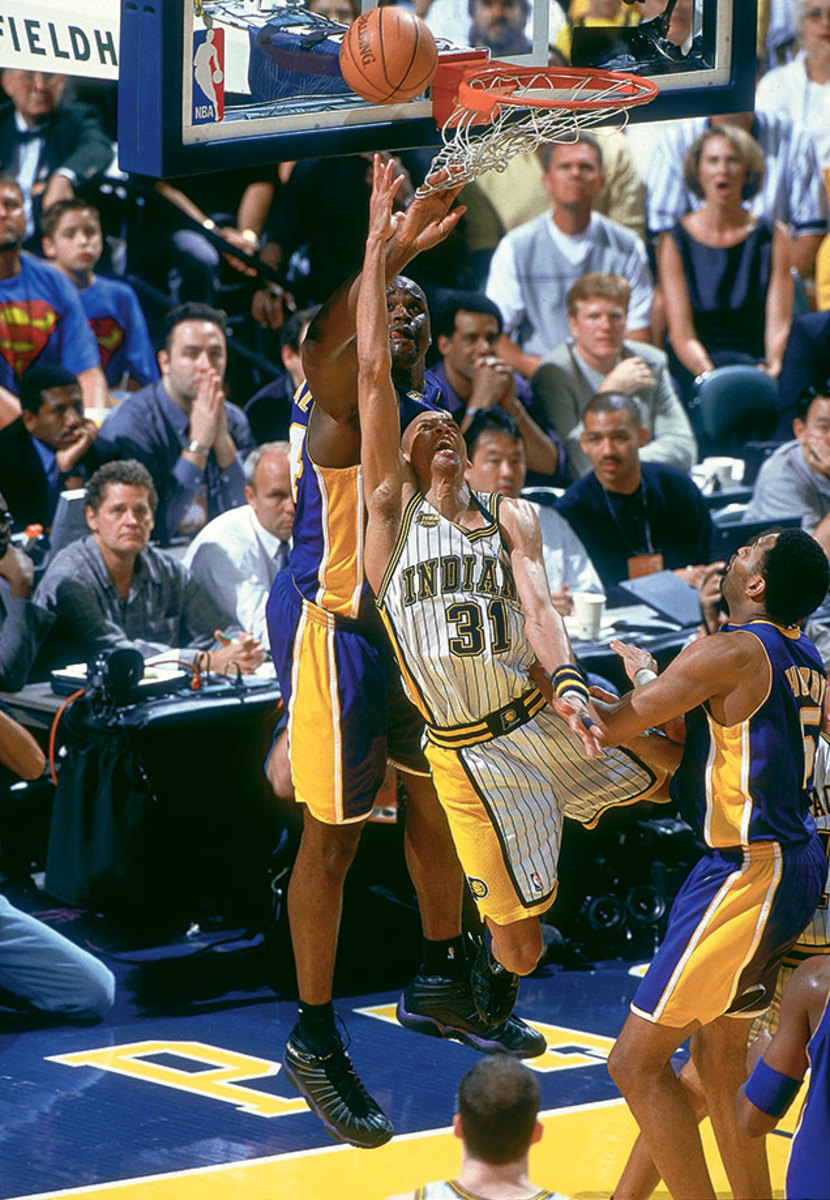
Reggie Miller averaged more than 24 points per game, but couldn't shoot Indiana past Shaq and the Lakers in what would be the only Finals appearance of his career.
2000
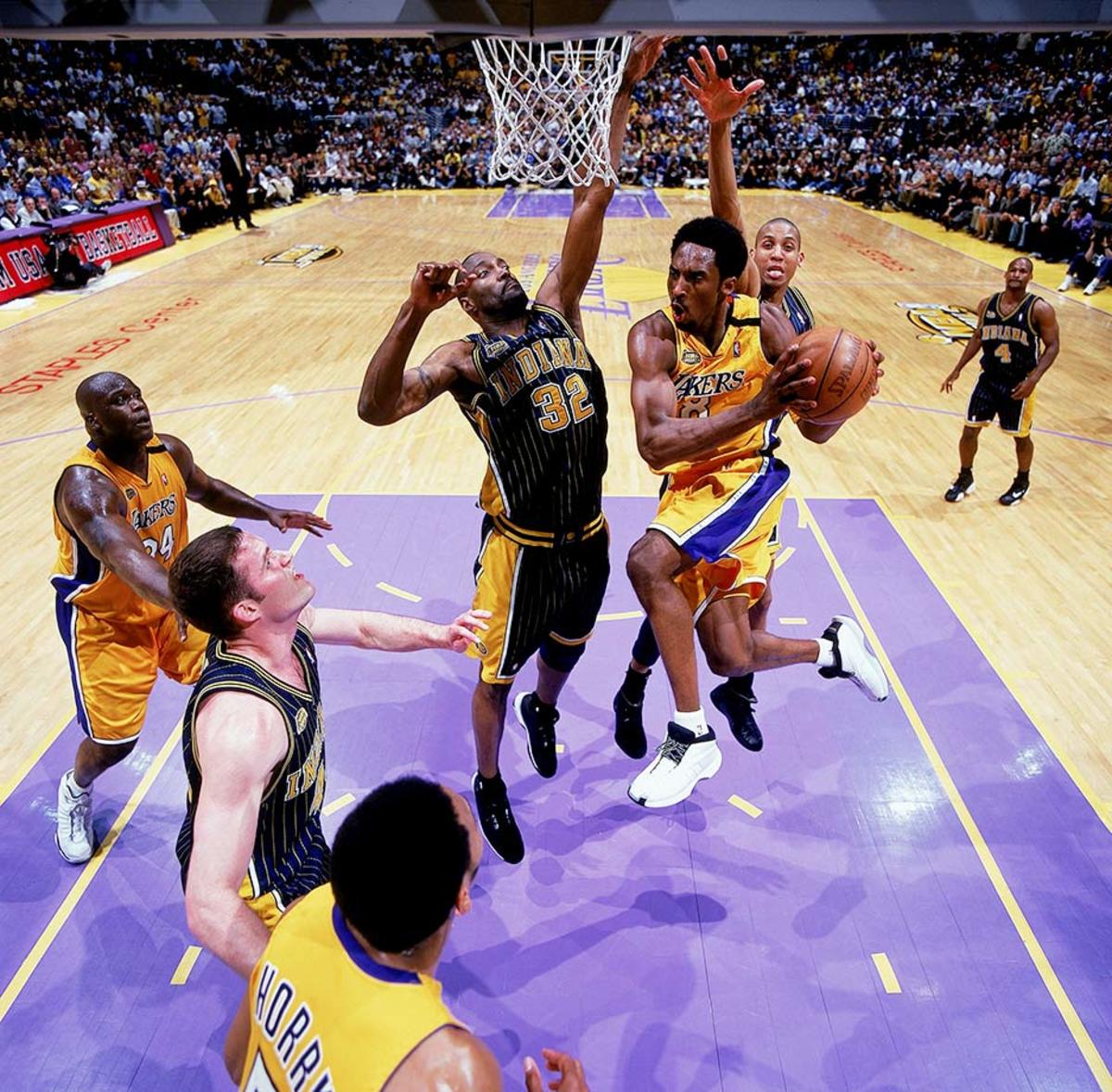
Kobe Bryant drives to the basket against Dale Davis and Reggie Miller in Game 6 between the Lakers and Pacers.
2000
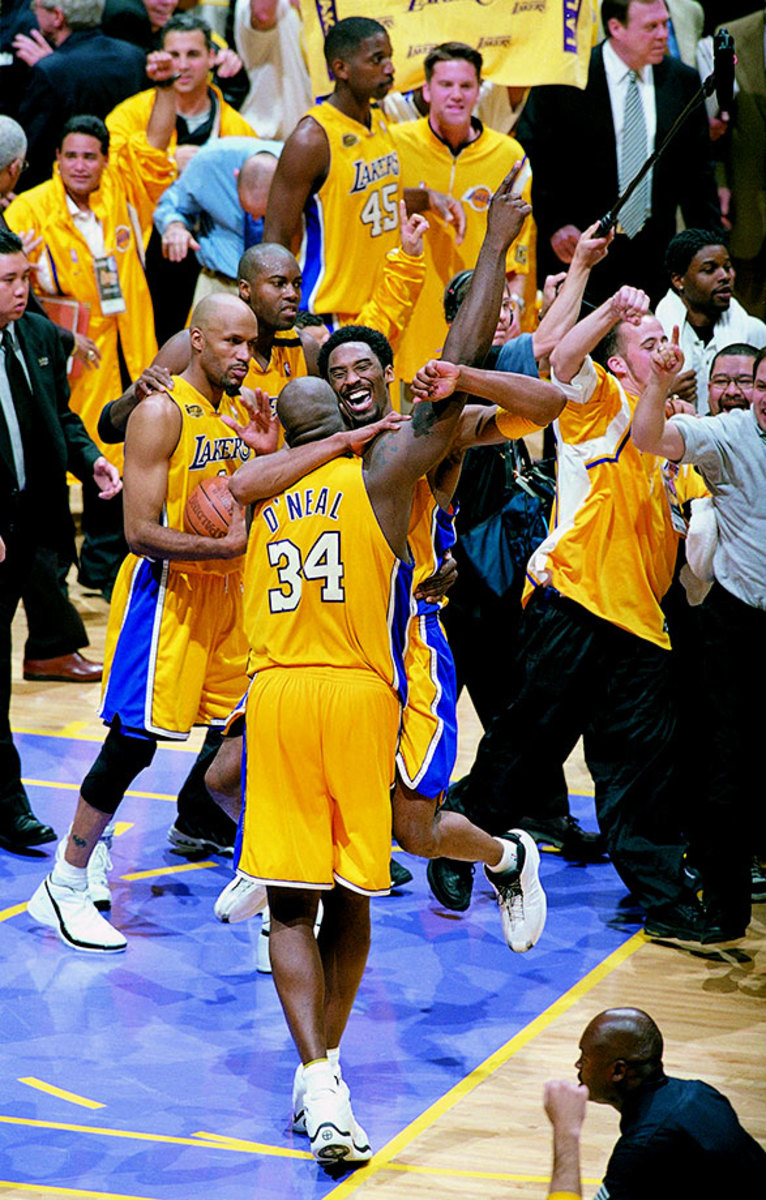
Shaq and Kobe celebrate after winning Game 6 against the Pacers for the championship.
1999
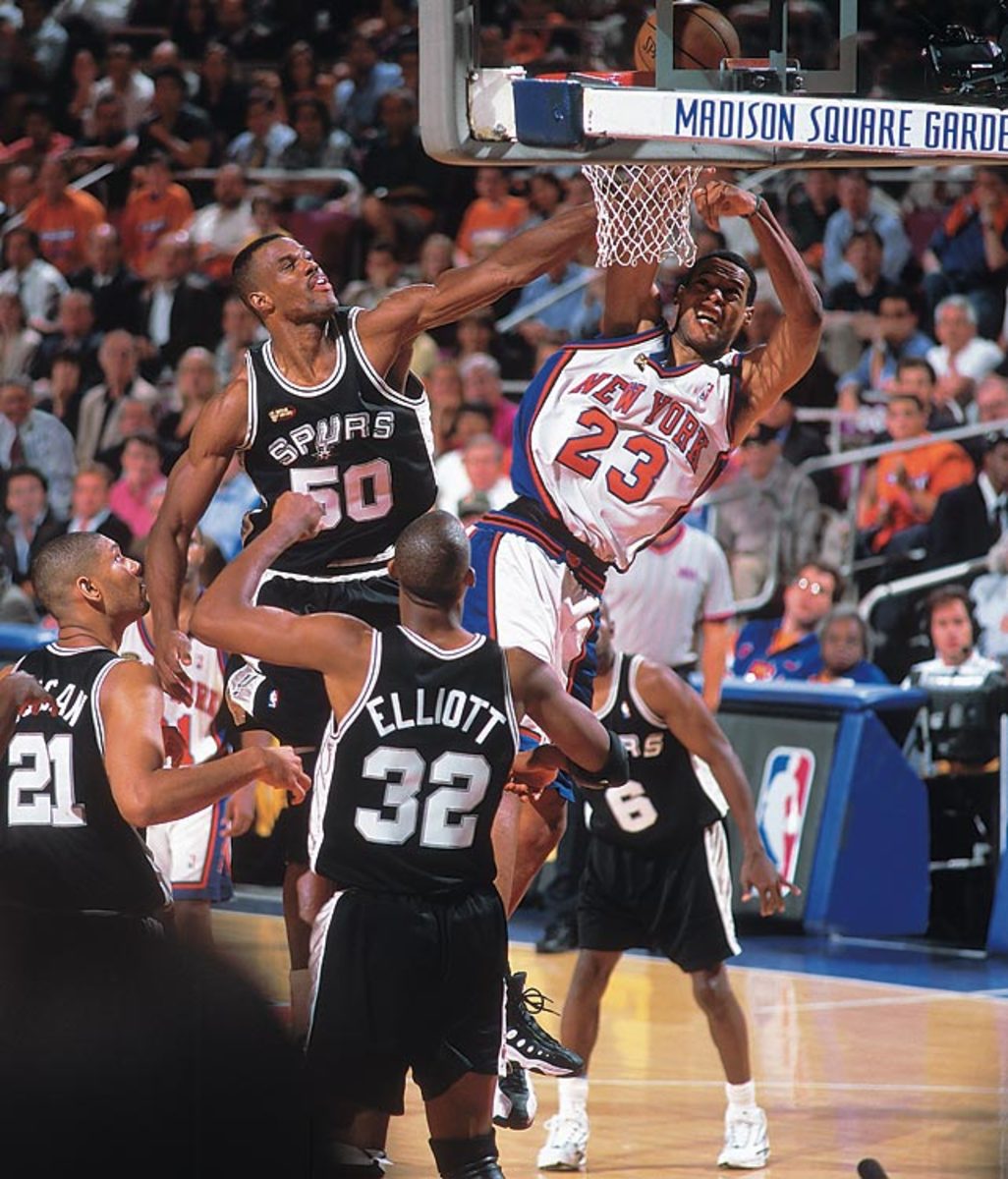
Spurs center David Robinson blocks Marcus Camby of the Knicks in Game 4. San Antonio, led by Robinson and a young Tim Duncan, took up the mantle post-Jordan and defeated the Knicks in five games for its first title.
1999
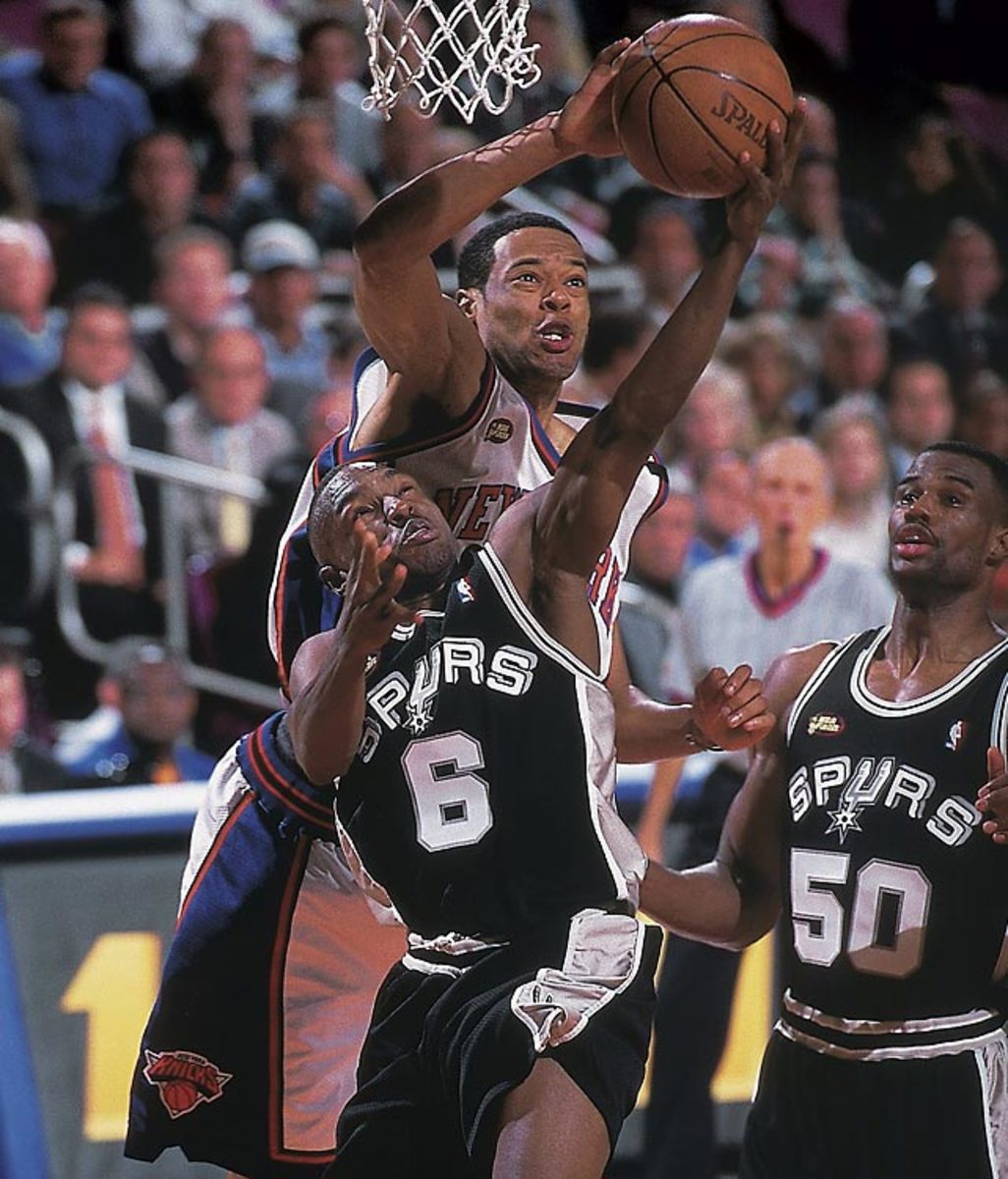
Marcus Camby of the Knicks blocks Spurs guard Avery Johnson in Game 3. Johnson would have the last laugh, hitting a last-minute shot to close out New York in Game 5.
1998
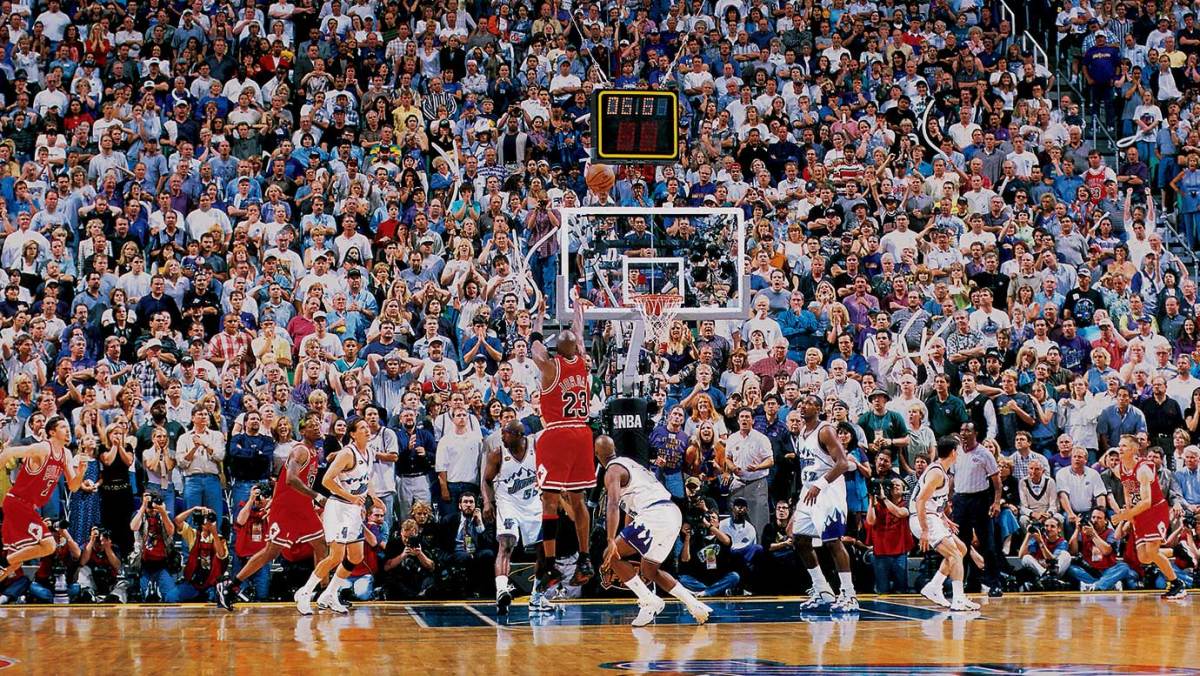
Michael Jordan drains the game-winning jumper over Bryon Russell of the Utah Jazz in Game 6. It would be MJ's last shot as a Bull, but not his last in the NBA — he unretired, of course, in 2001.
1997
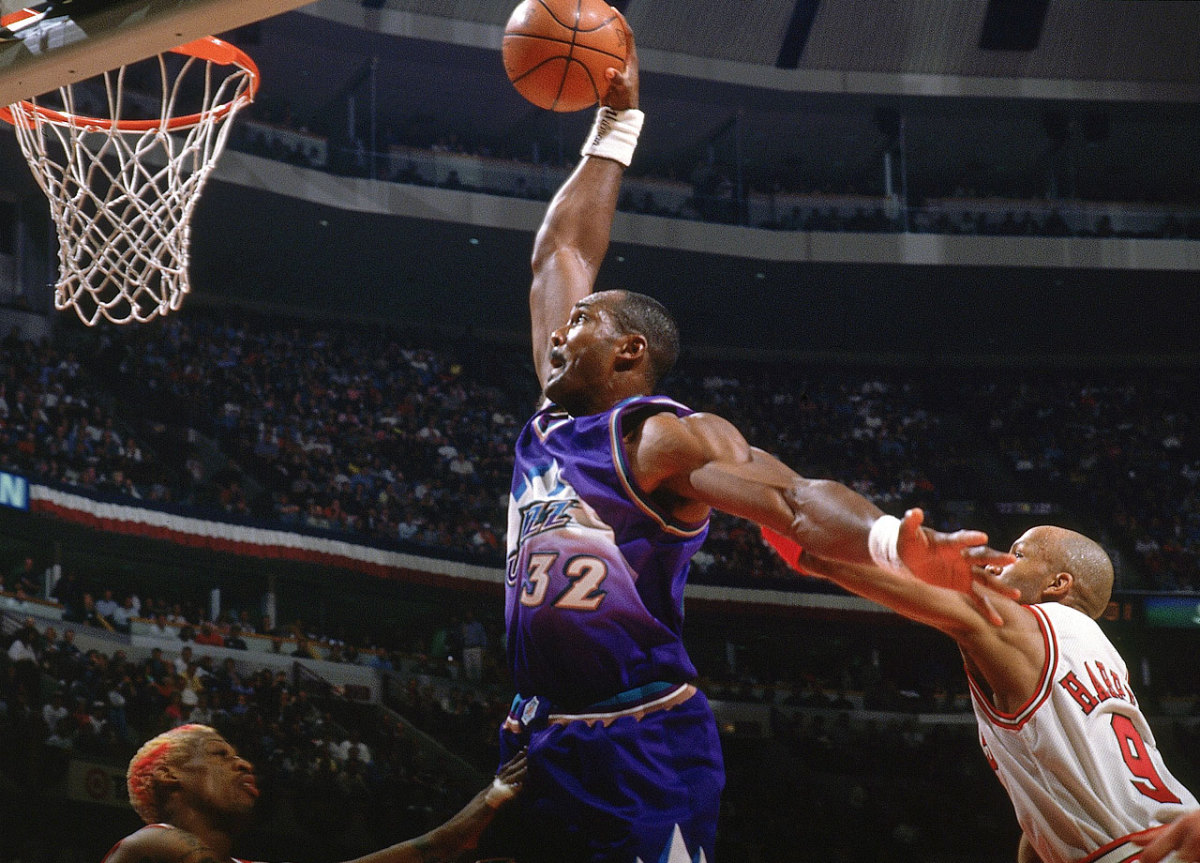
Karl Malone of the Jazz dunks over Dennis Rodman and Ron Harper of the Bulls in Game 1. Malone and point guard John Stockton posed a challenge to the Bulls with their efficiency, but Michael Jordan and company found ways to win yet again.
1997
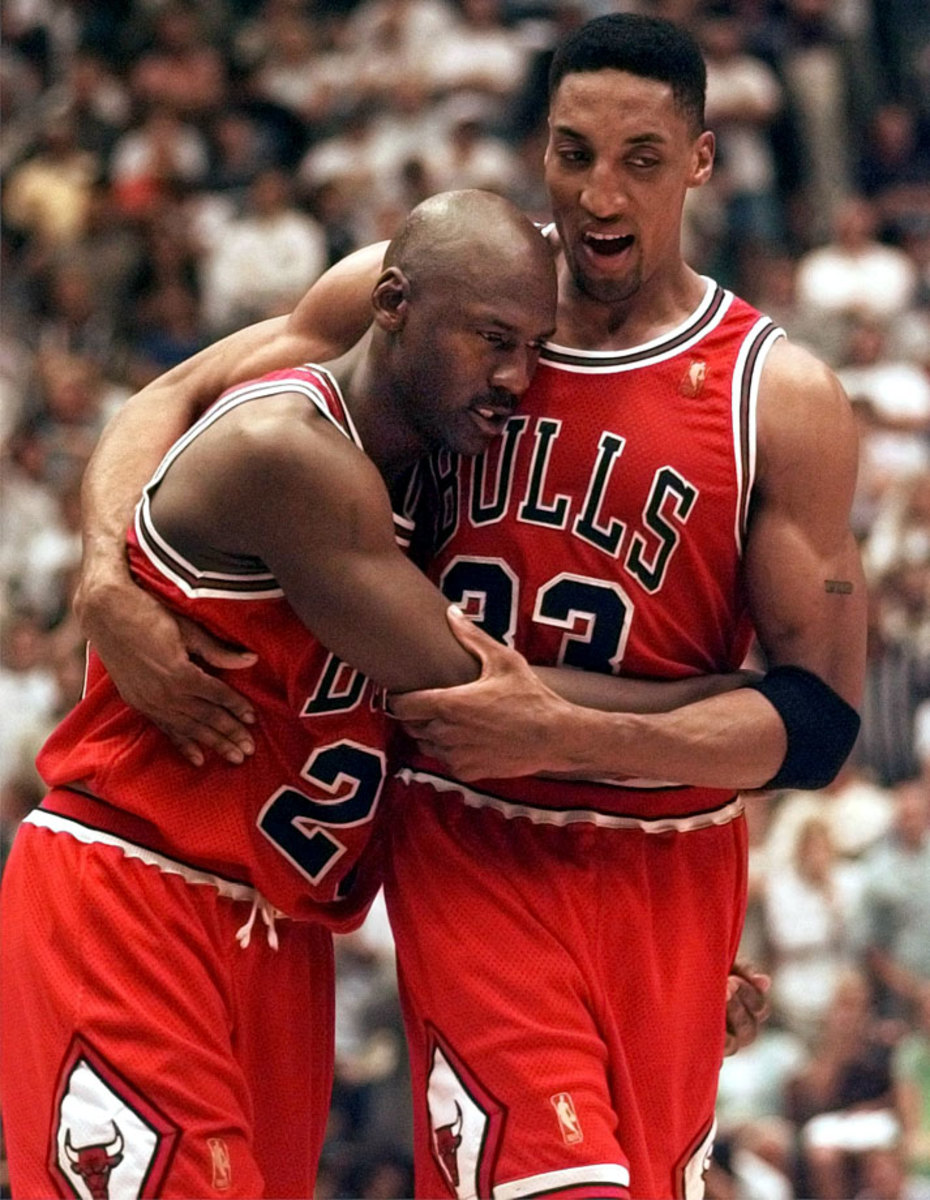
Game 5, which came to be known as "The Flu Game," saw Michael Jordan compete through severe illness to come up big for Chicago. Jordan brought the Bulls back from a 16-point deficit, improbably scoring 38 points in a 90-88 win after spending much of the past 24 hours confined to his hotel bed. At the end of the game, Jordan collapsed into Scottie Pippen's arms in what became an iconic moment.
1997
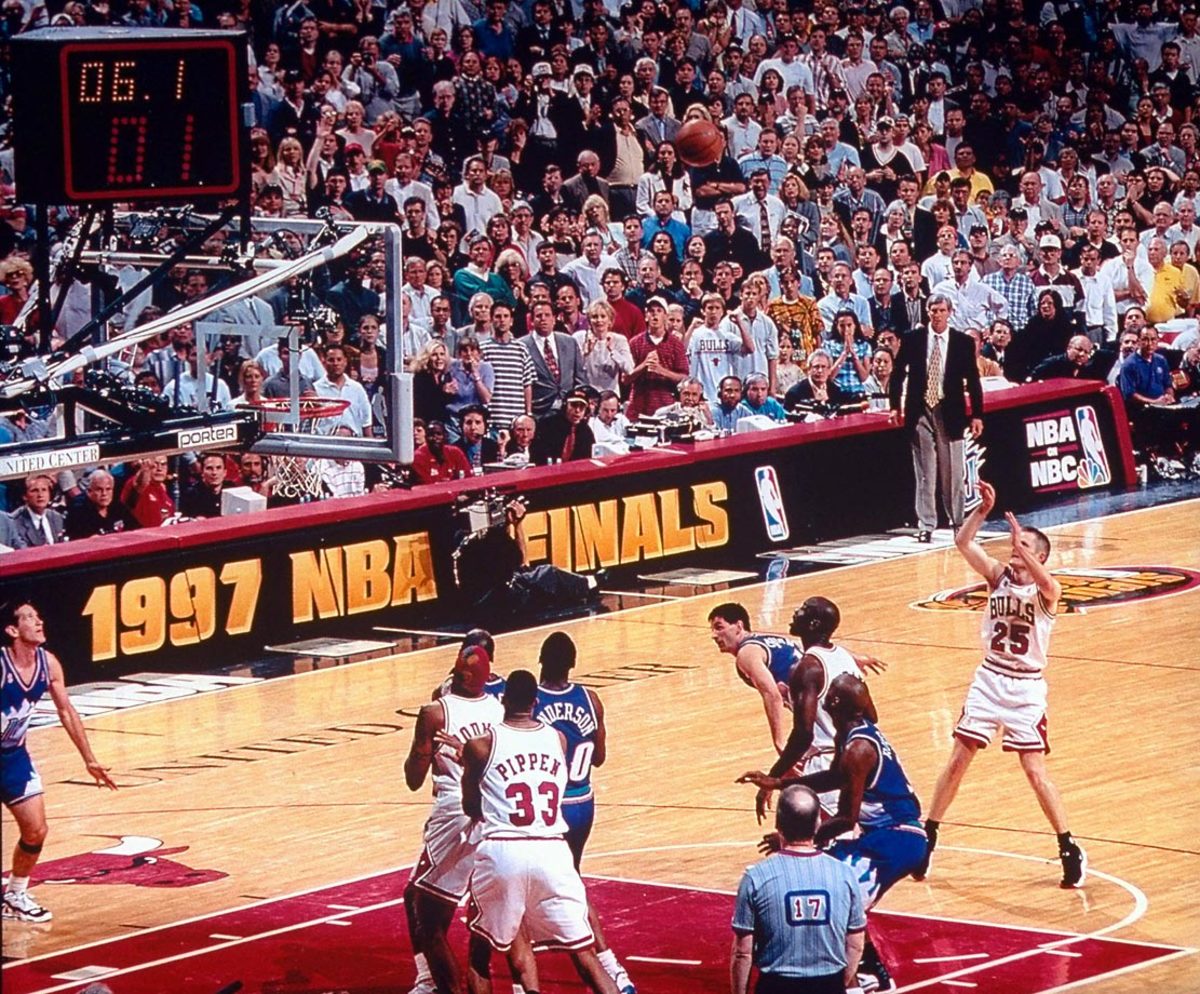
In Game 6, it wasn't Jordan or Pippen (though they combined for 62 points) but rather Bulls guard Steve Kerr who sealed Chicago's fifth title, with a 17-footer.
1996
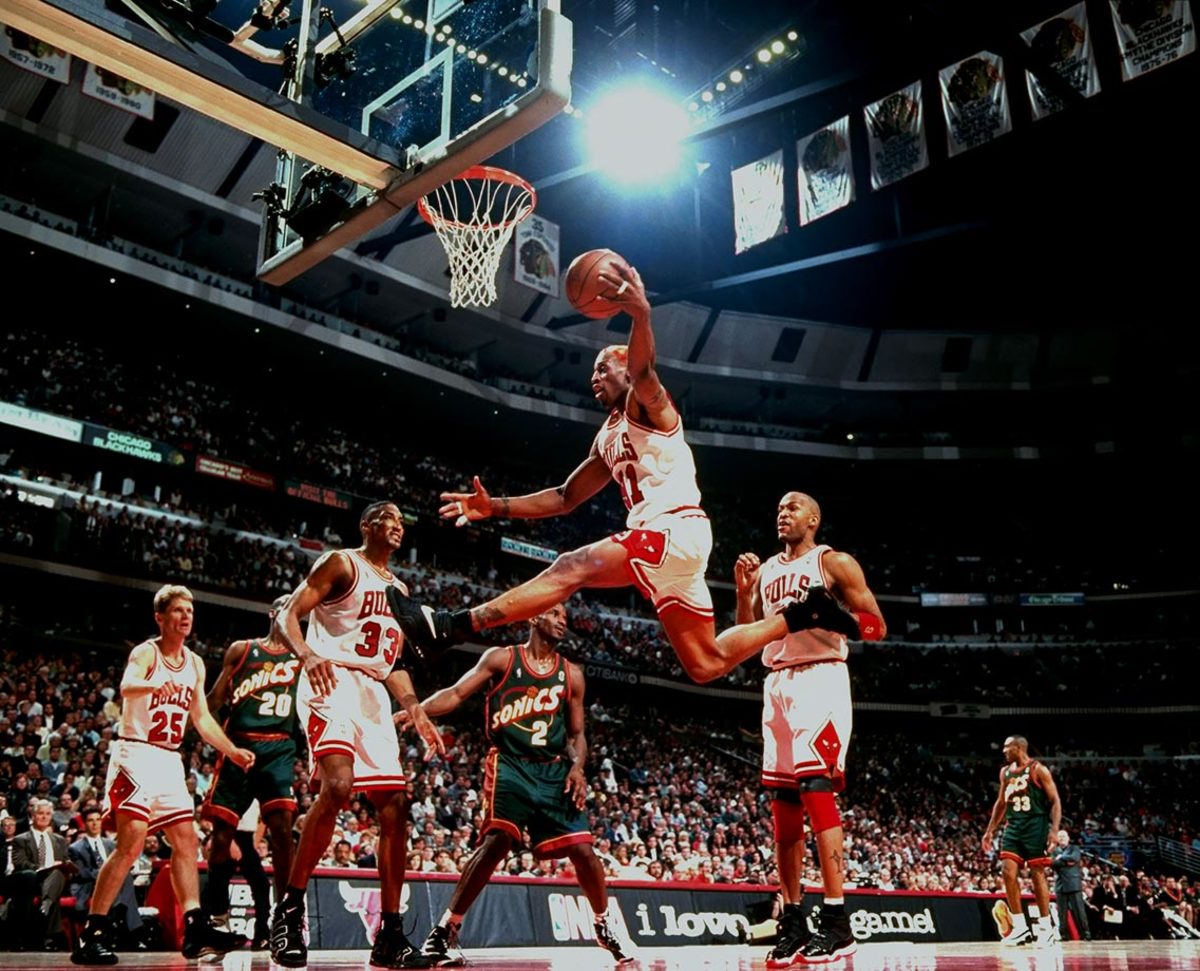
Dennis Rodman grabs a rebound against the Sonics in Game 1. Rodman averaged nearly 14 boards per game in the playoffs for the Bulls, who acquired the power forward from San Antonio before the season.
1996
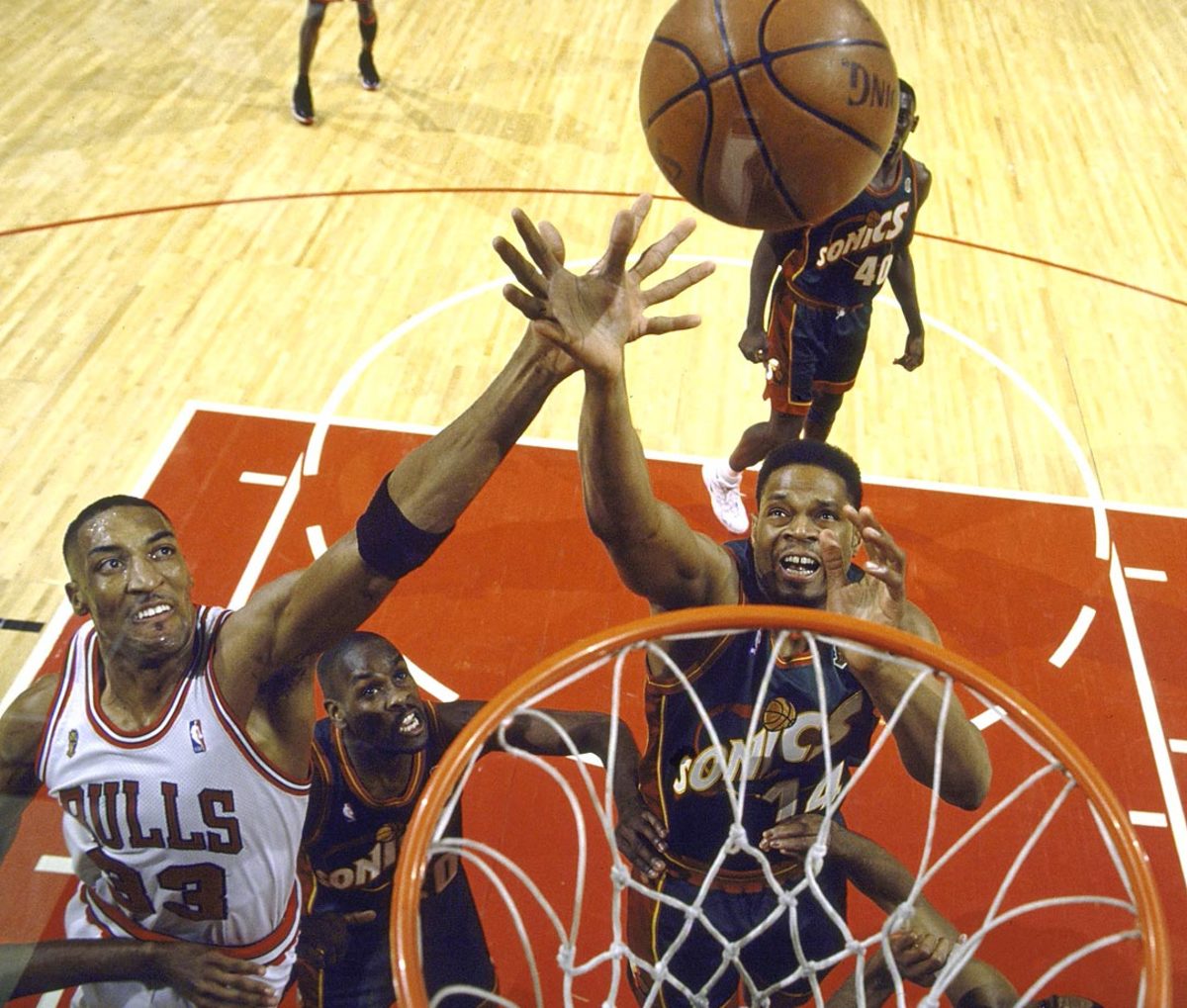
Scottie Pippen of the Bulls and Sam Perkins of the Sonics battle for a rebound. Pippen led Chicago in assists on the series, and the Bulls took their fourth championship, emboldened by Jordan's return from a two-year retirement.
1995
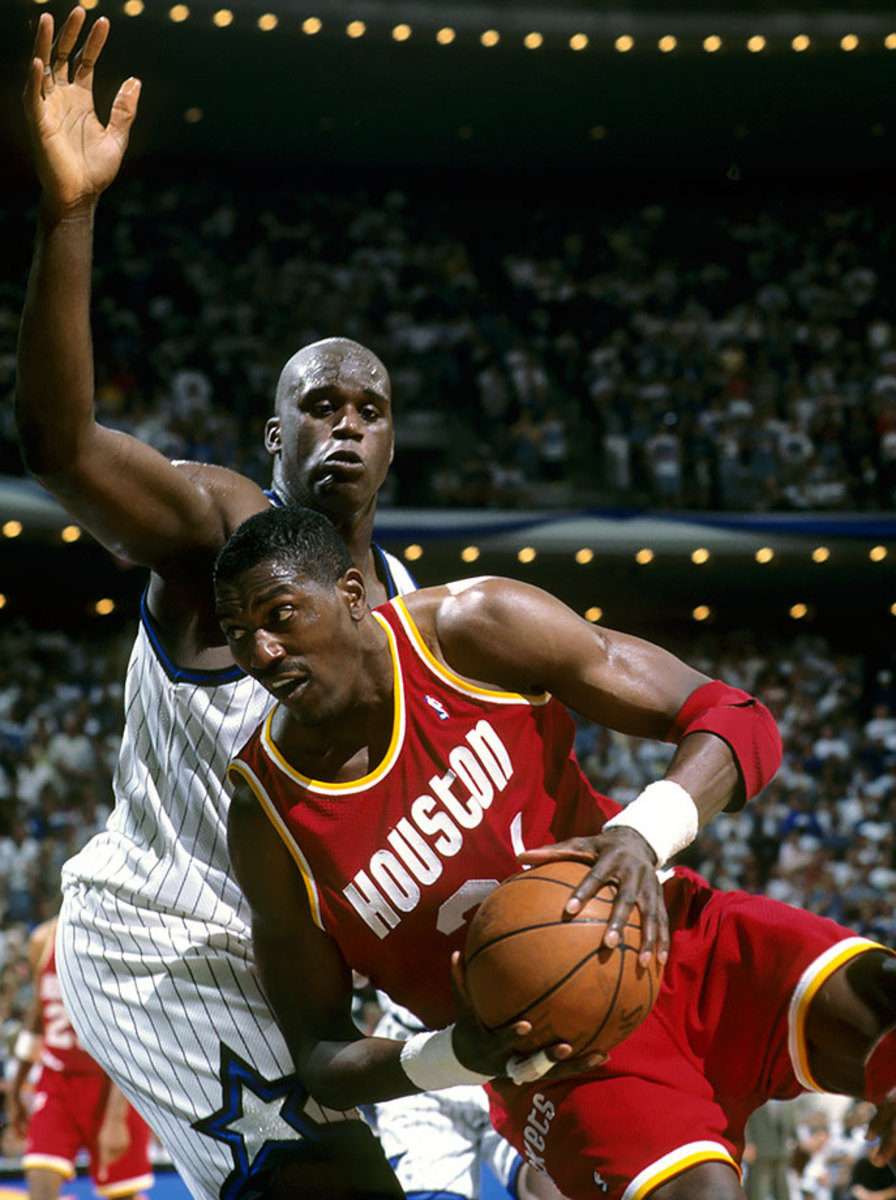
Hakeem Olajuwon averaged nearly 33 points on the series to bolster the Rockets to a second straight title in a four-game sweep.
1995
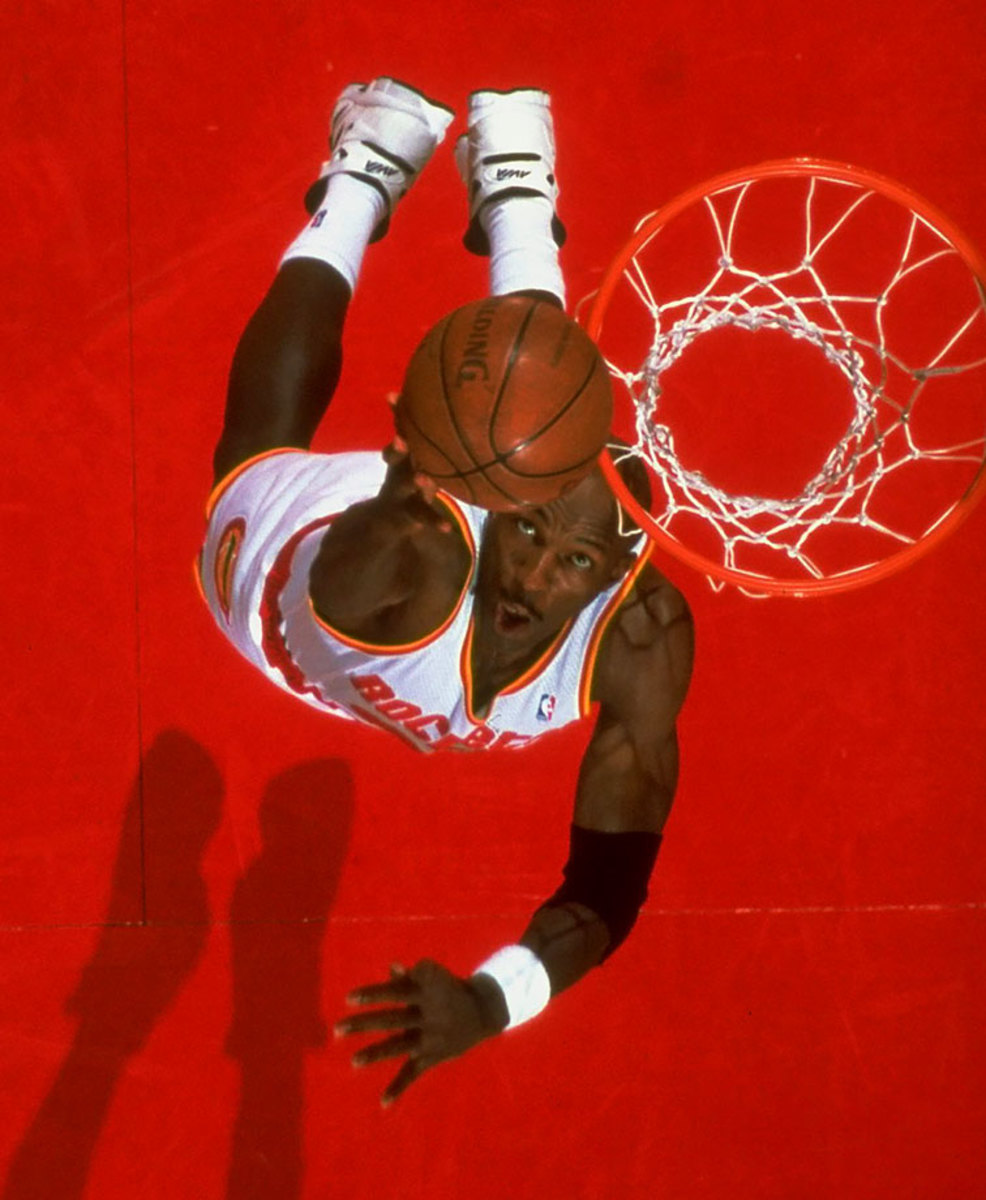
Clyde Drexler scored 25 points in a Game 3 win that all but sealed the series.
1994
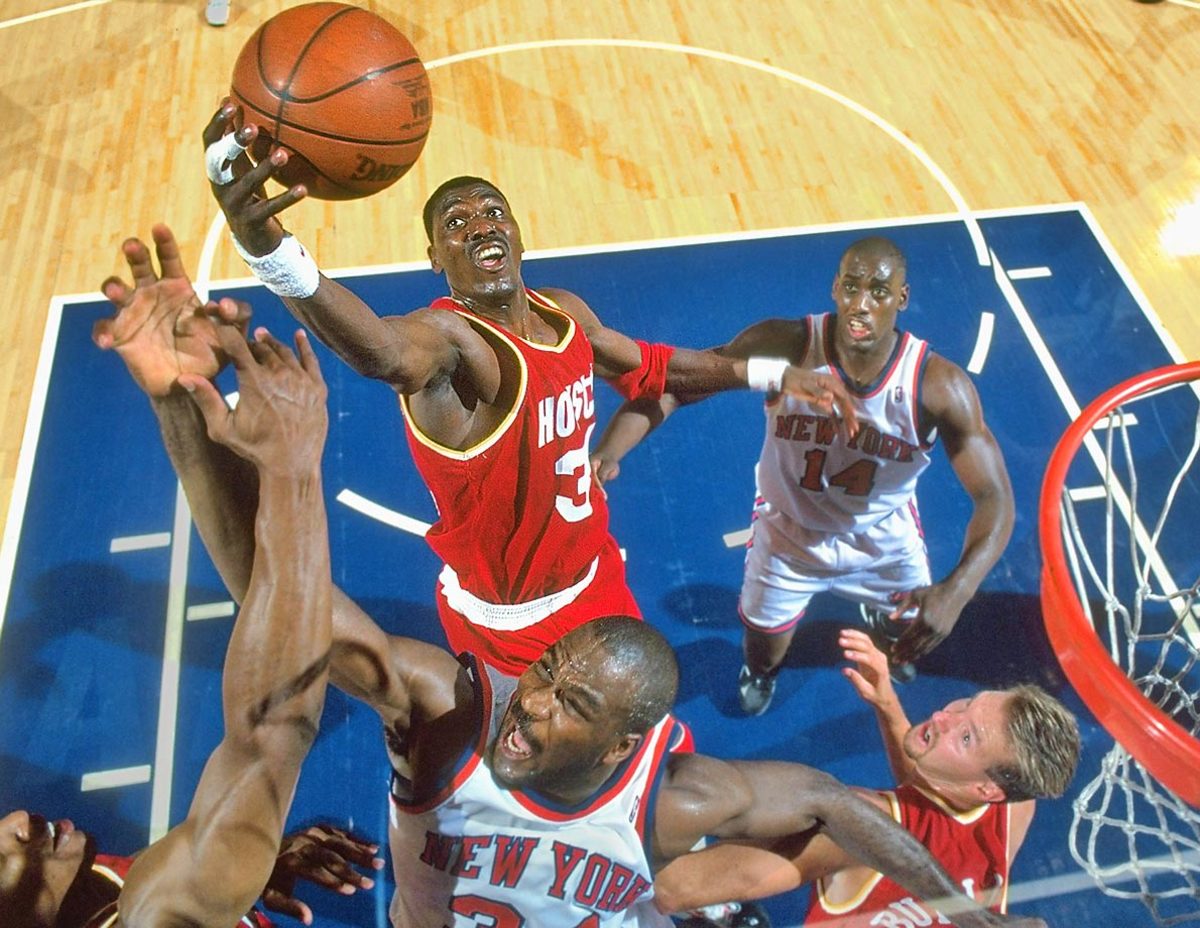
Hakeem Olajuwon was named Finals MVP, averaging nearly 33 points for the series to bolster the Rockets to their first title, in a four-game sweep.
1994
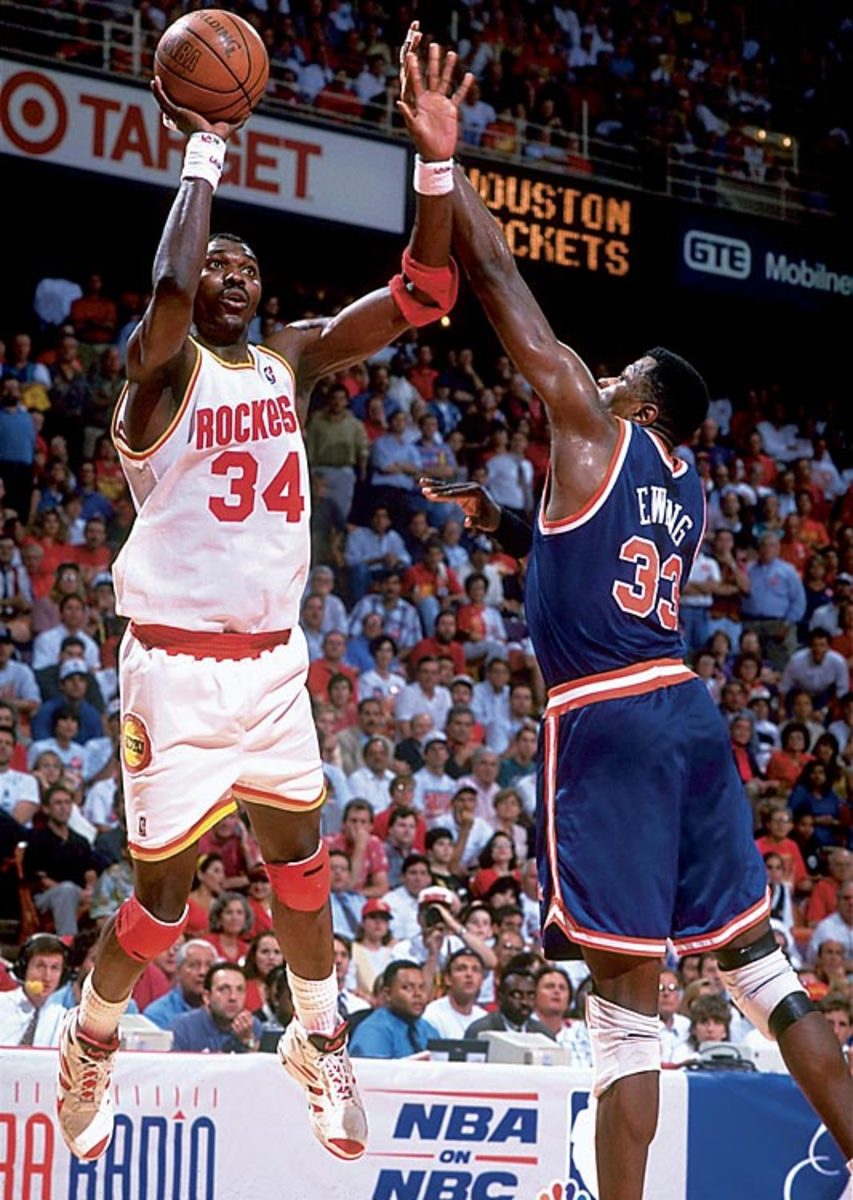
Star centers Hakeem Olajuwon of the Rockets and Patrick Ewing of the Knicks duked it out in 1994 in a series that went seven games.
1994
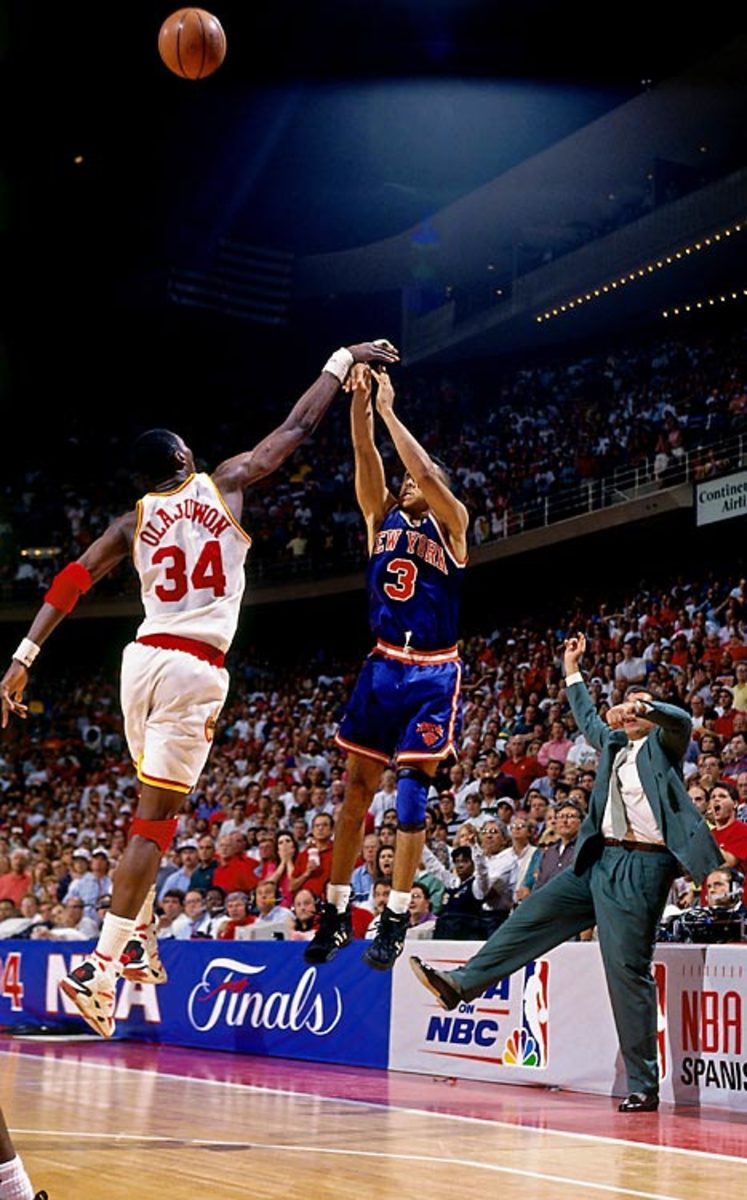
In Game 6, Olajuwon blocked a potential game-winning three by Knicks guard John Starks to secure the win and send the series to a final game.
1993
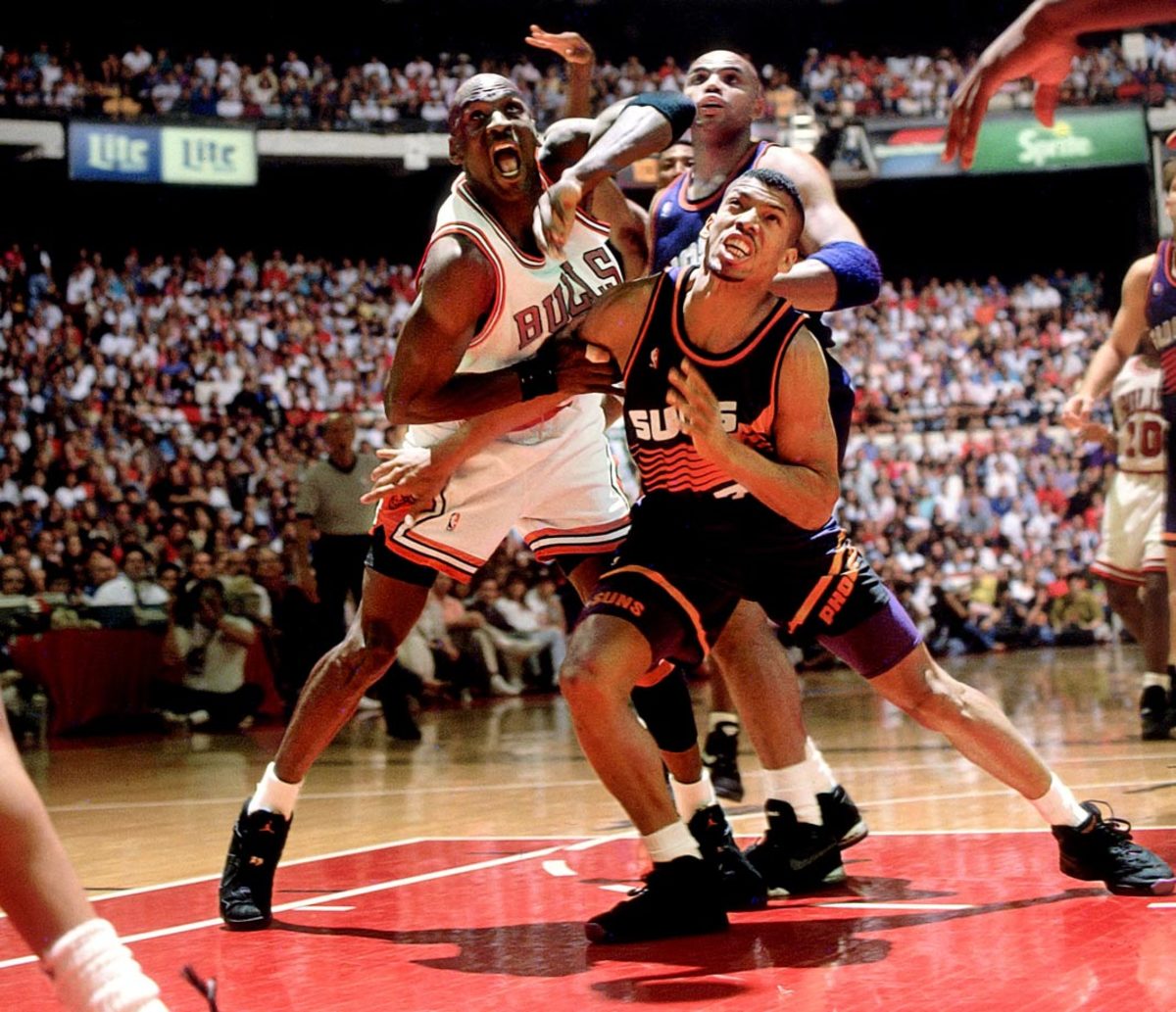
Michael Jordan battles Suns guard Kevin Johnson beneath the hoop.
1993
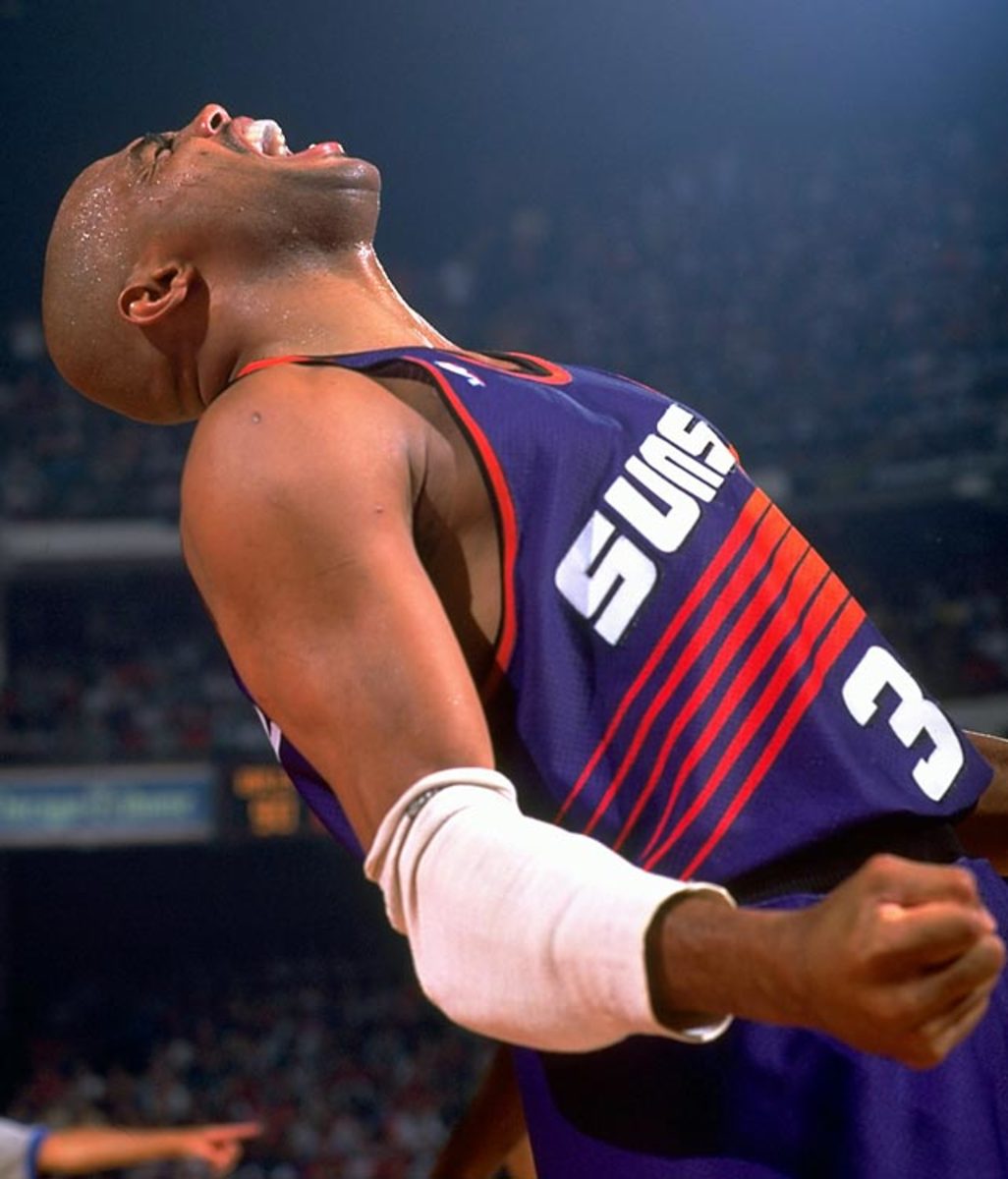
Suns star Charles Barkley celebrates Phoenix's Game 5 win. Though "Sir Charles" averaged 27.3 points and 13 rebounds, it wasn't enough to lift the Suns past Chicago. Years later, he would admit the series made him realize Jordan was the superior player.
1993
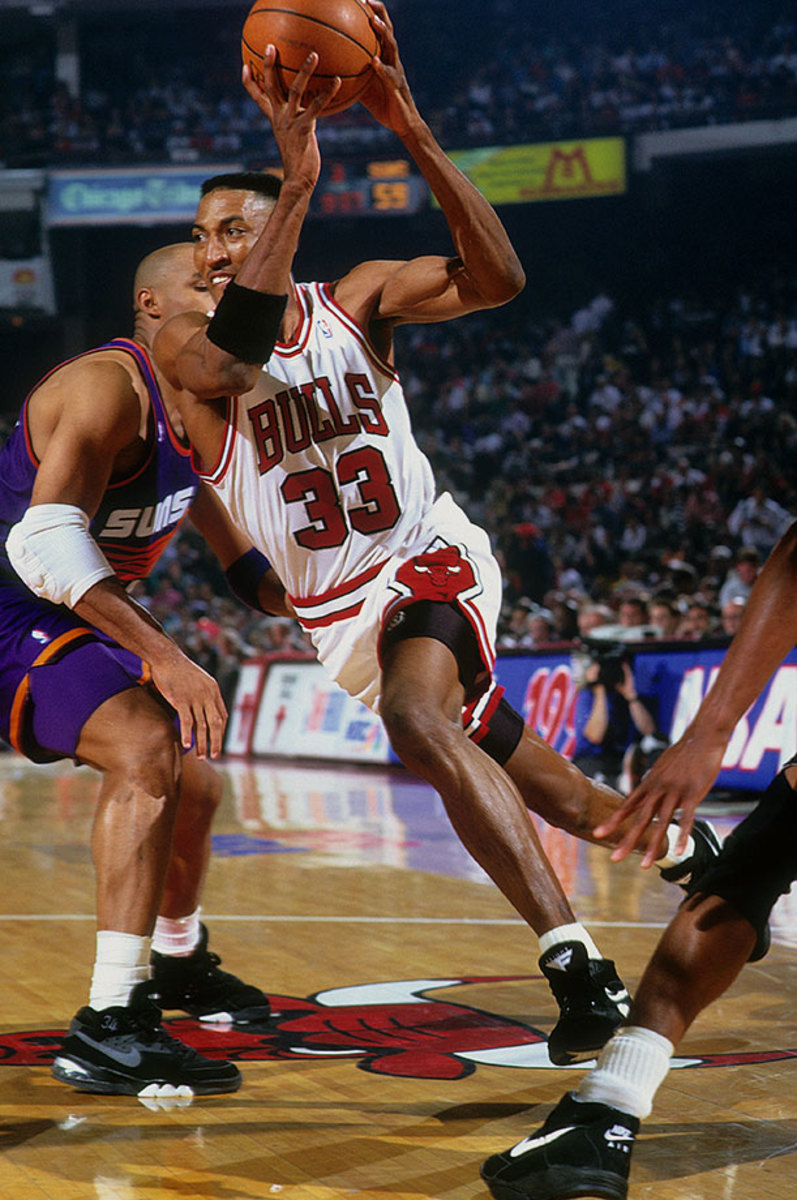
Scottie Pippen of the Bulls drives to the basket against the Suns. Pippen averaged 21.2 points, 9.2 rebounds and 7.7 assists in the series.
1992
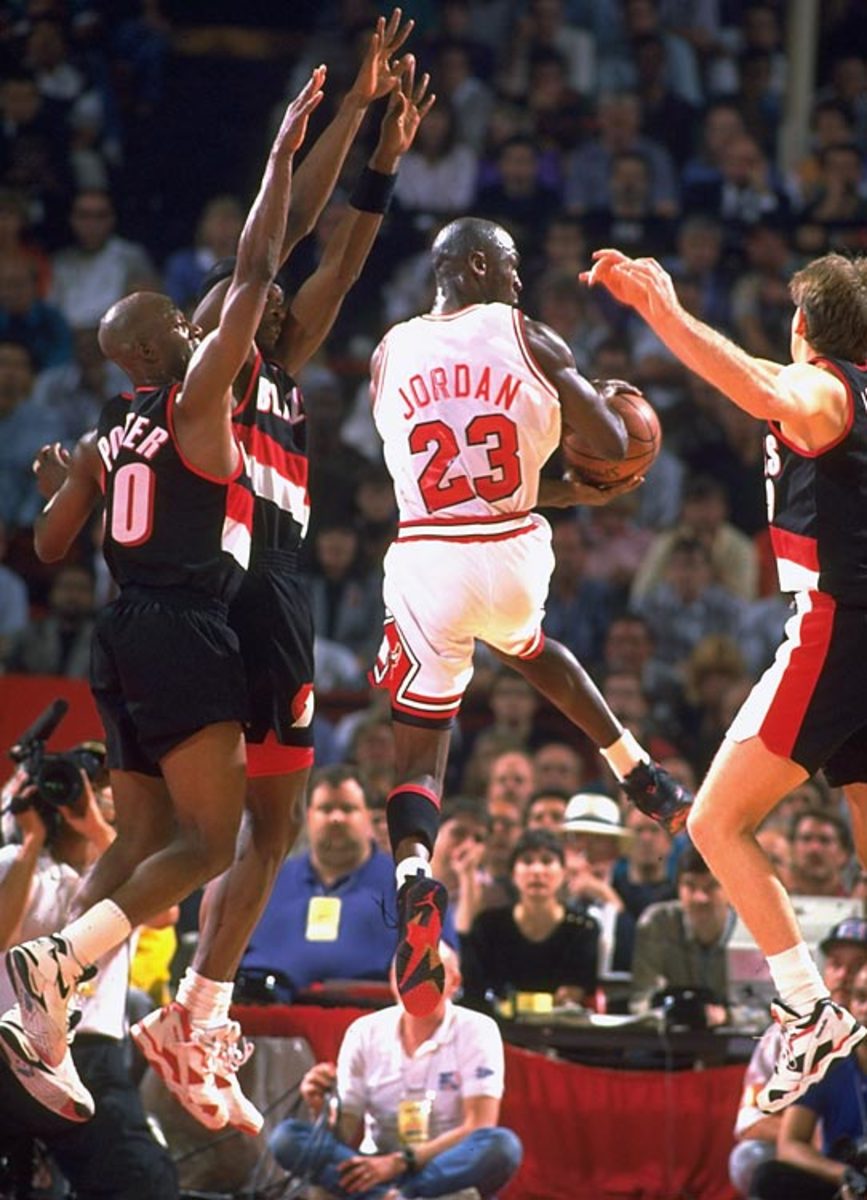
Michael Jordan and the Bulls appeared in their second Finals to face Clyde Drexler and the Portland Trail Blazers. The debate about who was better between MJ and Clyde was effectively silenced as Jordan hit six first-half threes in Game 1, famously shrugging at the broadcast table after hitting the sixth one. Jordan's dominance set the tone for the series.
1991
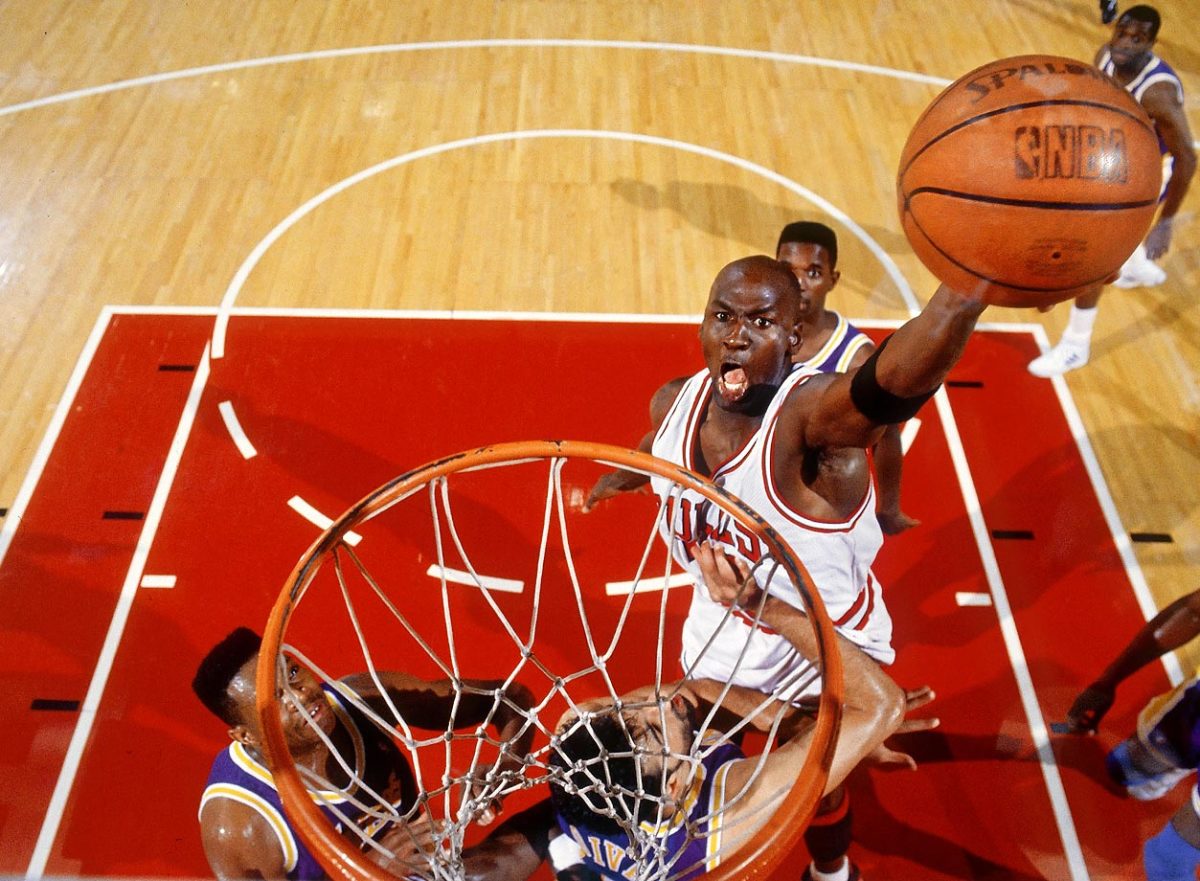
Michael Jordan skies for a dunk over Lakers center Vlade Divac in Game 2, a 107-86 Chicago win. Jordan scored 33 points on 15-of-18 shooting, including his famous hand-switching layup to lead the Bulls.
1991
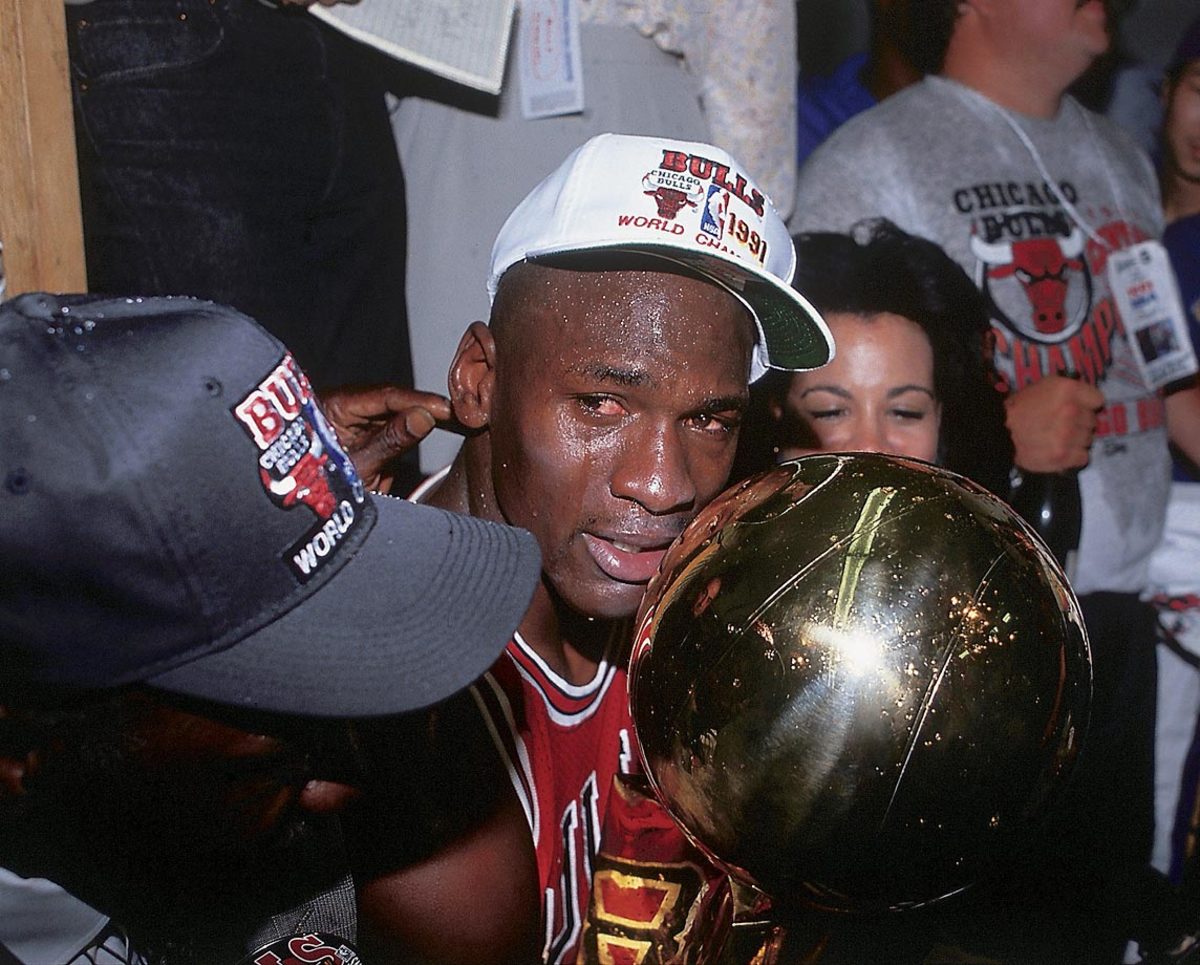
With his parents at his side, Michael Jordan holds the Chicago Bulls' first-ever championship trophy after defeating the Los Angeles Lakers in five games.
1990
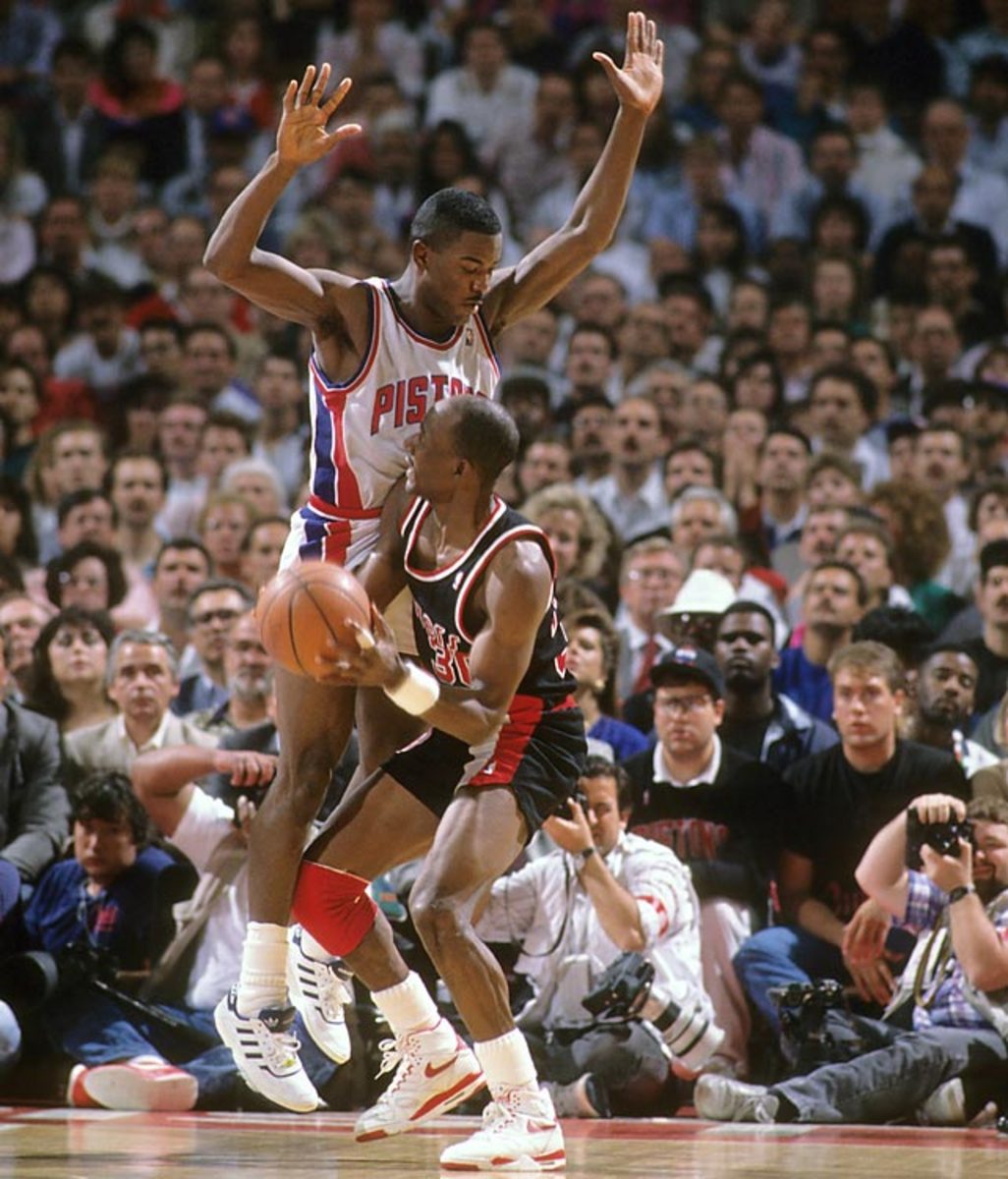
Joe Dumars of the Pistons defends Terry Porter of the Trail Blazers in Game 1. The backcourt of Isiah Thomas (27.6 points per game) and Dumars (20.6) propelled Detroit to the championship in five games. Vinnie Johnson hit the series-clinching jumper at the end of Game 5.
1989
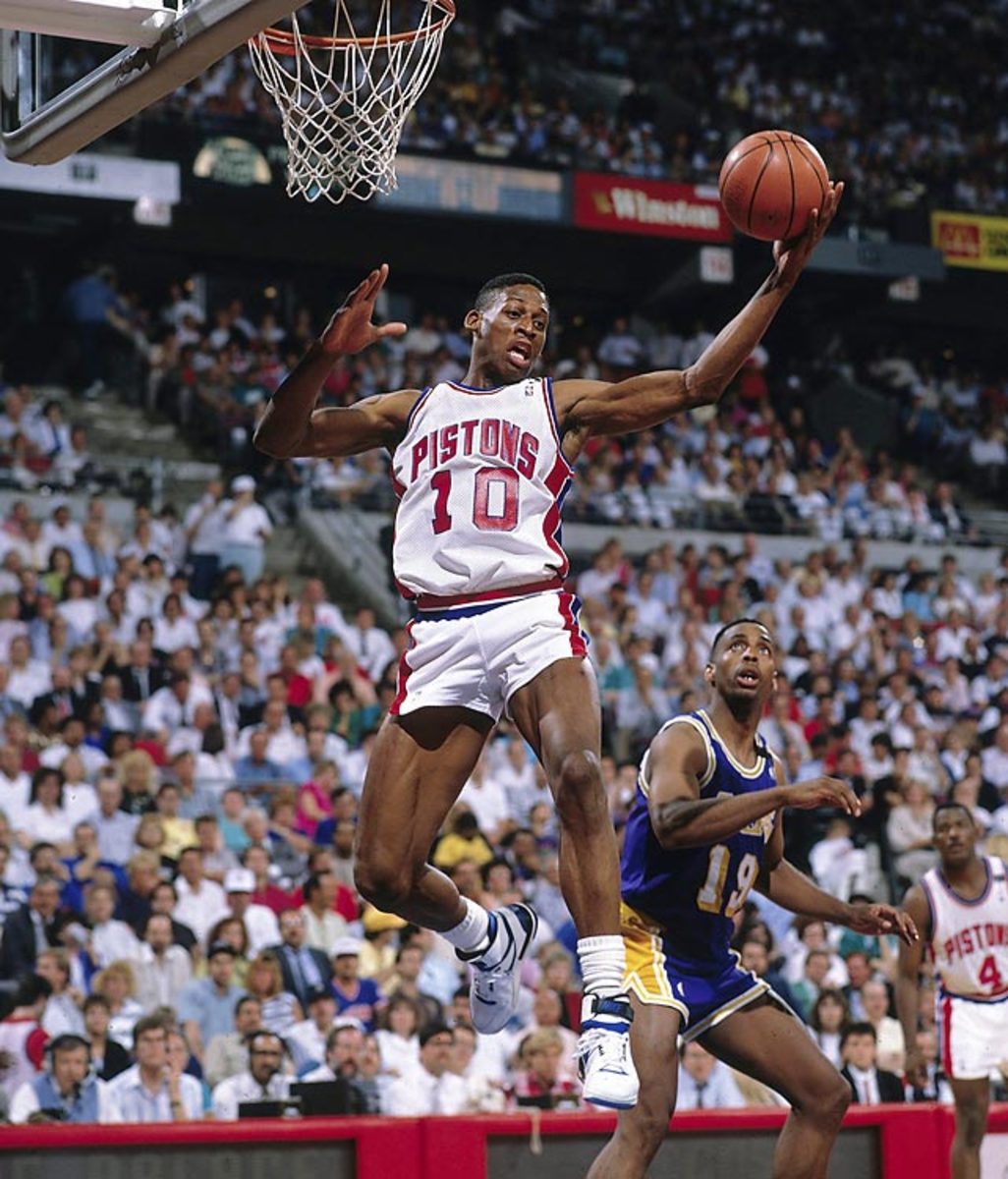
Pistons forward Dennis Rodman snatches a board against the Lakers. Detroit ended L.A.'s bid for a third straight title with a four-game sweep after Magic Johnson injured his hamstring early in Game 2.
1988
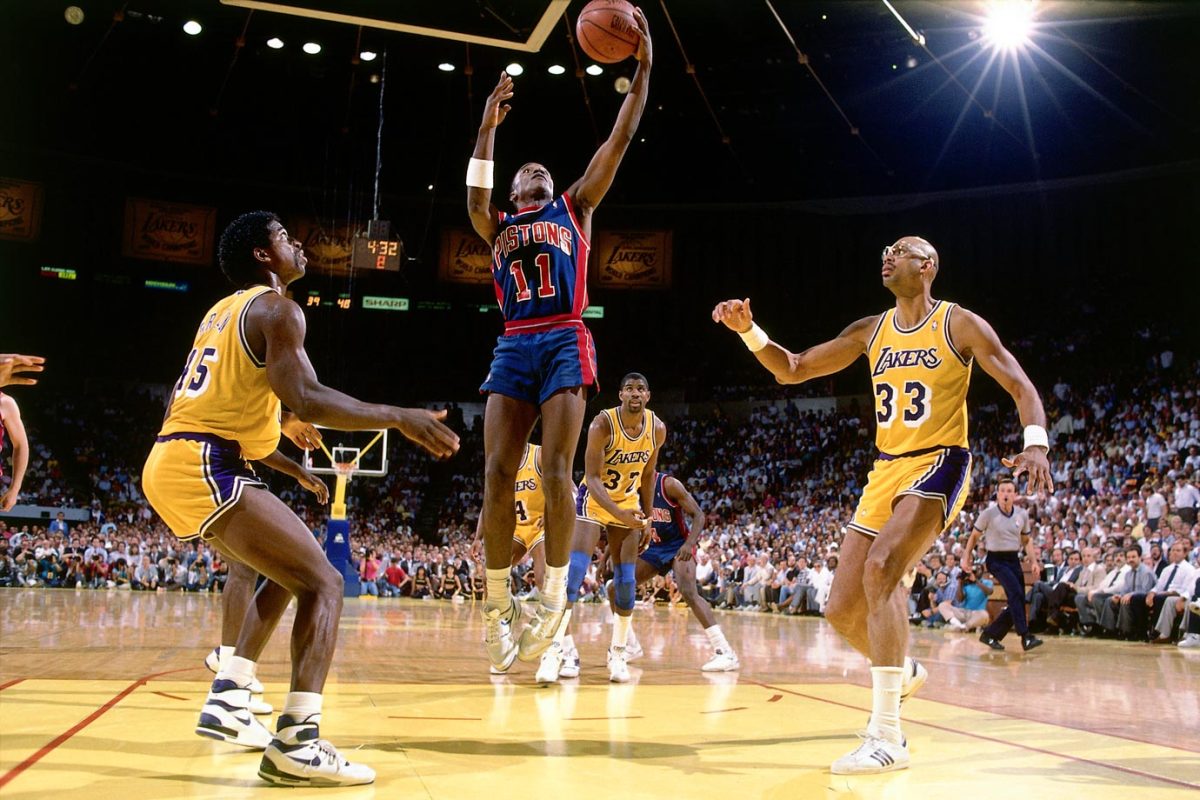
A new challenger emerged from the Eastern Conference as Detroit's "Bad Boys," starring point guard Isiah Thomas took on the Lakers. With Detroit up 3-2 going into Game 6, Thomas scored 25 gritty third-quarter points playing on a sprained ankle. It wouldn't be enough — L.A. won Game 6 103-102, with 28 points from James Worthy.
1988
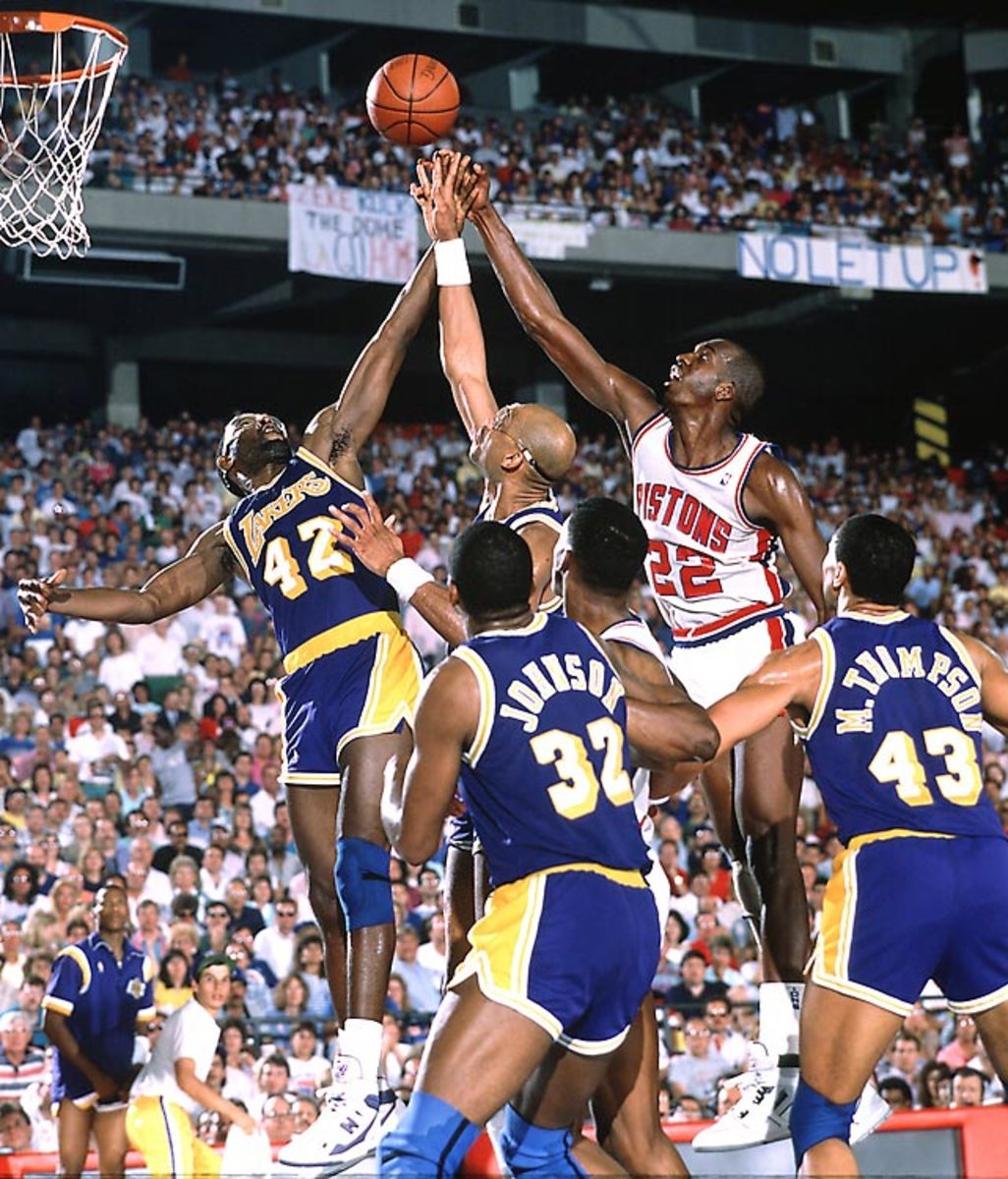
In Game 7 James Worthy (42) again shouldered the load for Los Angeles, recording a triple-double with 26 points, 16 rebounds and 10 assists to secure another Lakers title and Finals MVP accolades.
1987
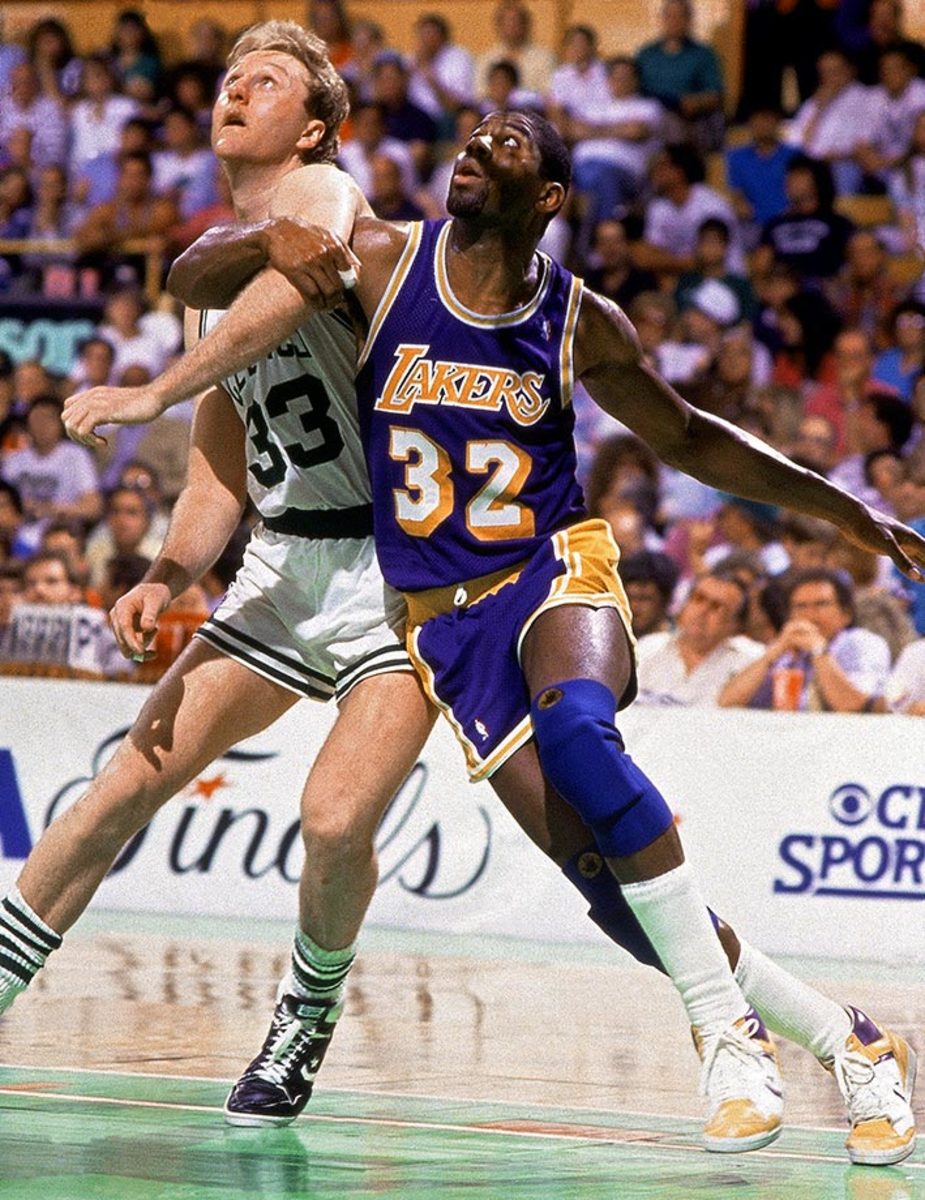
Boston, L.A., Bird and Johnson would meet in the Finals for the last time in 1987. Los Angeles won in six games with the core of Johnson, Abdul-Jabbar and Worthy again proving to be the cream of the crop.
1987
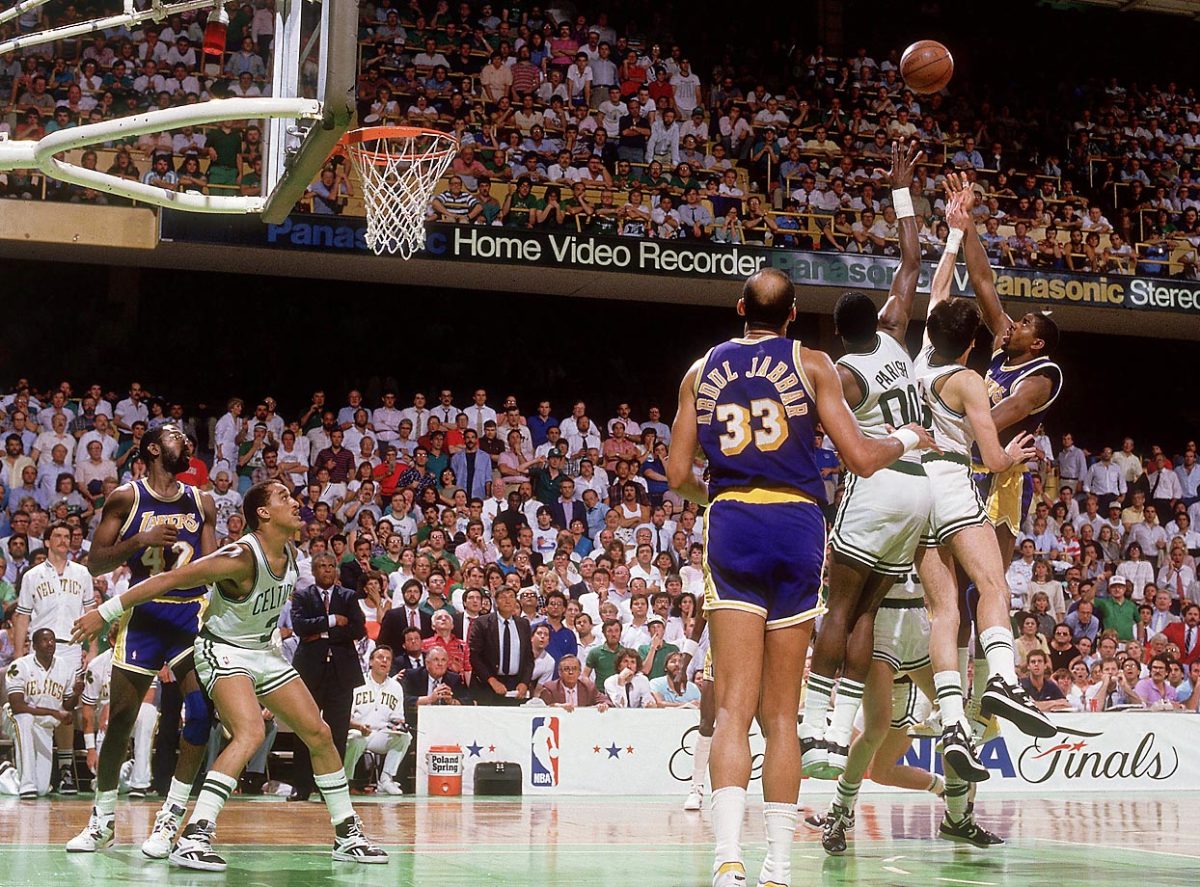
Magic Johnson drains his famous junior sky hook over Robert Parish and Kevin McHale to win Game 4 for the Lakers at the buzzer. Johnson was named Finals MVP.
1986
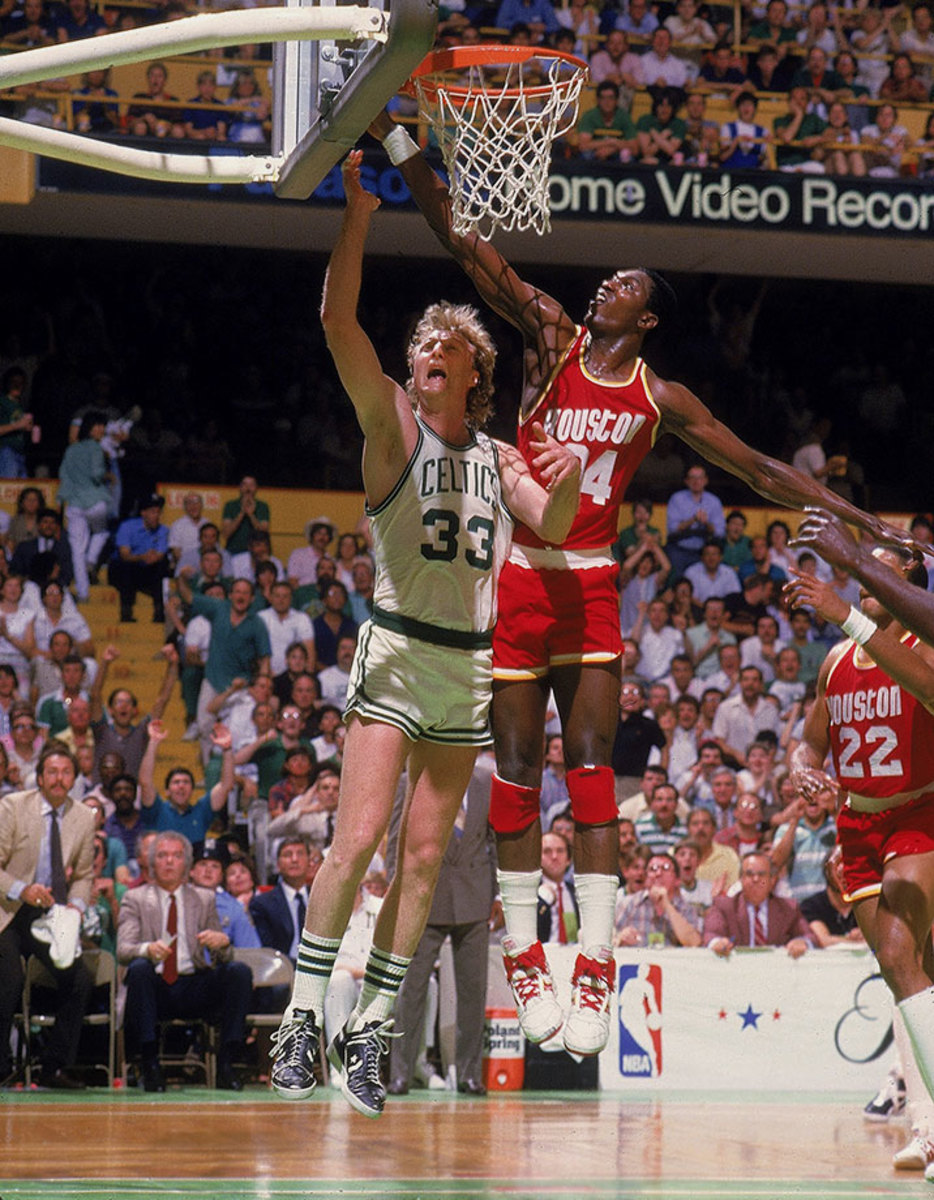
Larry Bird battles Hakeem Olajuwon under the hoop. The Celtics would win their second title in three straight finals appearances, paced by the dominant Bird (24 points, 9.7 rebounds and 9.5 assists per game), who posted a triple-double in the series-clinching Game 6.
1985
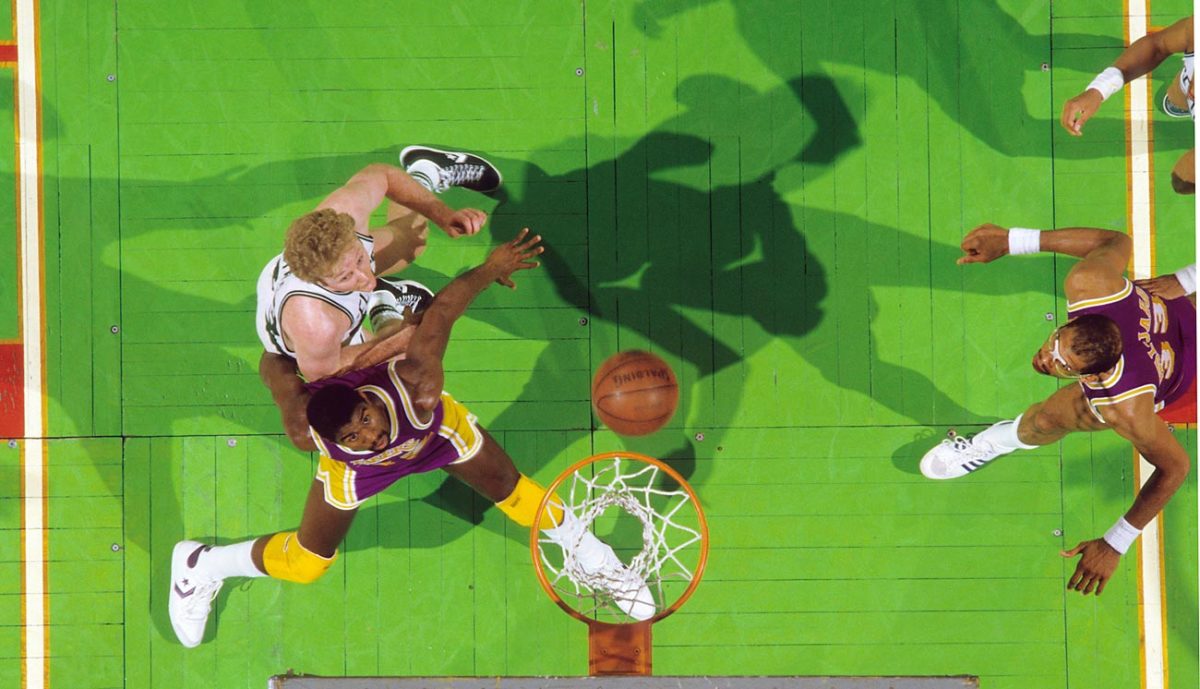
Rival stars Magic Johnson of the Lakers and Larry Bird of the Celtics battle beneath the rim in Game 1 of the 1985 Finals. L.A. pulled the series out in six games thanks to vintage play from 37-year-old Kareem Abdul Jabbar.
1984
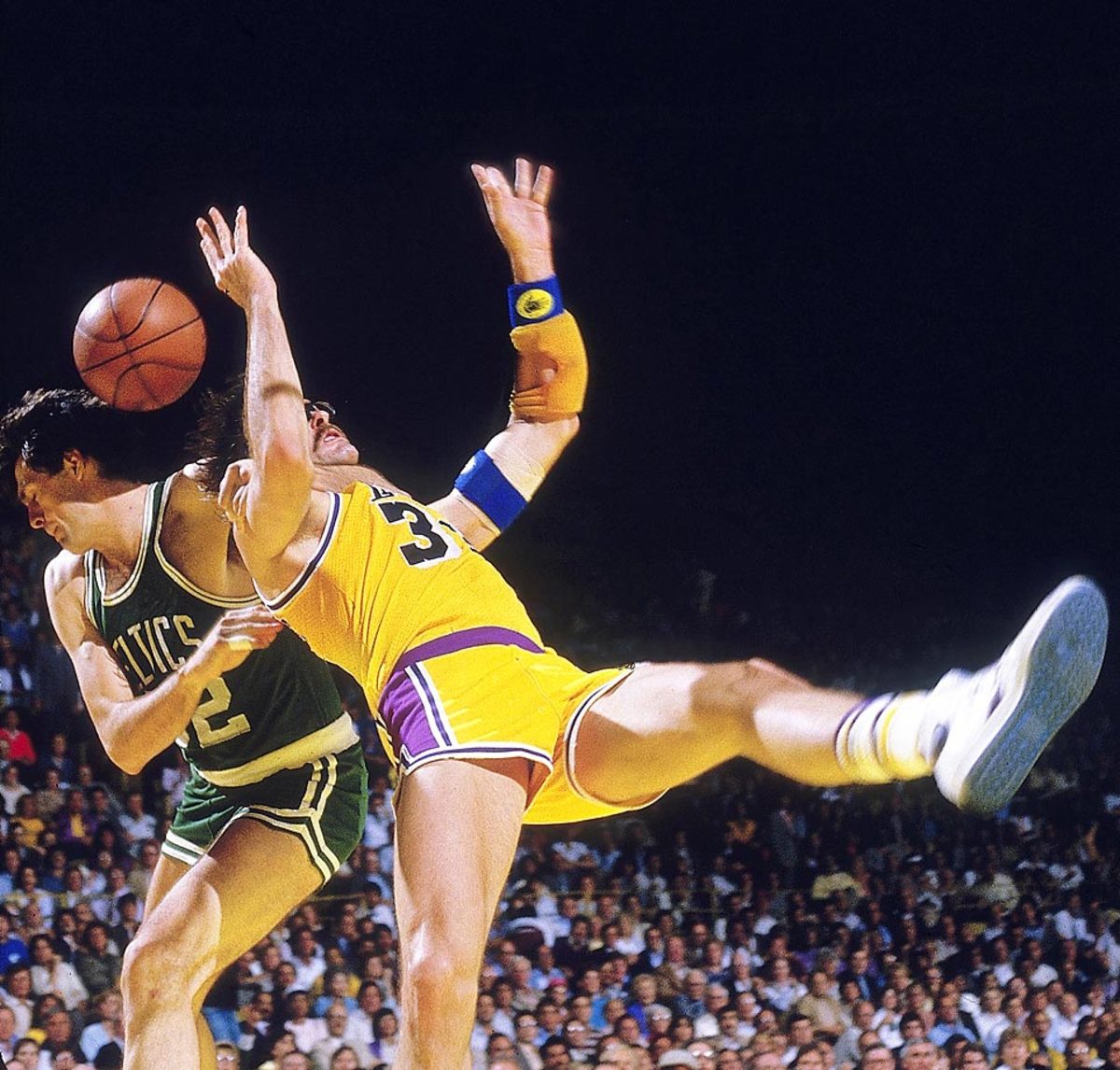
Kevin McHale of the Celtics delivers an extremely hard foul on Lakers forward Kurt Rambis in Game 4. The Boston-Los Angeles rivalry was reignited with an epic seven-game clash between the teams.
1984
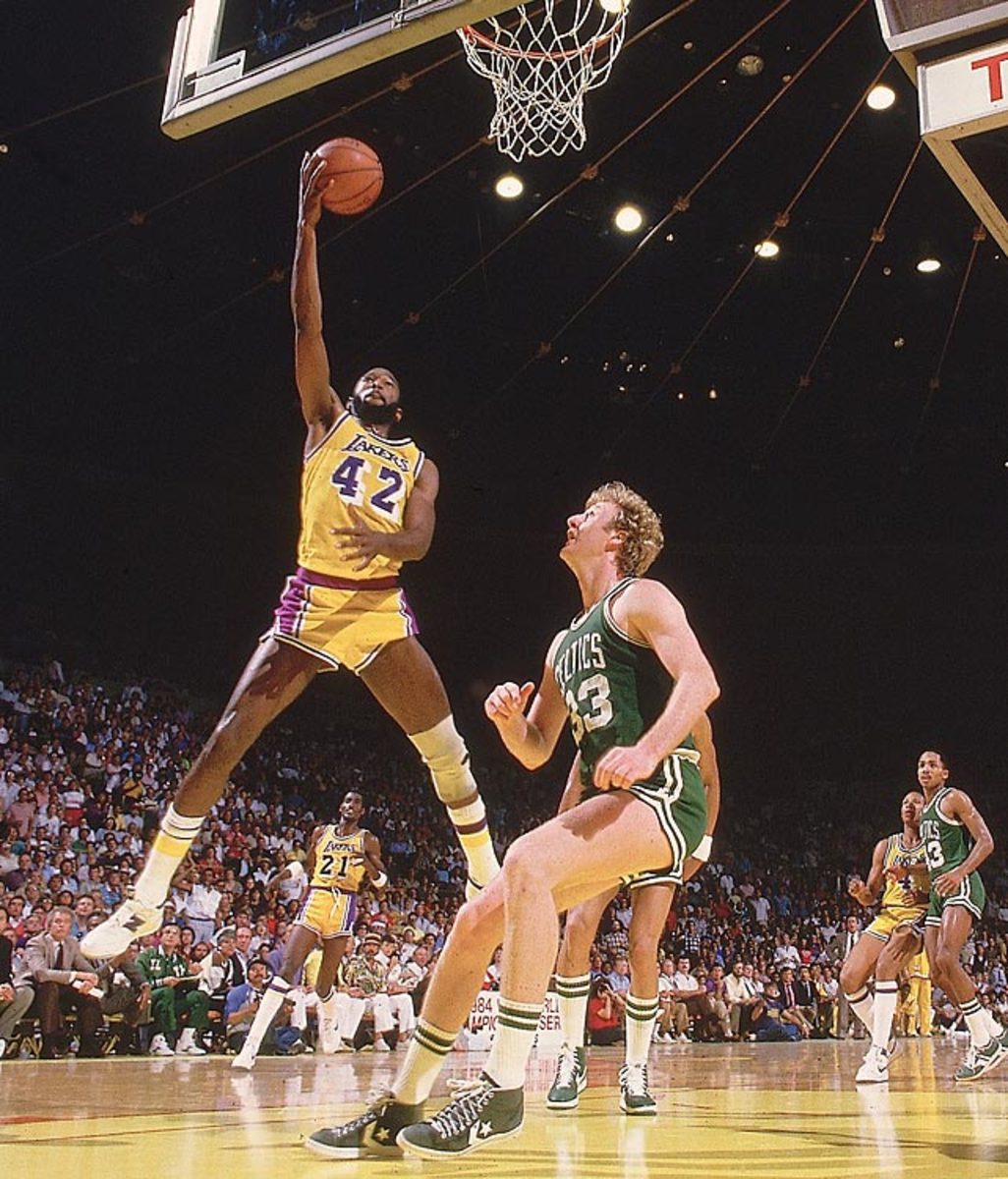
Los Angeles forward James Worthy rises to score over Boston's Larry Bird during a 119-108 Game 6 Lakers victory.
1983
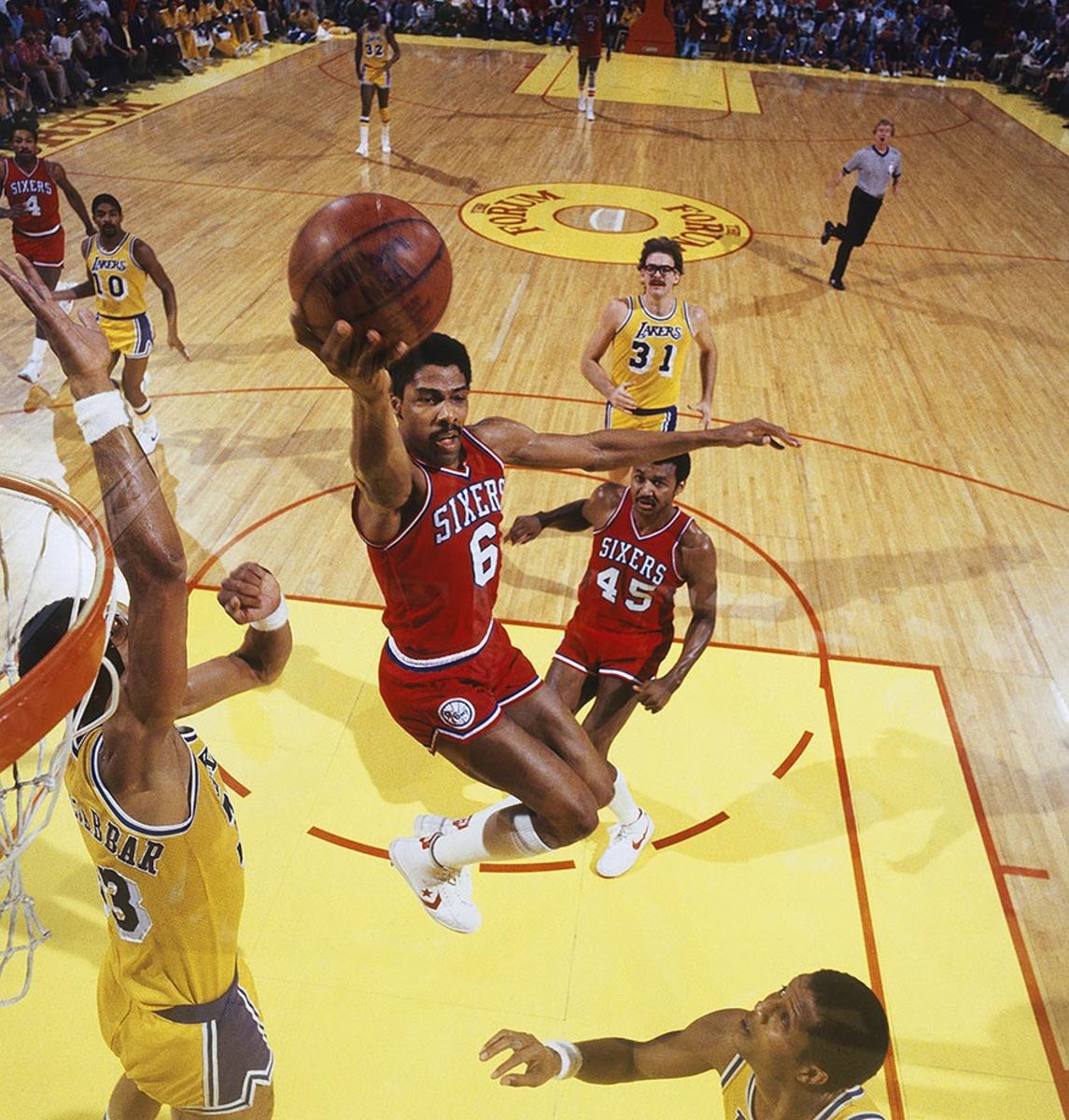
Julius Irving of the Sixers soars to the rim in their third finals matchup with the Lakers in four seasons. This time Philadelphia would prevail in a four-game sweep.
1983
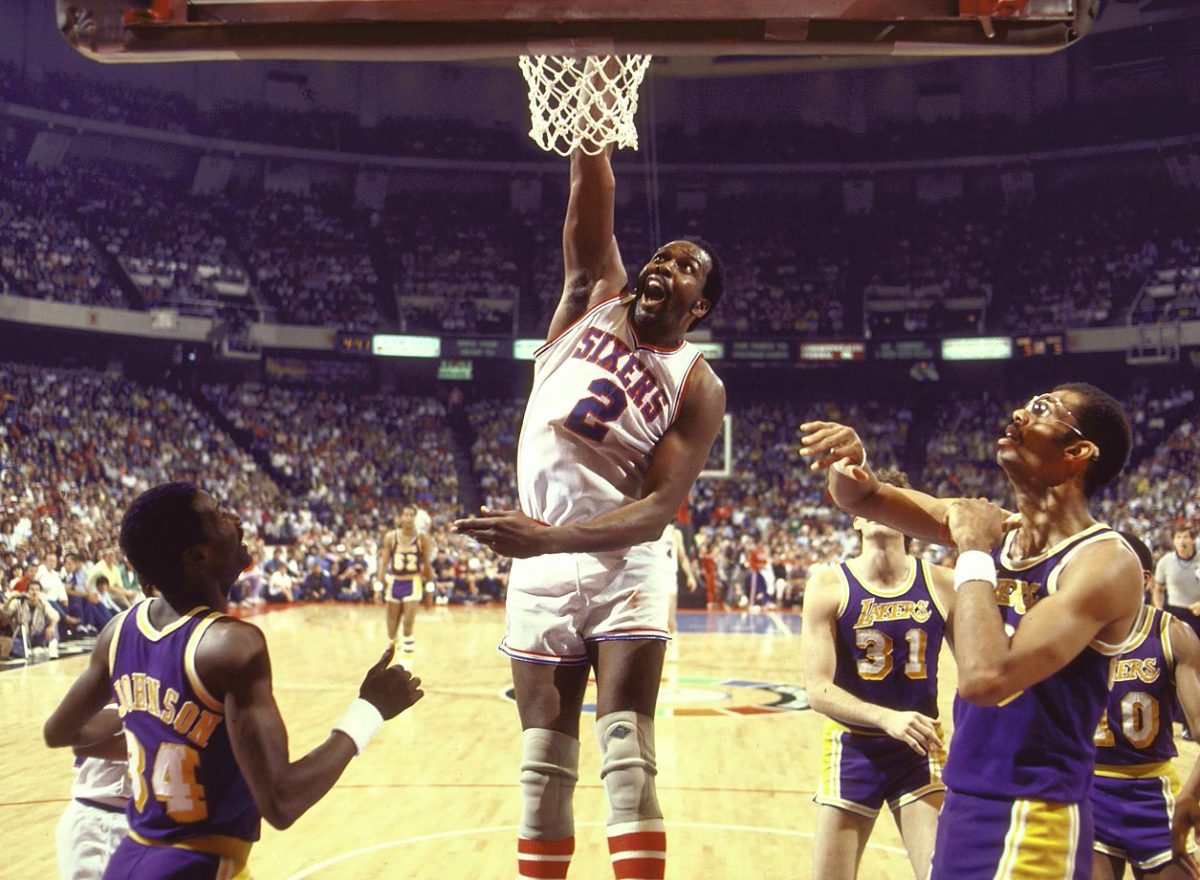
Finals MVP Moses Malone was dominant in Philadelphia's sweep of Los Angeles, averaging 25.8 points and 18 rebounds per game while outplaying L.A. center Kareem Abdul-Jabbar.
1982
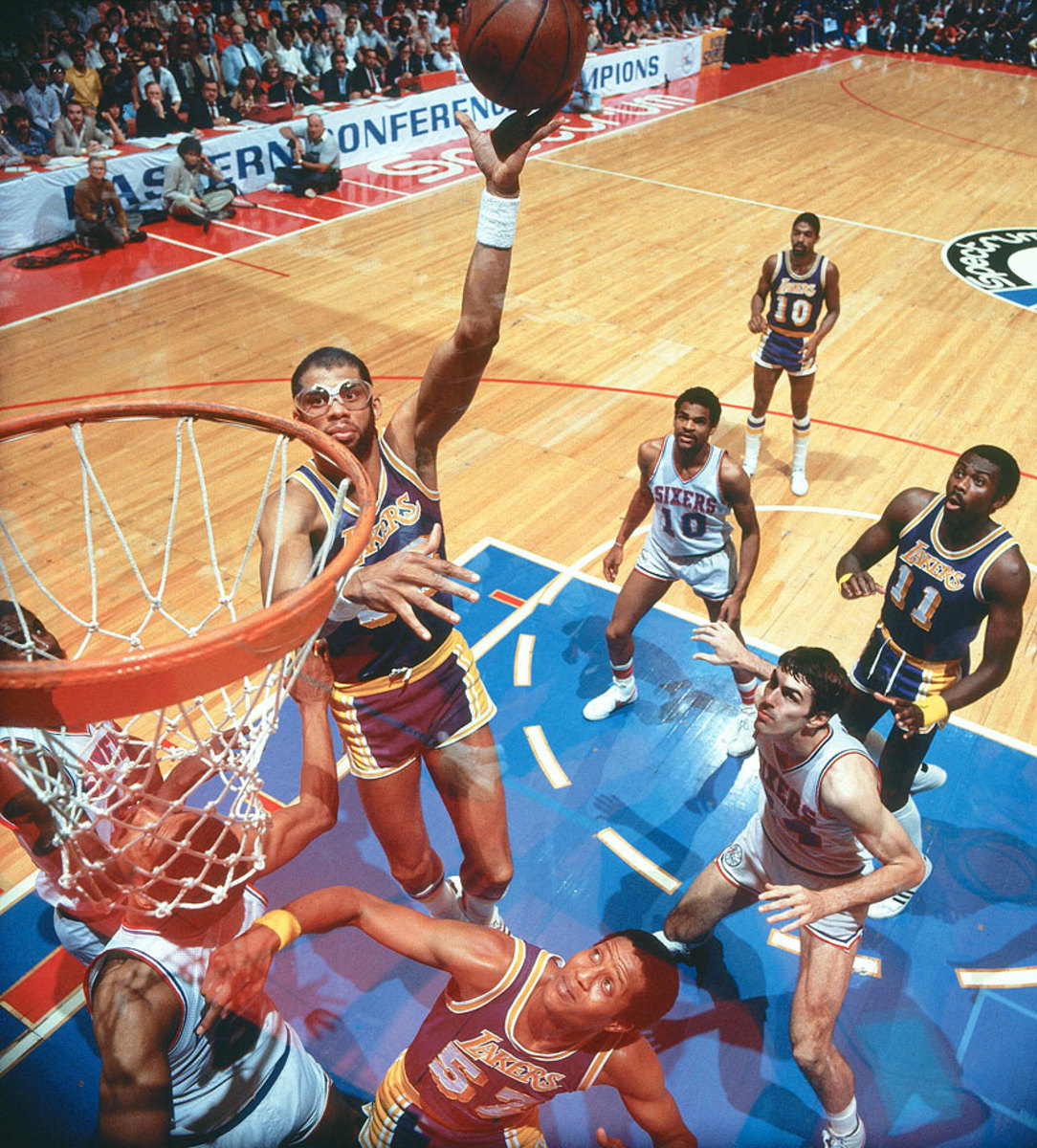
Kareem Abdul-Jabbar and the Lakers squared off against Julius Erving and the Sixers in a rematch of the 1980 finals. The Lakers once again prevailed in six games.
1982
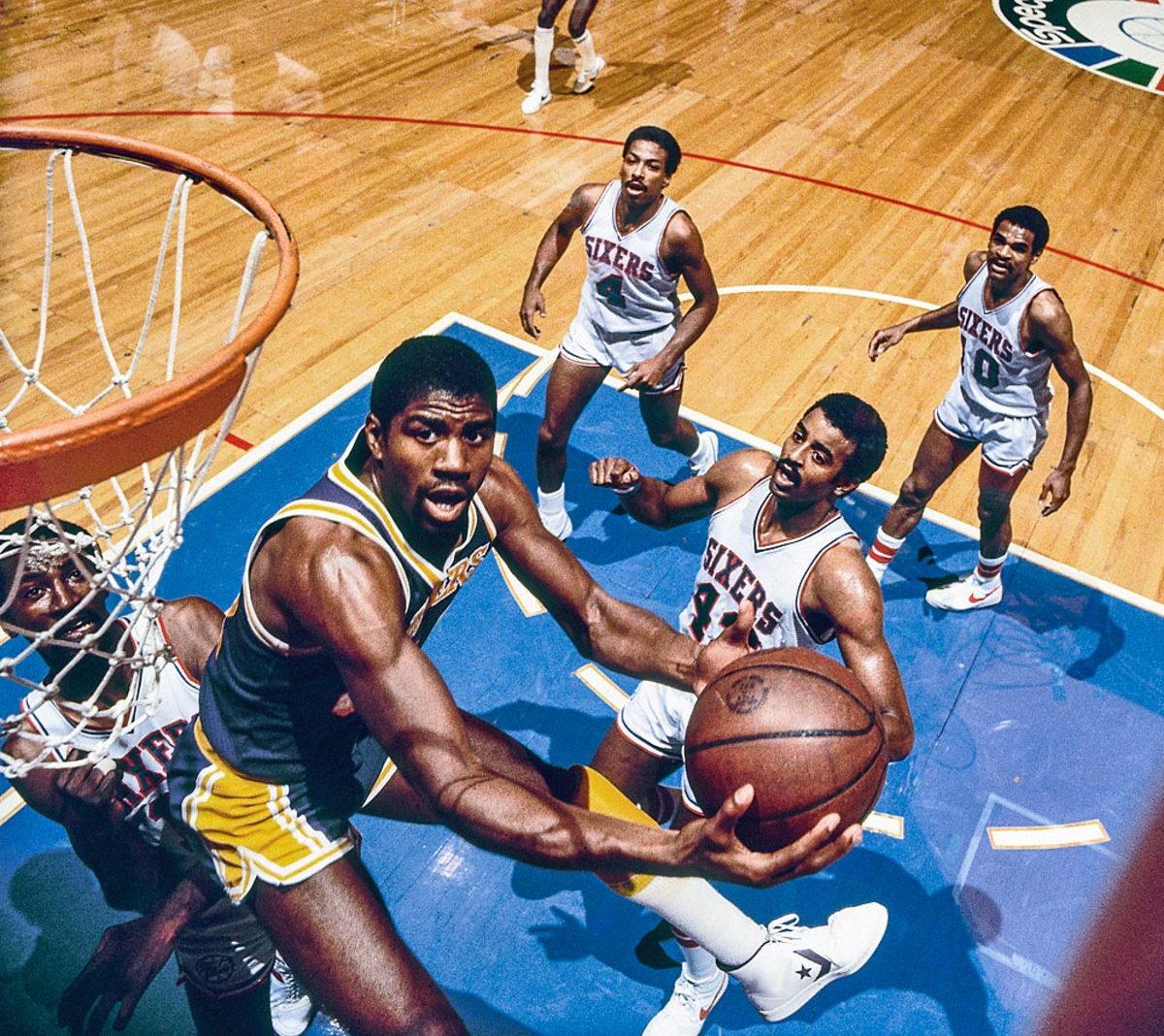
Magic Johnson attacks the hoop against the Sixers. Johnson fell just short of averaging a triple-double in the six-game series, with 16.2 points, 10.8 rebounds and 8 assists per game and winning MVP honors.
1981
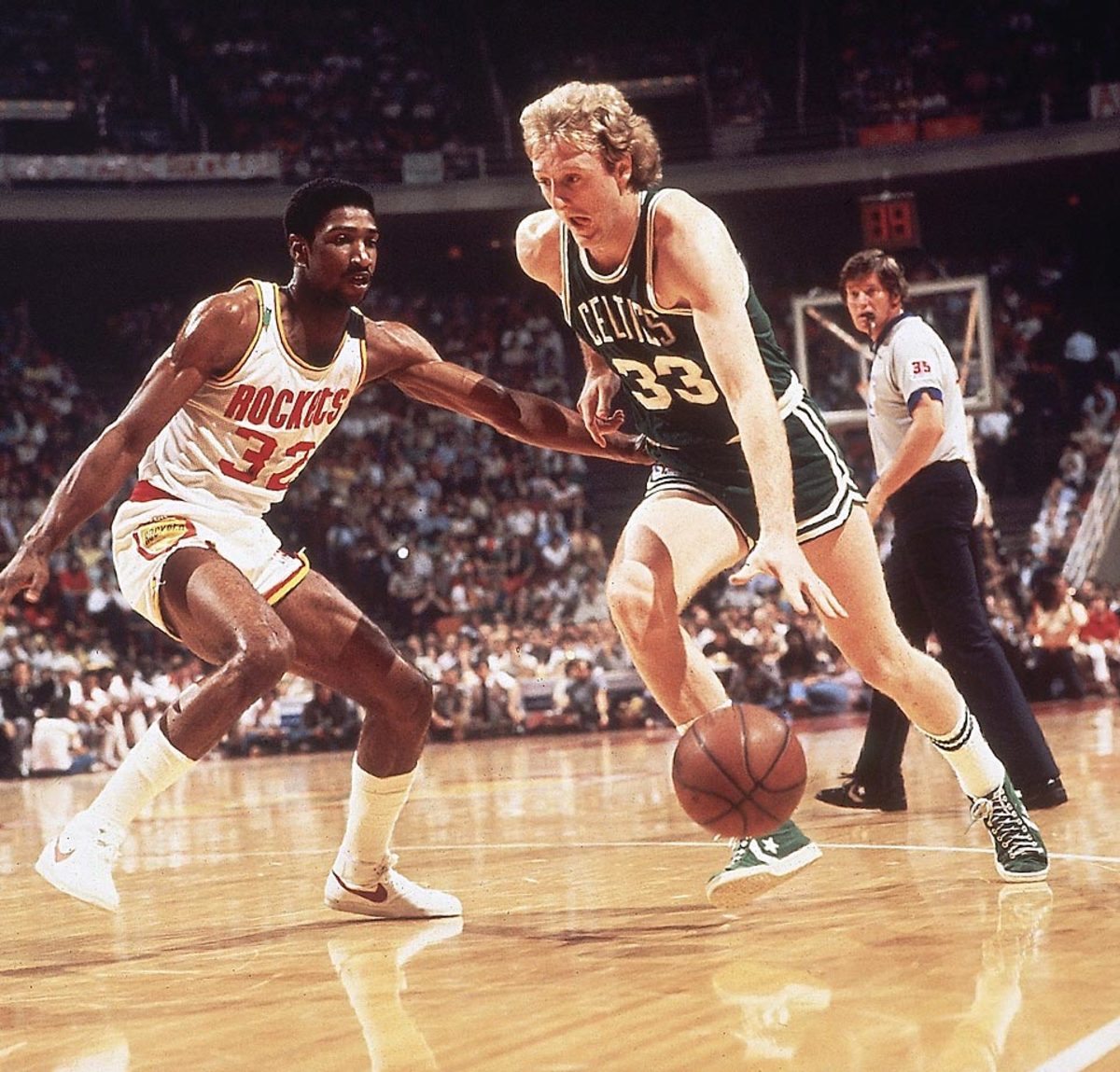
In 1981 it was Larry Bird's Celtics establishing themselves against the Rockets and dominant center Moses Malone.
1981
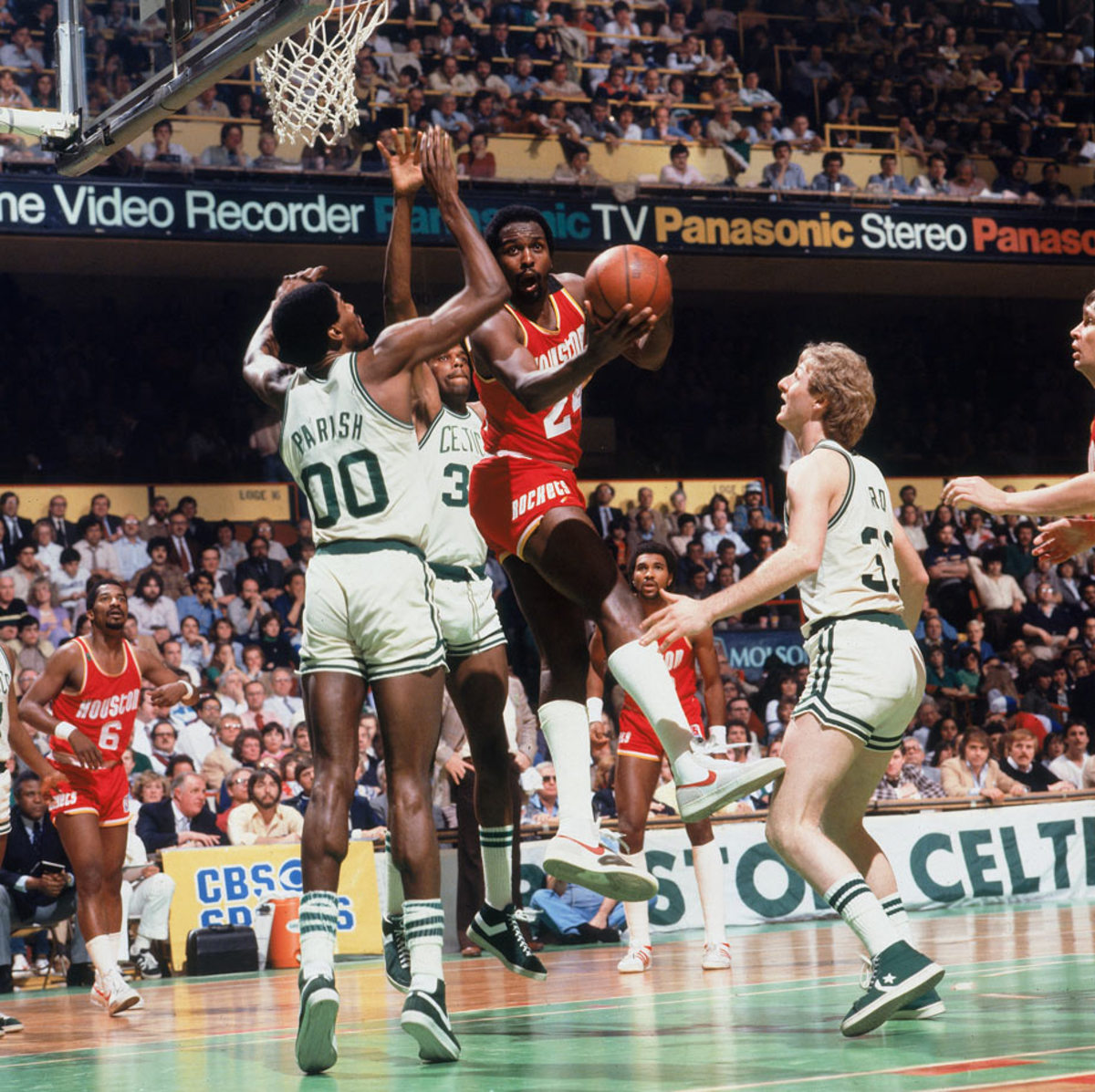
Moses Malone averaged 22.2 points and 16.3 rebounds for the series, which the Celtics won.
1981
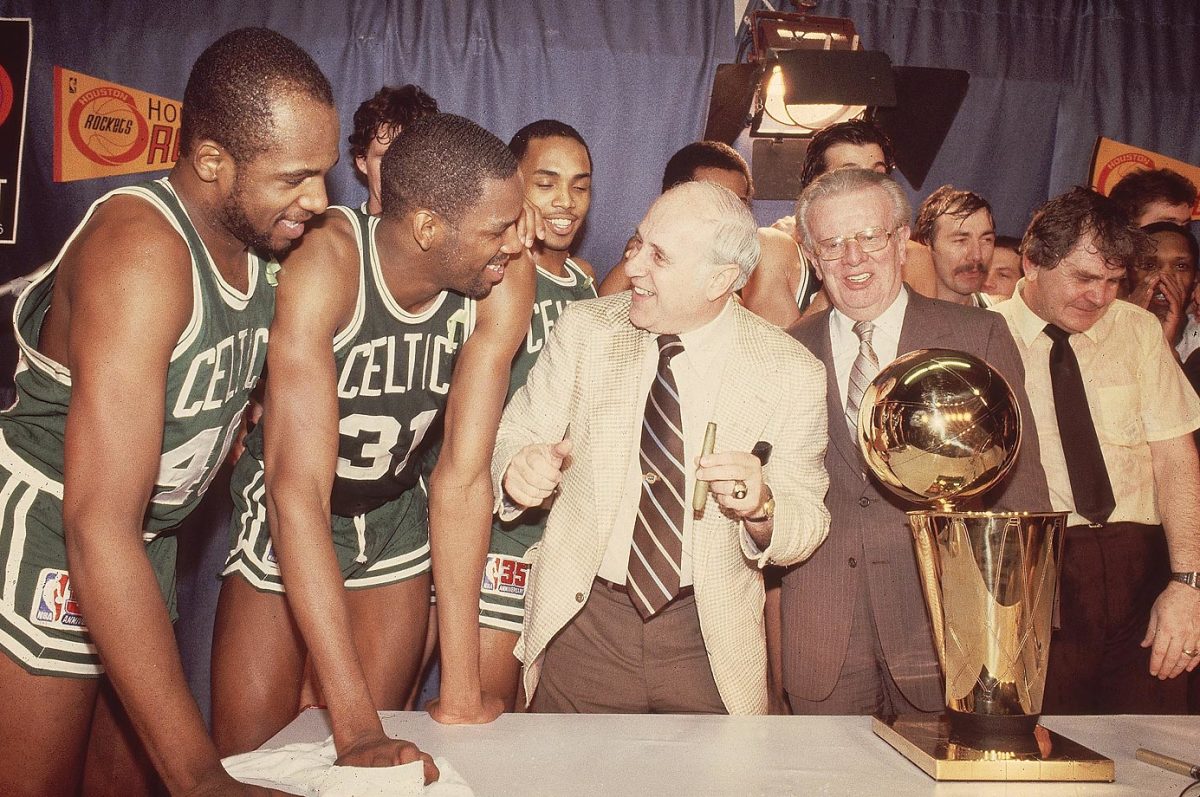
Boston Celtics owner Red Auerbach celebrates with the trophy and his team after beating the Houston Rockets in six games behind Finals MVP Cedric Maxwell and star Larry Bird.
1980
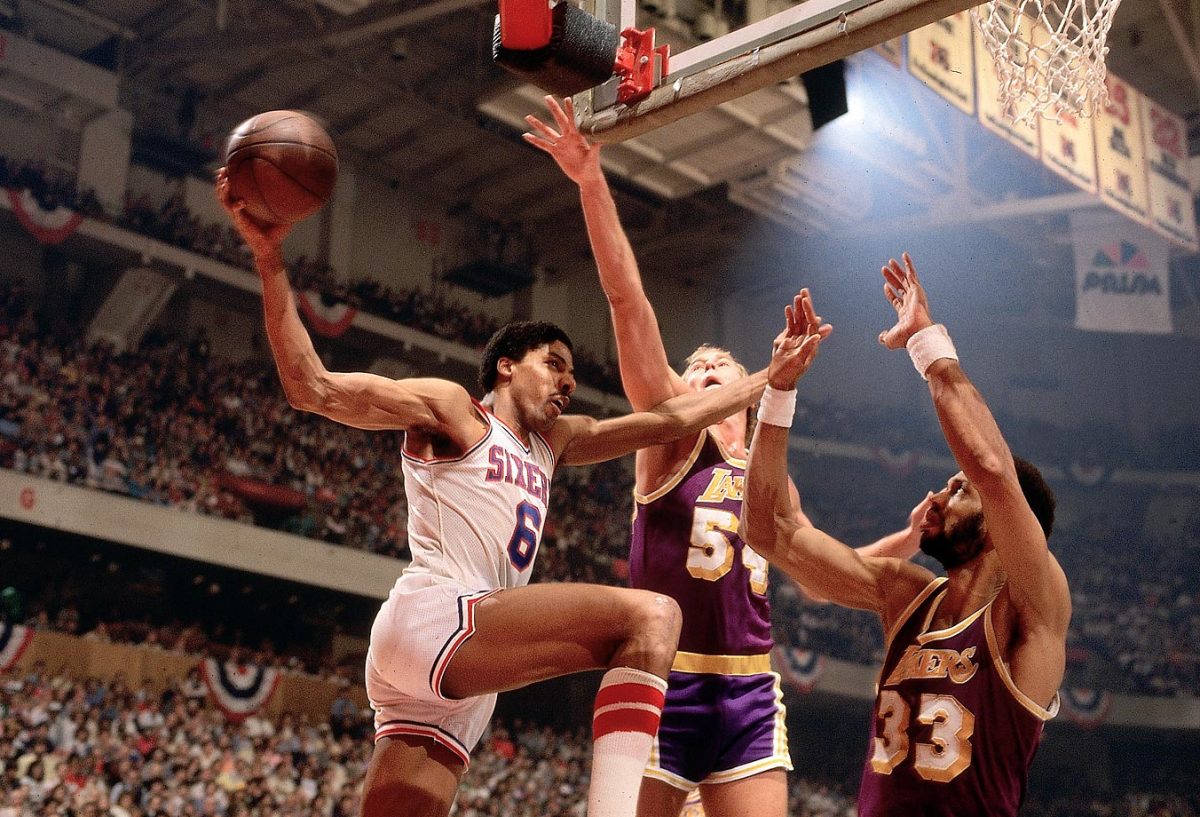
Julius Erving soars and stretches for what would become an iconic reverse layup in Game 4. The Sixers tied the series with a 105-102 win at home.
1980
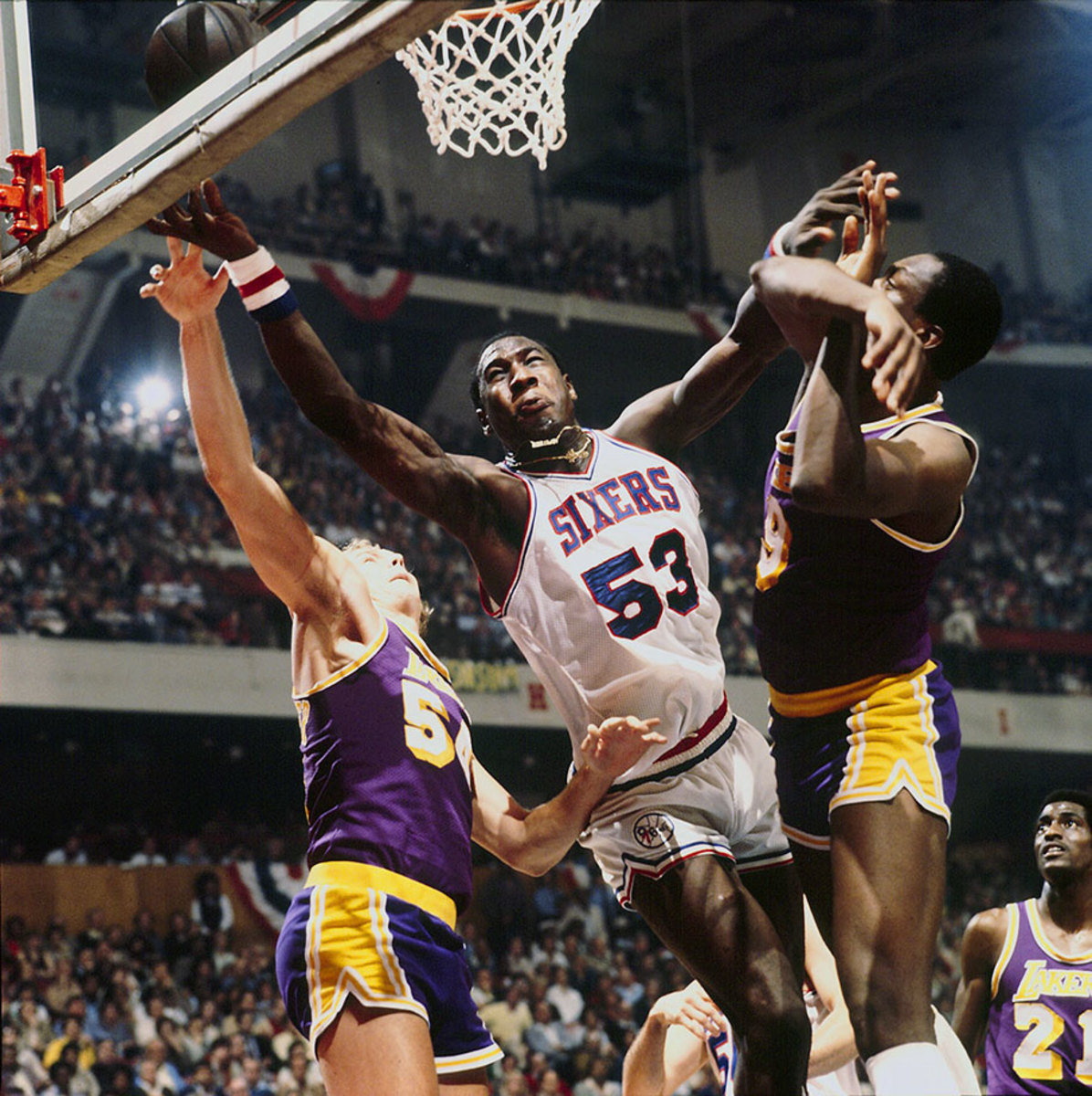
Philadelphia's Darryl Dawkins battles Los Angeles Lakers defenders on his way to the rim. "Chocolate Thunder" led the Sixers in scoring in their only two wins of the series.
1980
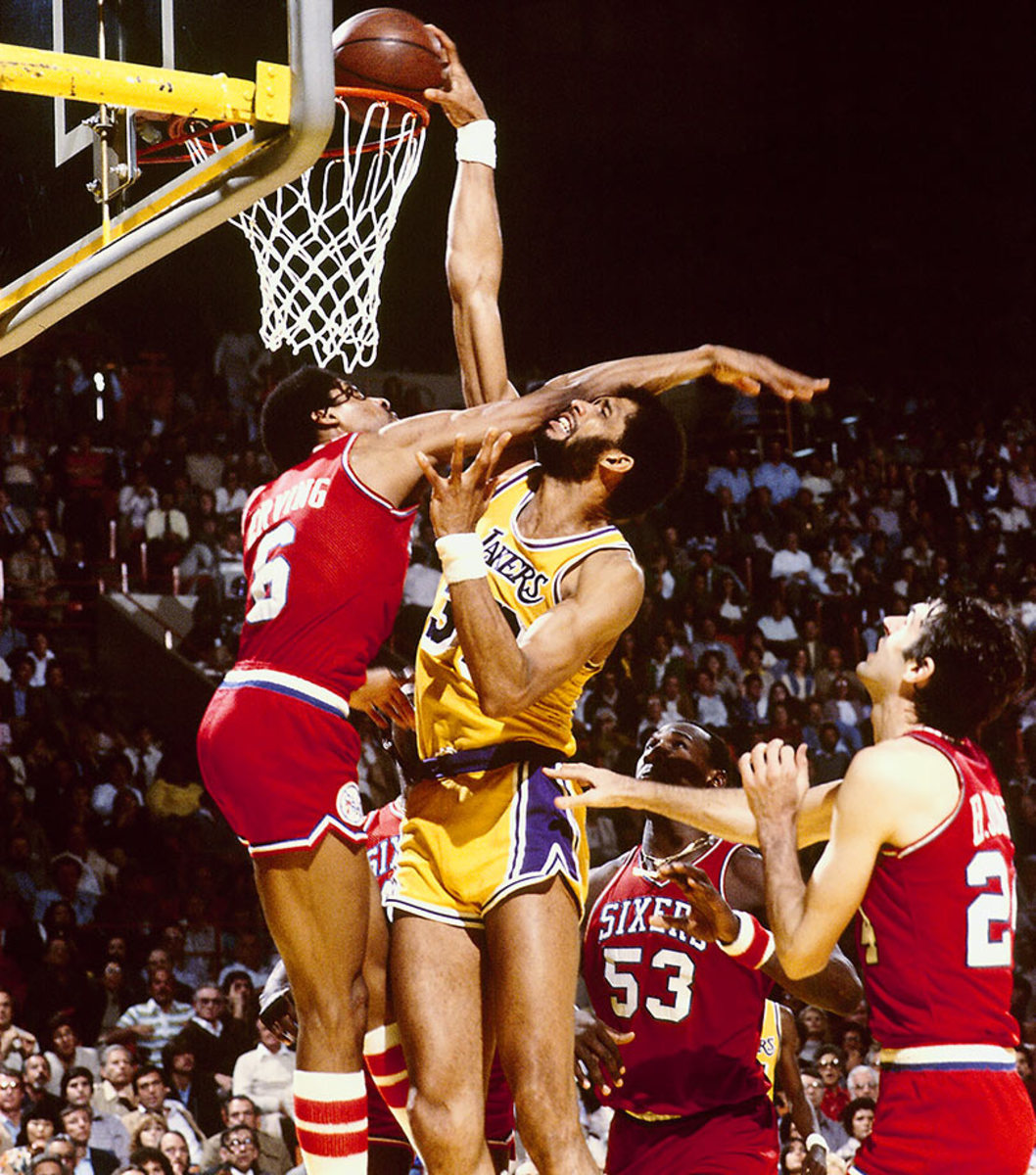
Kareem Abdul-Jabbar dunks against Julius Erving in Game 5 between the Lakers and Sixers.
1980
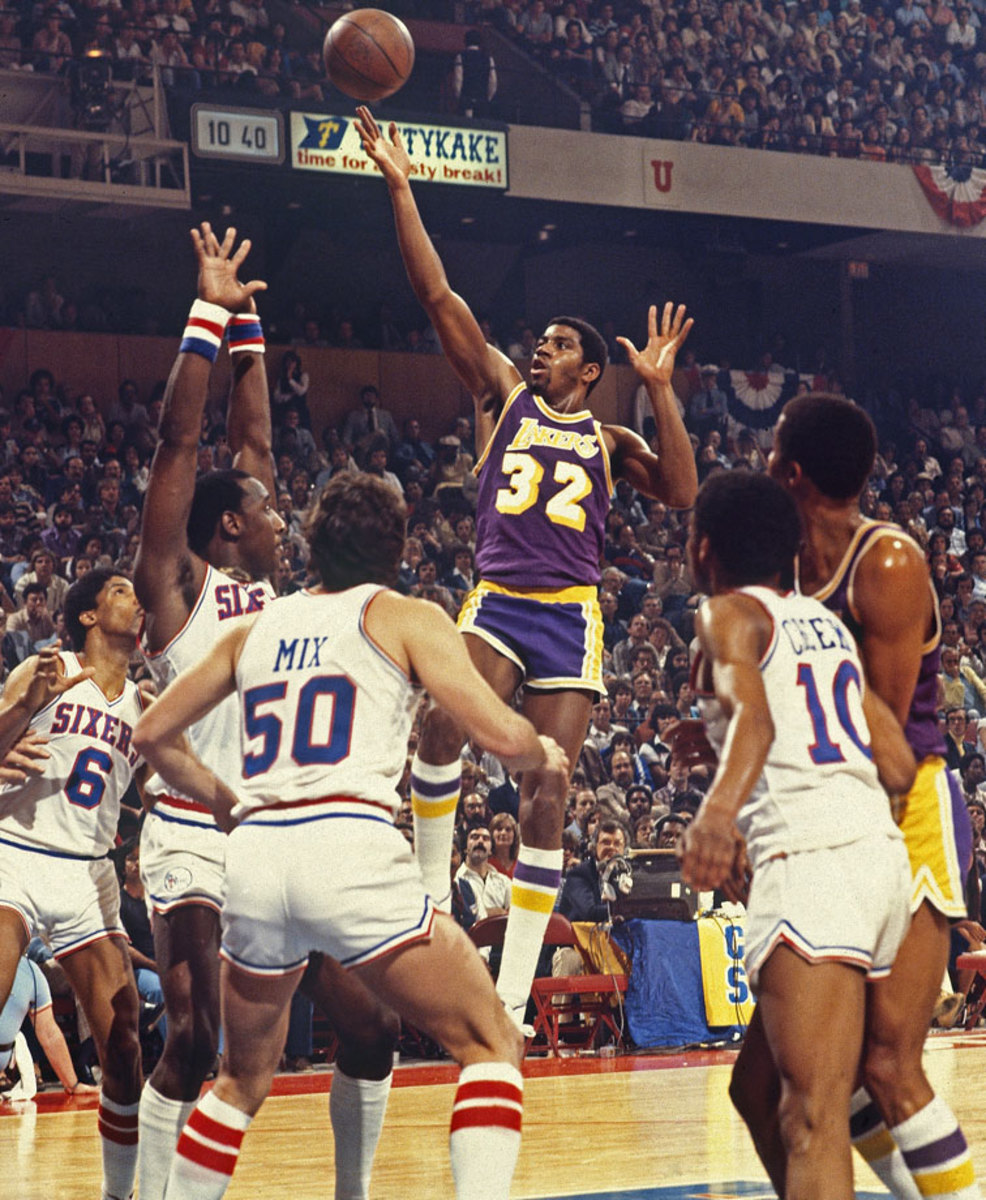
Magic Johnson's 42 points, 15 rebounds and 7 assists in Game 6 sealed the series for the Lakers, sparking a 123-107 win. The versatile Johnson memorably started the game at center for the injured Kareem Abdul-Jabbar in one of the greatest games in playoff history.
1979
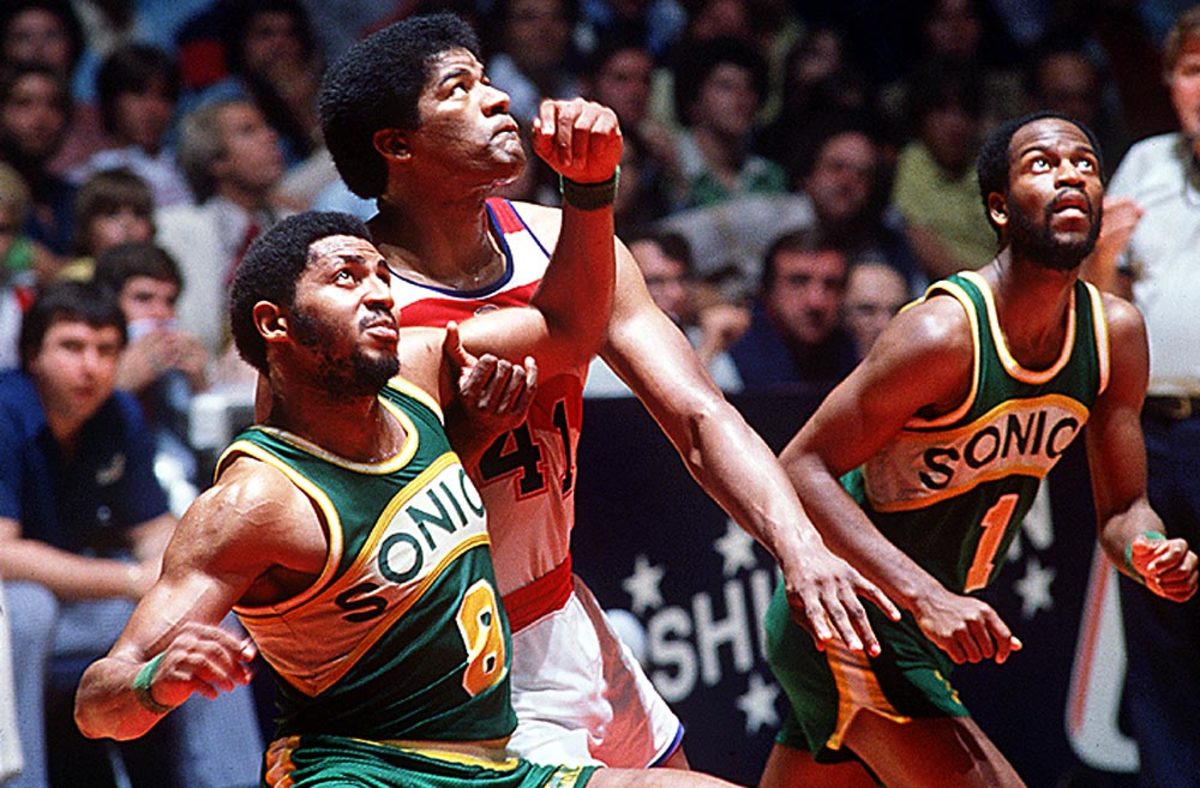
Lonnie Shelton of the Sonics battles Wes Unseld of the Bullets during the 1979 Finals. Unseld led Washington to a title over Seattle the previous year, but the Sonics stuck this one out behind their high-scoring backcourt of Gus Williams and Dennis Johnson.
1979
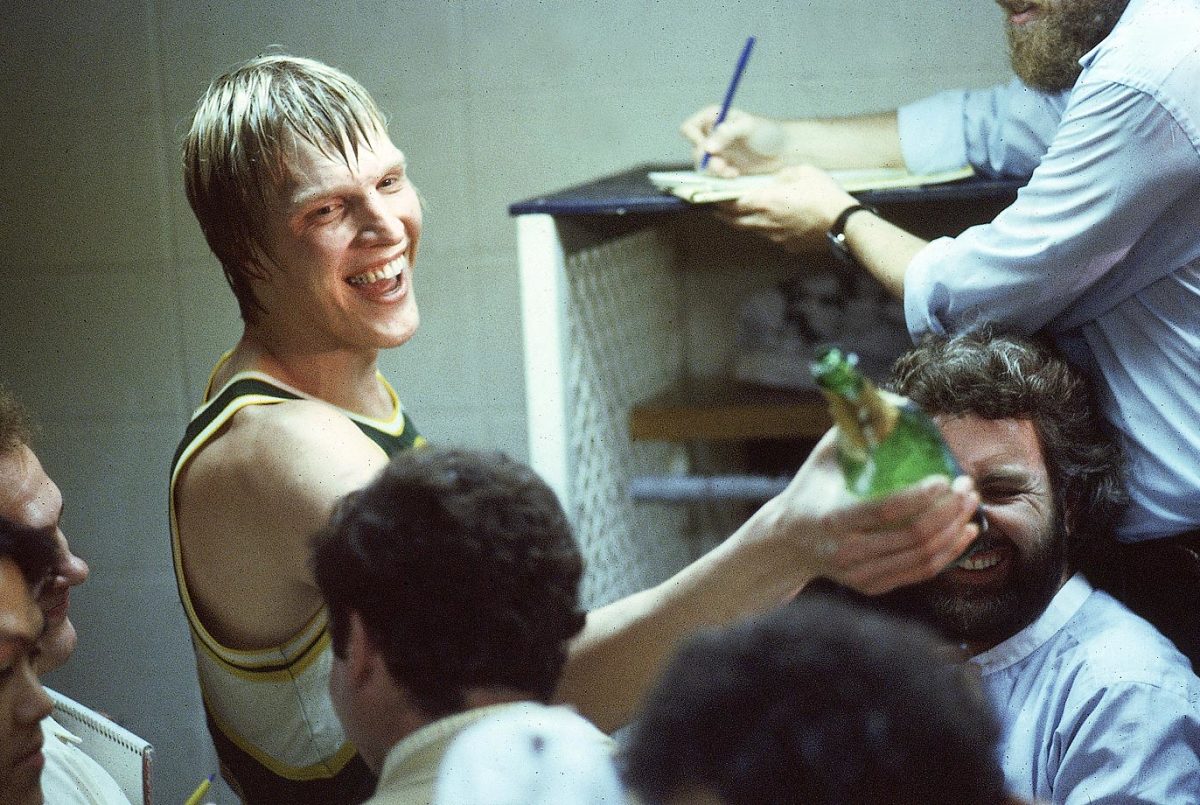
Jack Sikma of the Supersonics celebrates after the series-winning Game 5 against the Washington Bullets. It would be Seattle's lone championship in franchise history.
1978
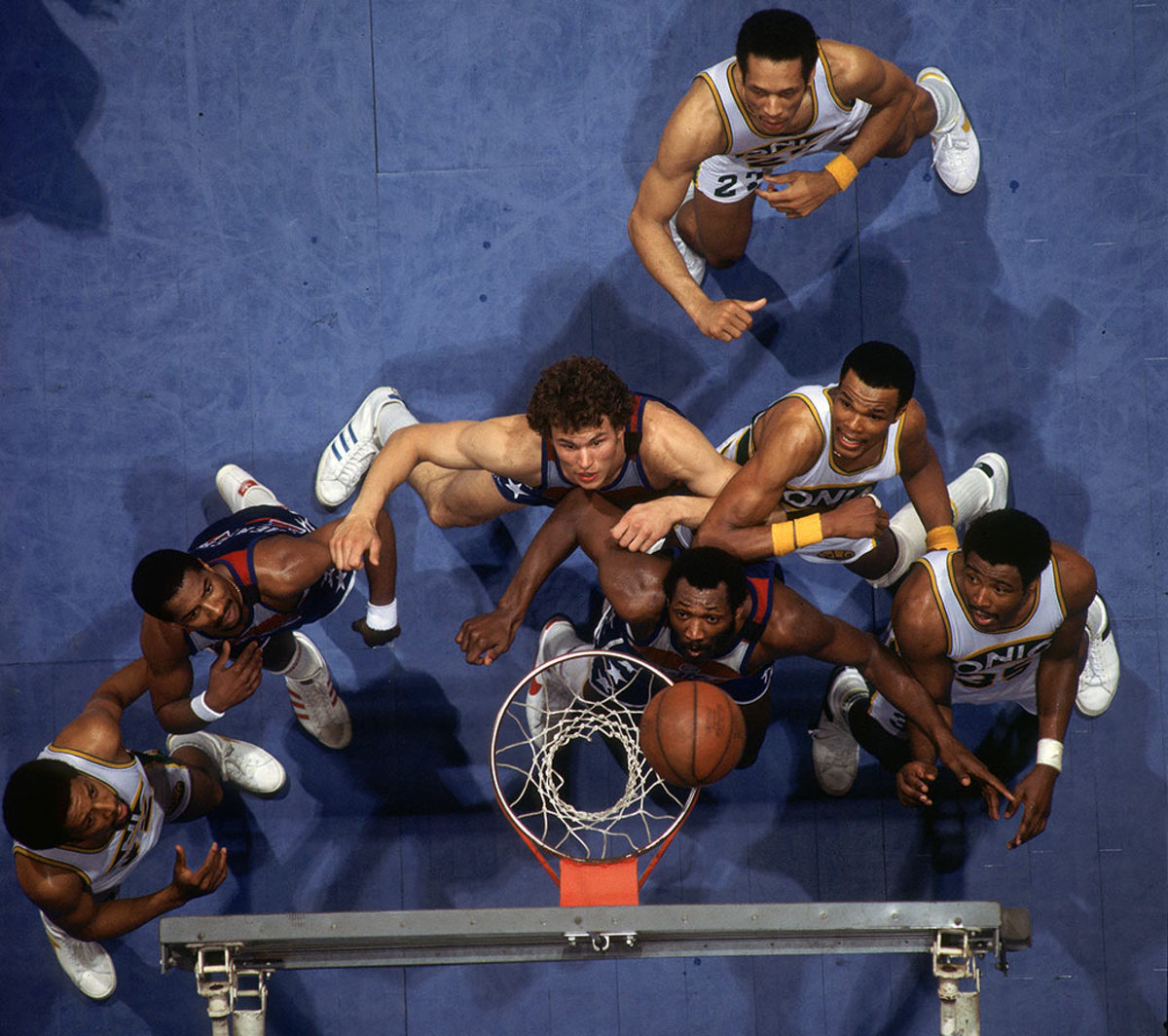
Elvin Hayes of the Washington Bullets watches the ball on the rim. Averaging 20.7 points and 11.9 rebounds, Hayes led Washington to its only title in franchise history.
1977
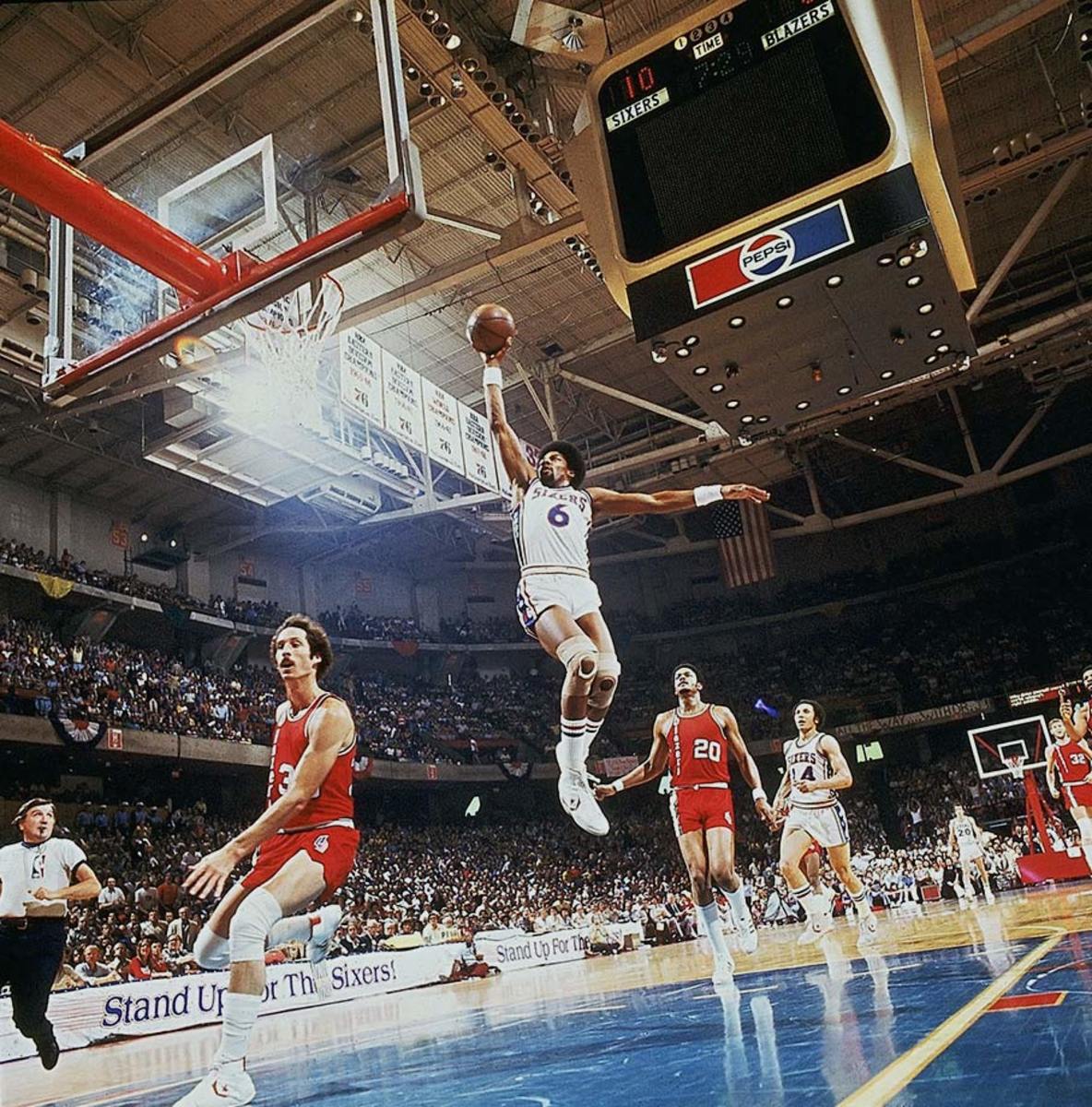
Julius Erving soars to the basket for a dunk in Game 2 between the 76ers and Trail Blazers.
1977
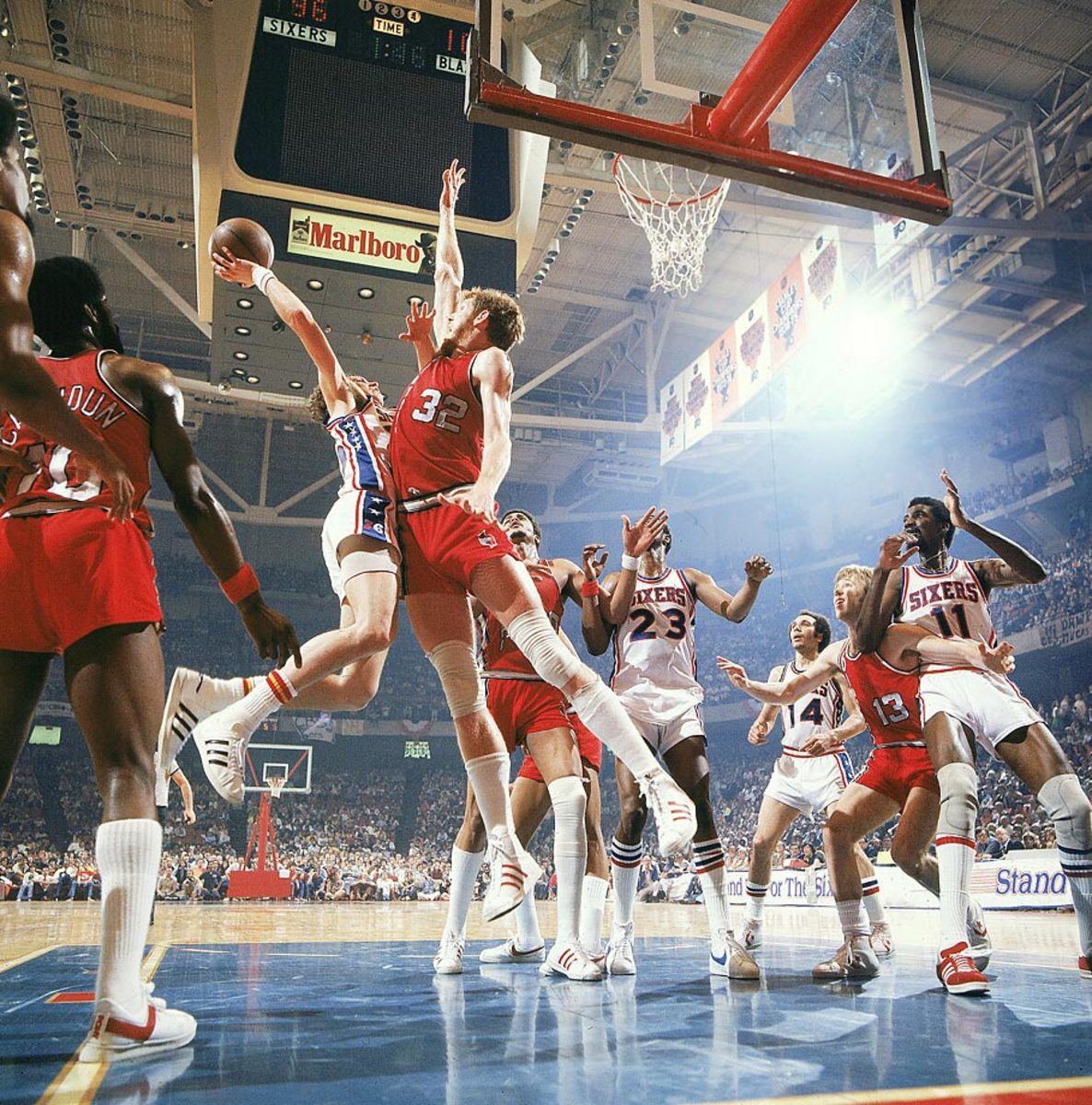
Bill Walton of the Trail Blazers contests a shot by Doug Collins of the 76ers. Walton galvanized the Blazers, who won the series in six games behind his Finals MVP-winning 18.5 points and 19.0 rebounds per game.
1976
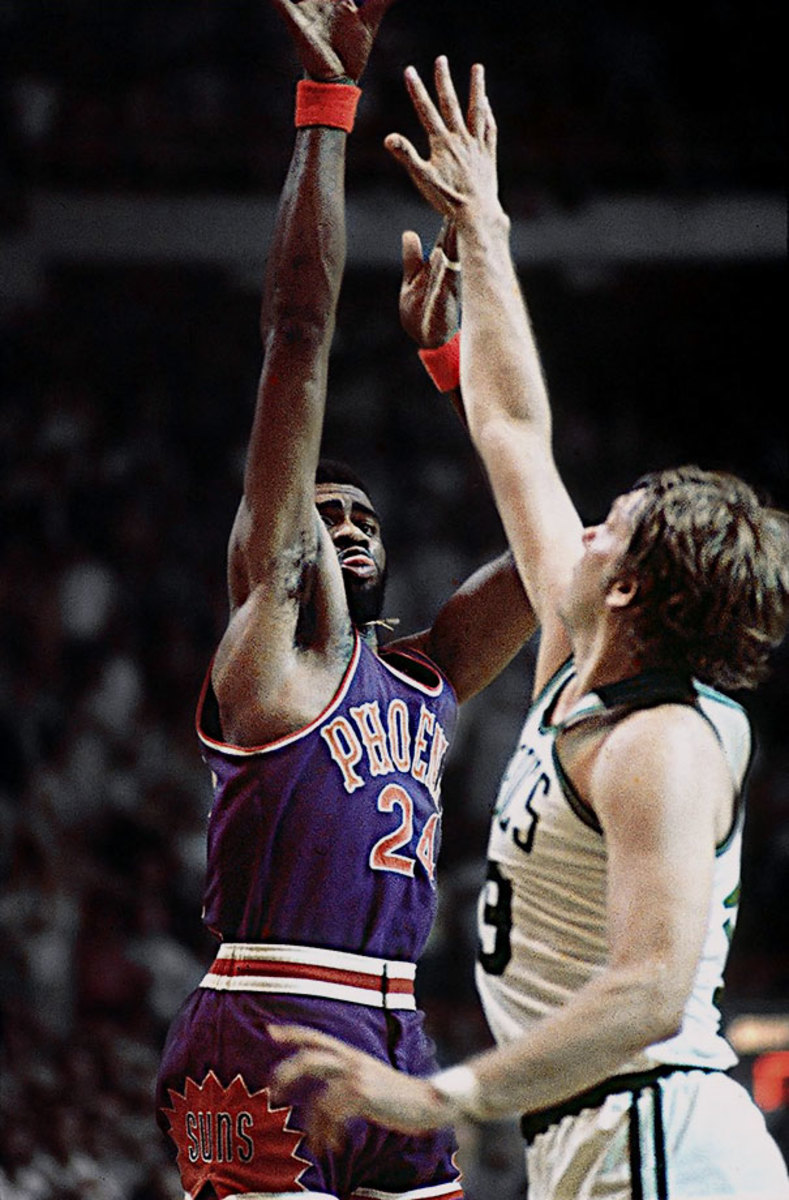
Gar Heard of the Suns releases the game-tying shot at the double-overtime buzzer against the Boston Celtics in Game 5. Boston prevailed 128-126 in the third OT, and took the series in six.
1975
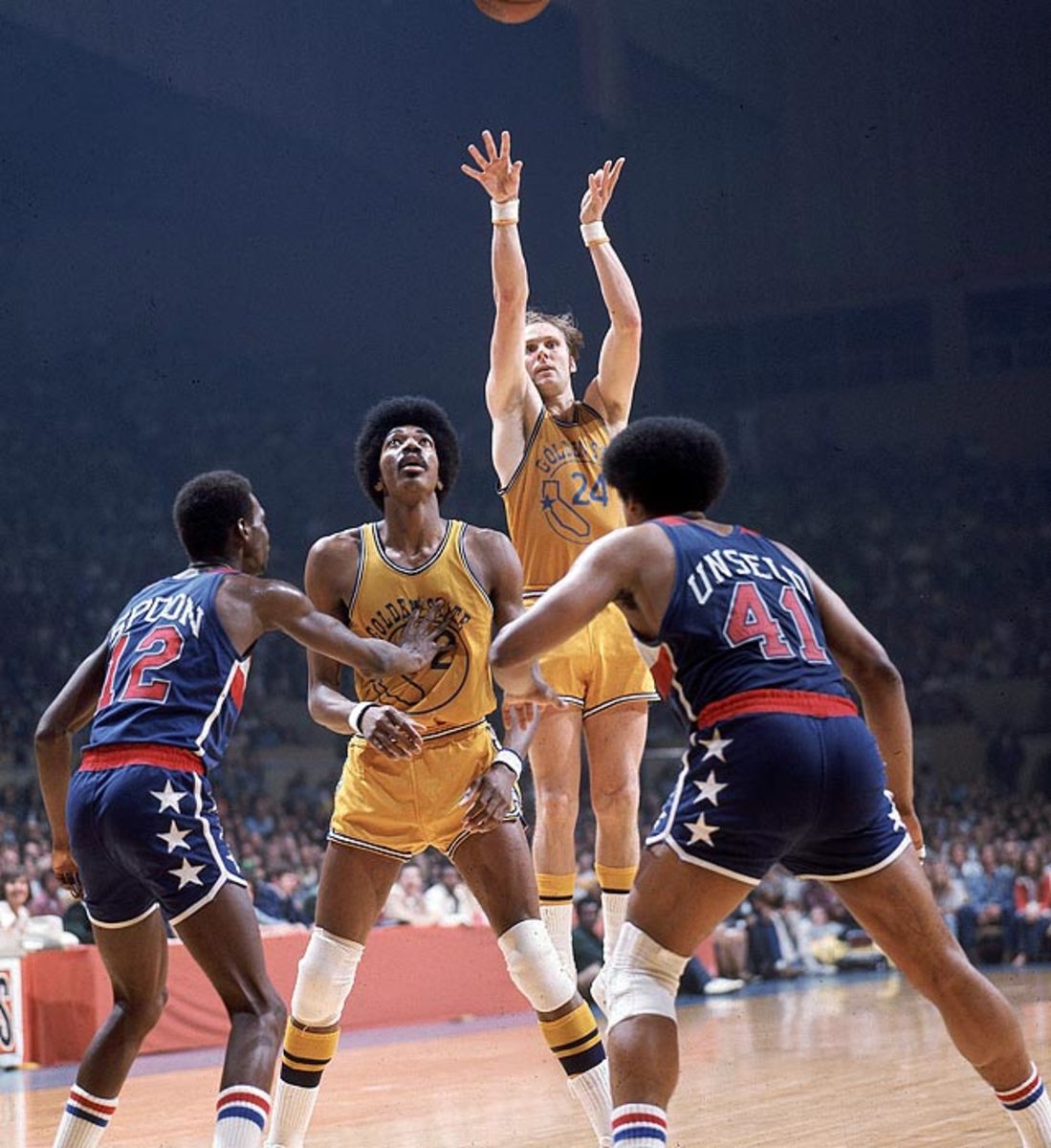
The underdog Warriors were bolstered by a red-hot Rick Barry, who led the team in a 4-0 sweep of the Bullets. Barry averaged 29.5 points, 5 assists, 4 rebounds and 3.5 steals in the series.
1974
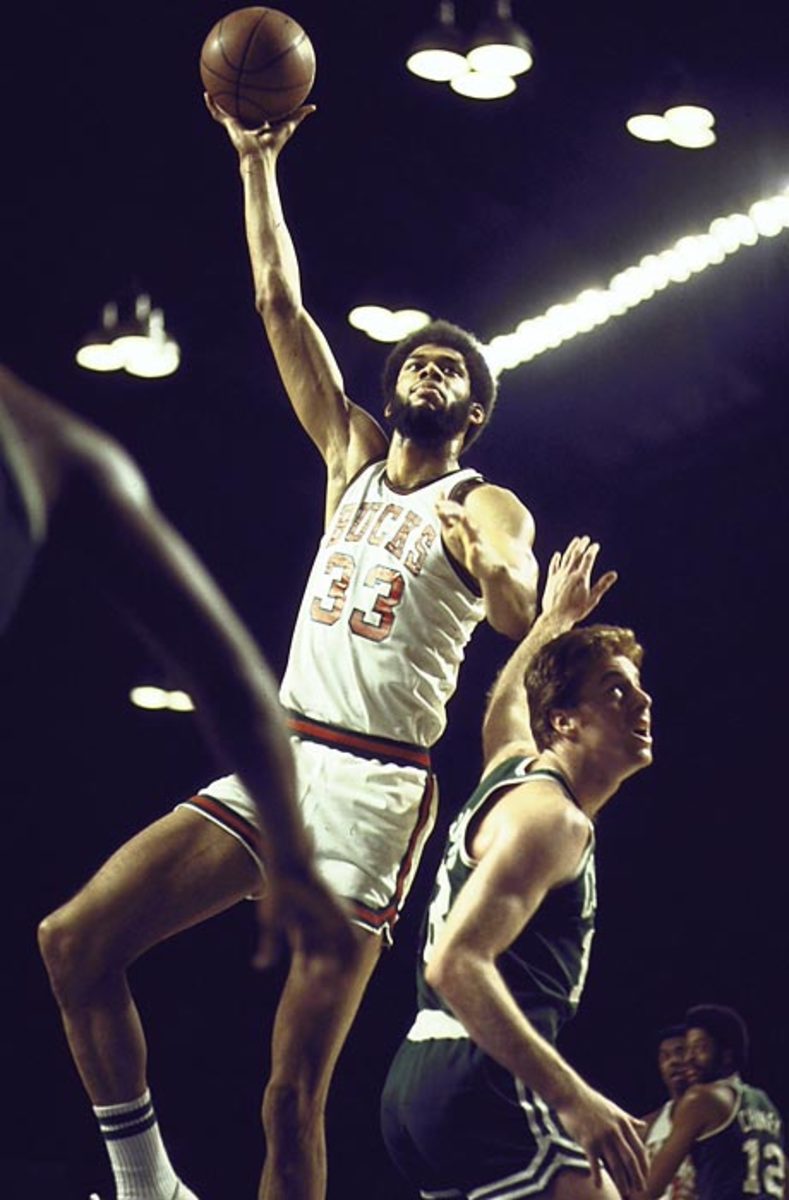
Kareem Abdul-Jabbar paced the Bucks, averaging 32.6 points per game and deploying his signature sky hook to seal Game 6, but the Celtics would pull it out in a seventh game.
1973
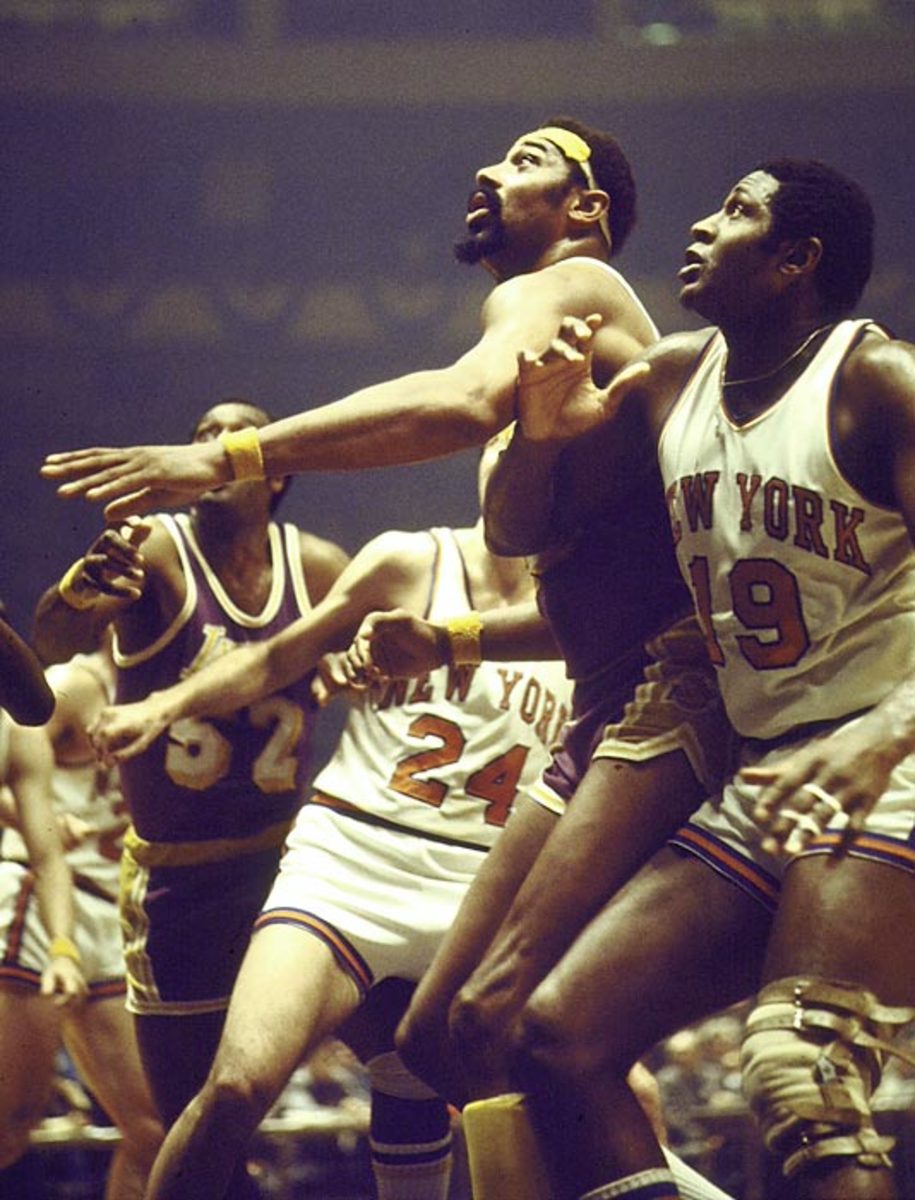
The Lakers and Knicks clashed in a rematch of the previous year, but this time it was New York in five, and Knicks center Willis Reed (19), not L.A.'s Wilt Chamberlain (center), named MVP (16.4 points, 9.6 rebounds).
1973
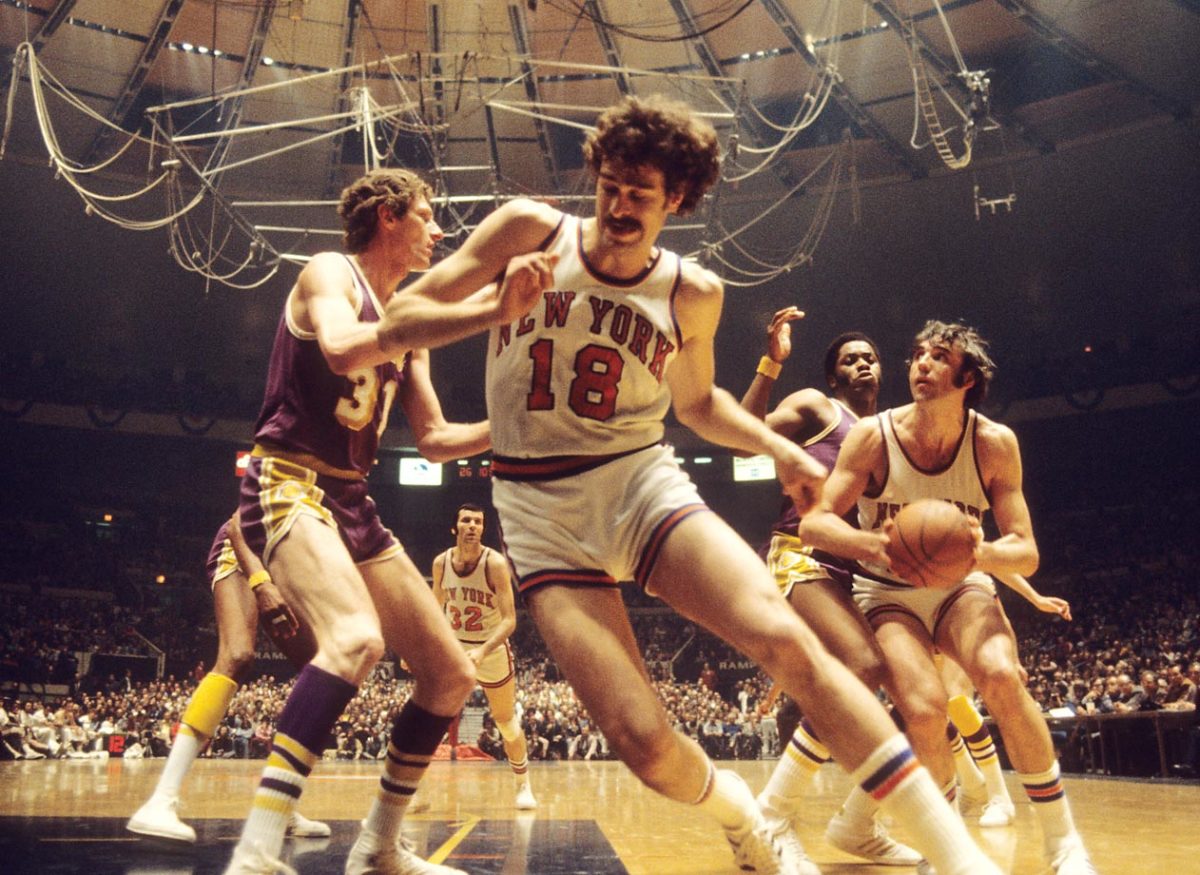
Knicks Dave DeBusschere (with ball) and Phil Jackson (18) in action against Lakers Jim McMillian and Mel Counts (31) during Game 3. The Knicks would win 87-83.
1973
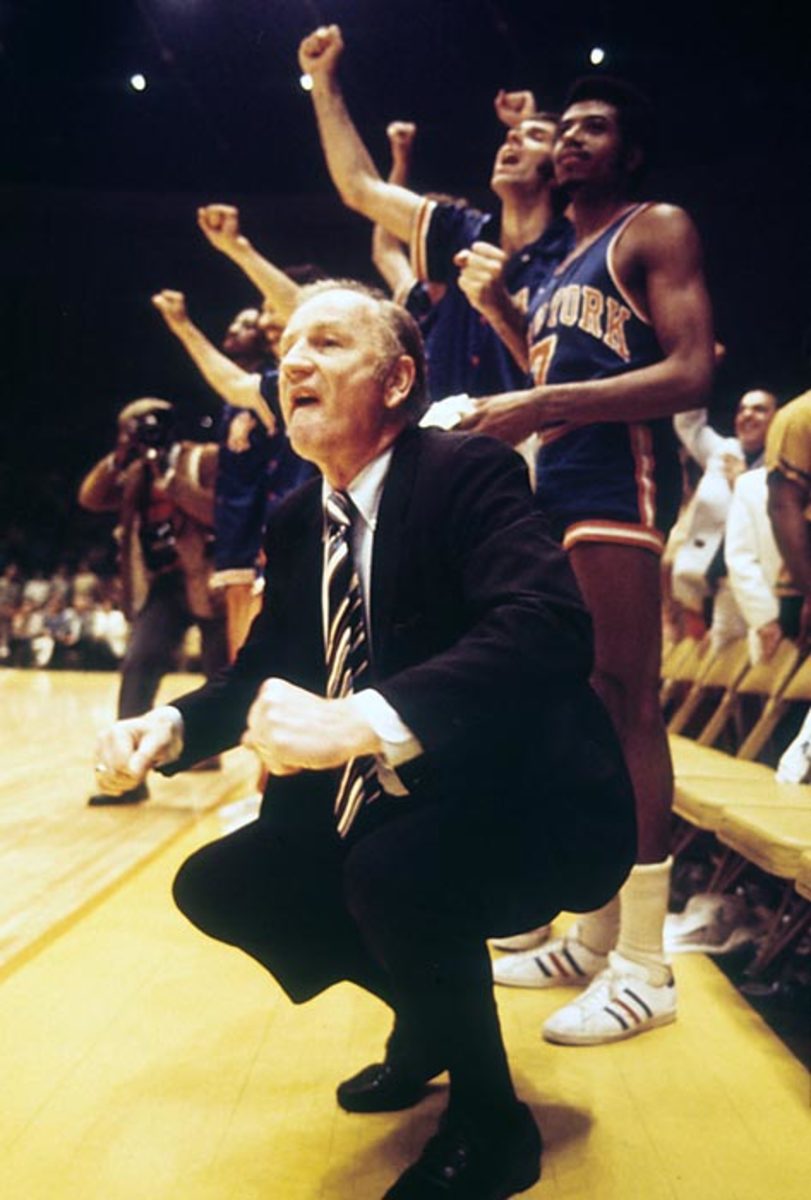
New York Knicks coach Red Holzman celebrates on the sidelines during Game 5. Earl Monroe scored 23 points for the Knicks in the series-clincher.
1972
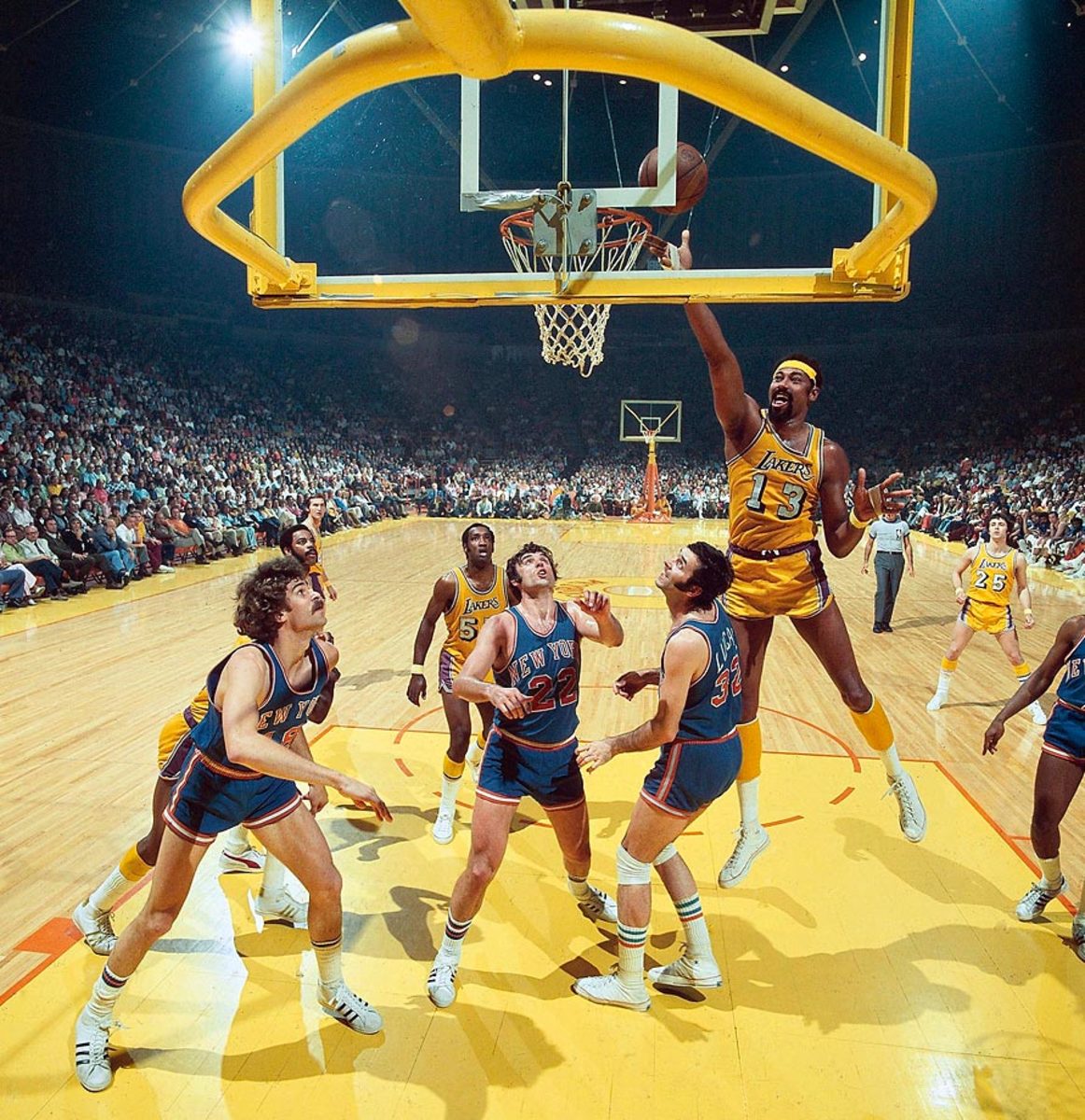
Lakers center Wilt Chamberlain took home Finals MVP honors as the Lakers defeated the Knicks in five games and won their first title since moving to Los Angeles. Chamberlain averaged 19.4 points and 23.2 rebounds on the series.
1971
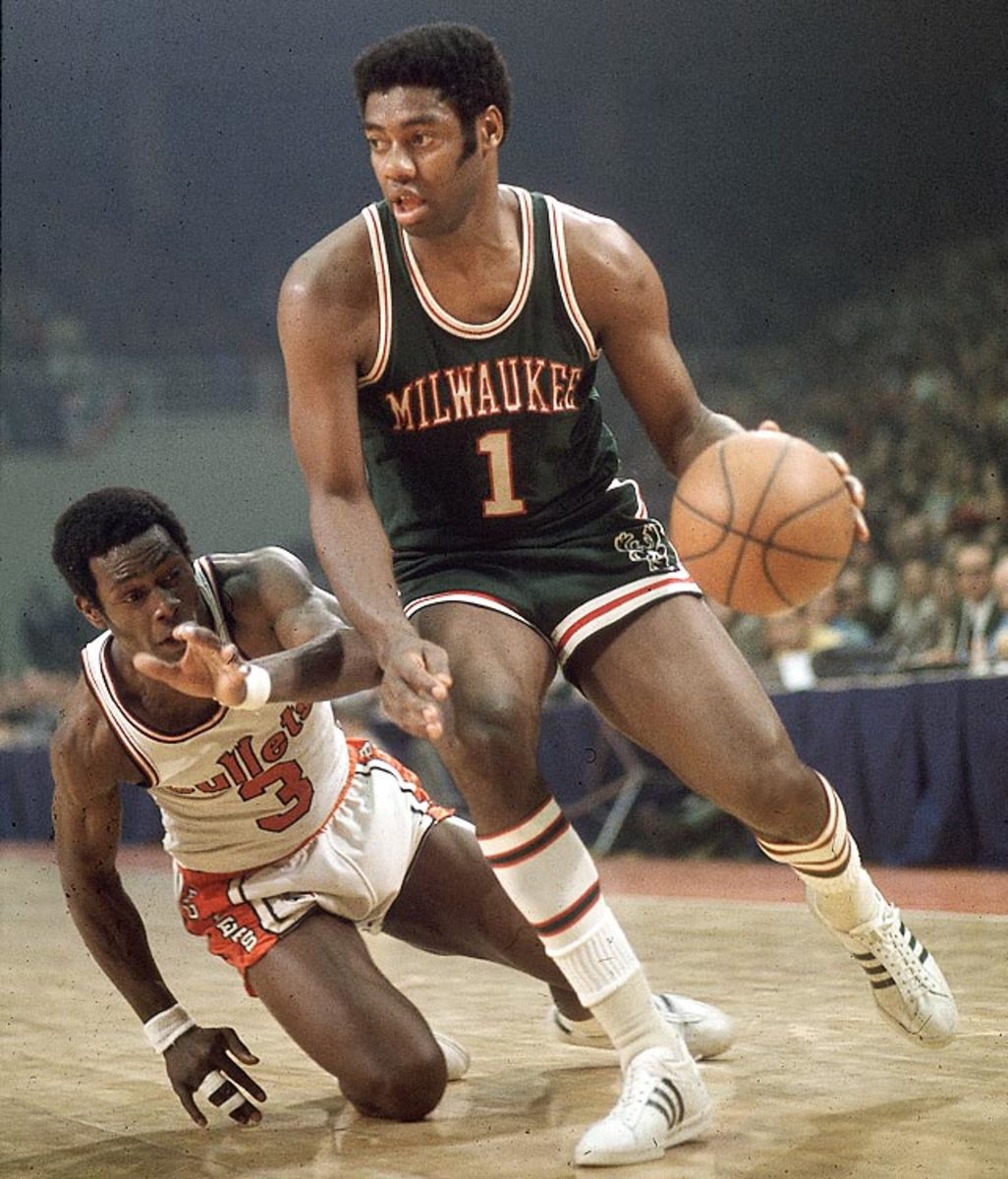
Oscar Robertson led Milwaukee on a 4-0 sweep of Baltimore in his first season joining up with Lew Alcindor and the Bucks. Robertson had 30 points in the series-clincher.
1971
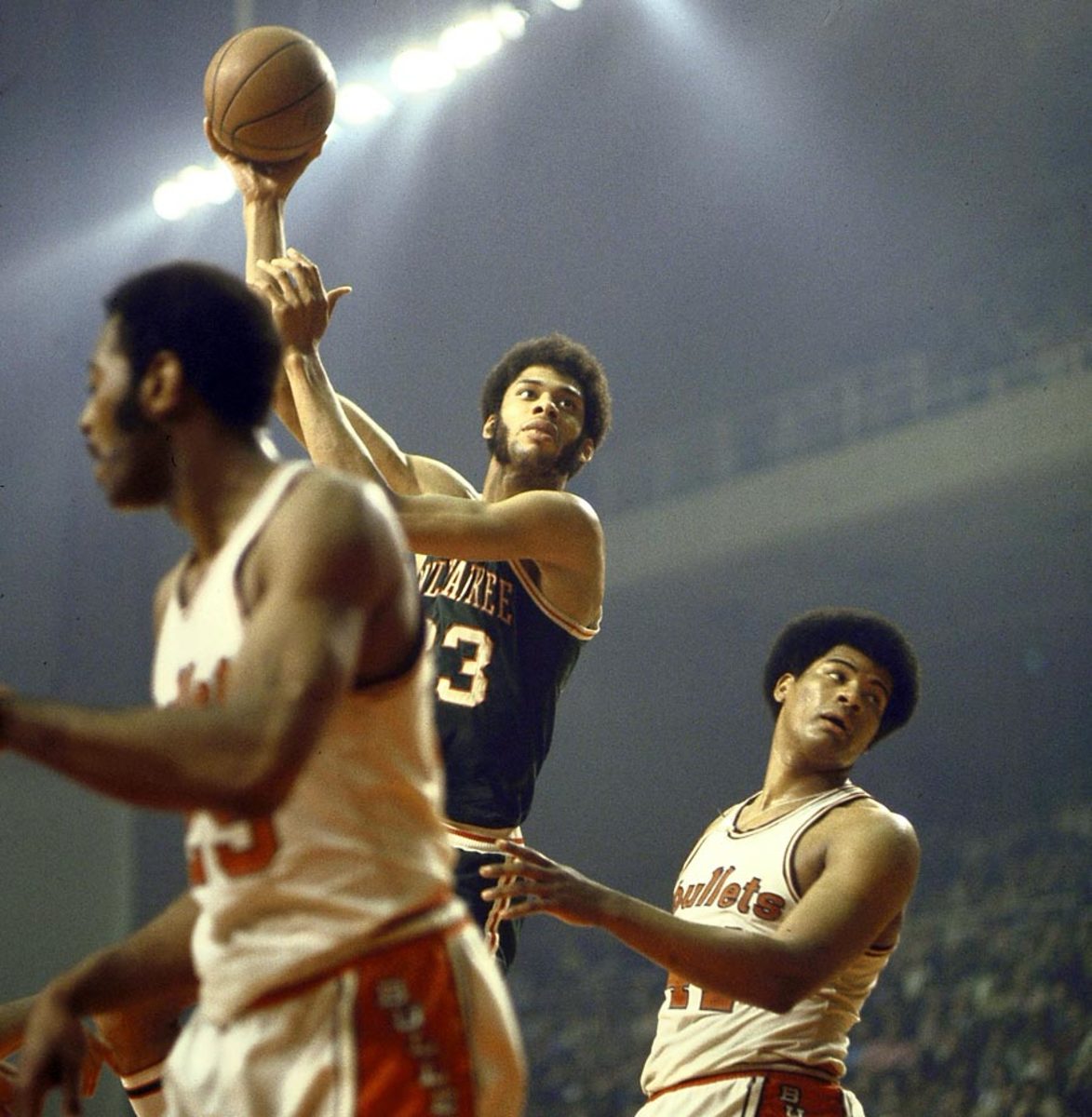
Lew Alcindor lofts one of his signature hook shots. Alcindor won the Finals MVP award, averaging 27 points and 18.5 rebounds in the four-game Milwaukee sweep.
1970
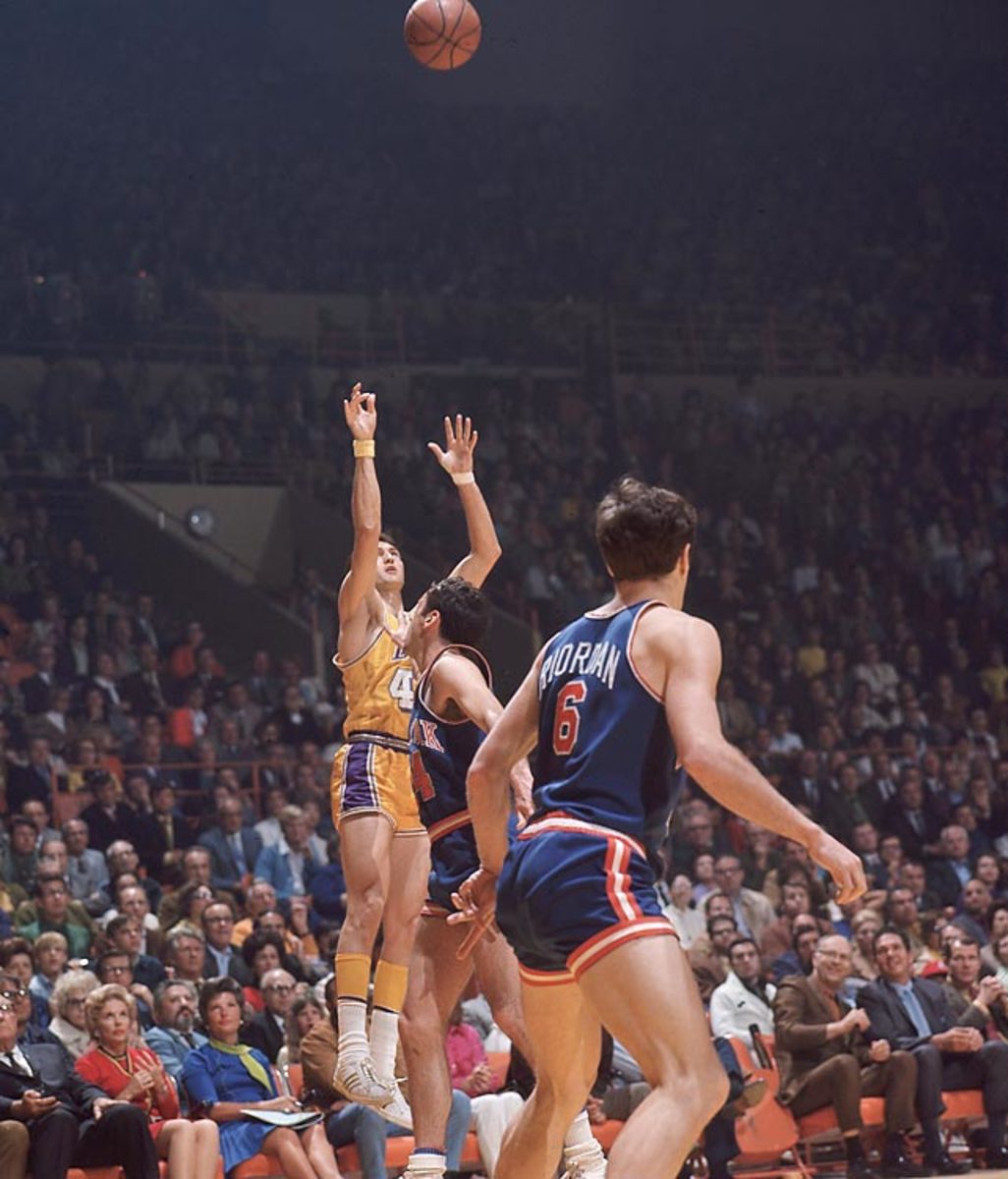
Jerry West of the Lakers launches a shot against the Knicks. West drained a dramatic, desperation 63-footer as time expired in Game 3 to send things to overtime. The Lakers went on to lose that game and dropped the series to New York, 4-3.
1970
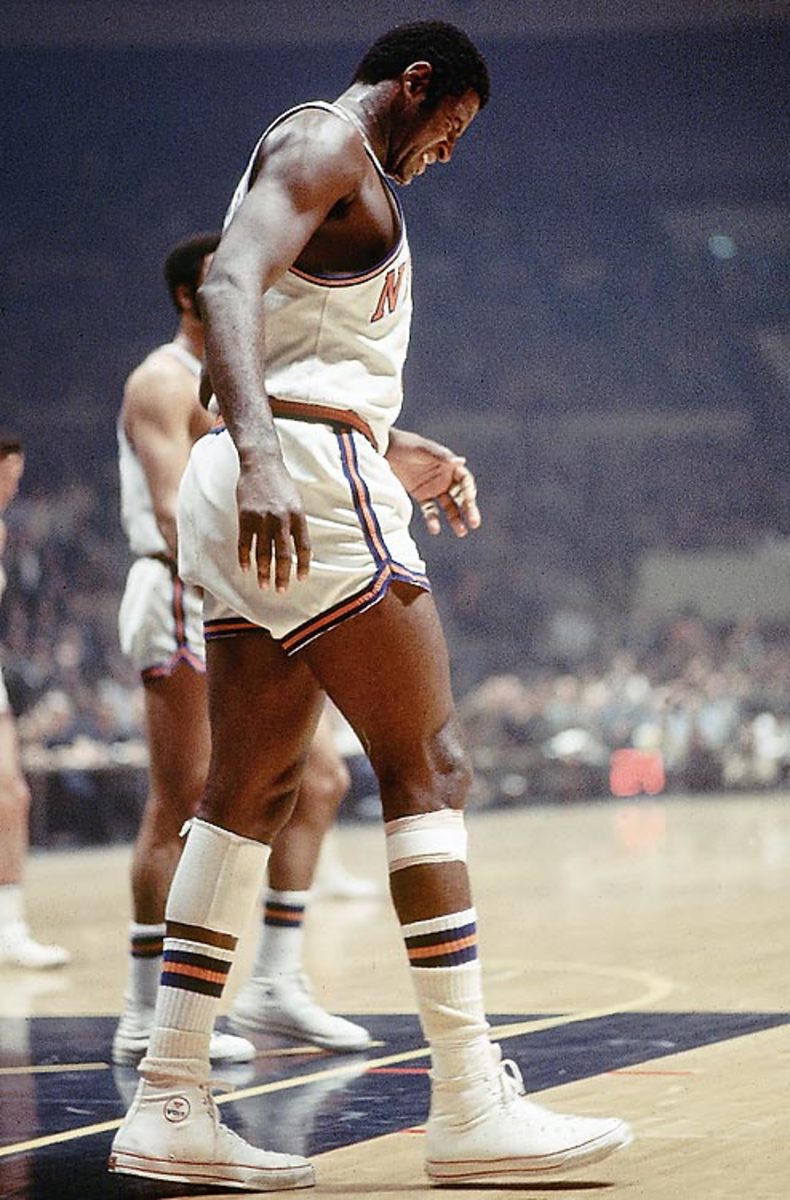
In Game 7 of the 1970 finals, injured Knicks center Willis Reed made a dramatic surprise entrance, scoring the first two baskets of the game in front of a packed Madison Square Garden crowd.
1970
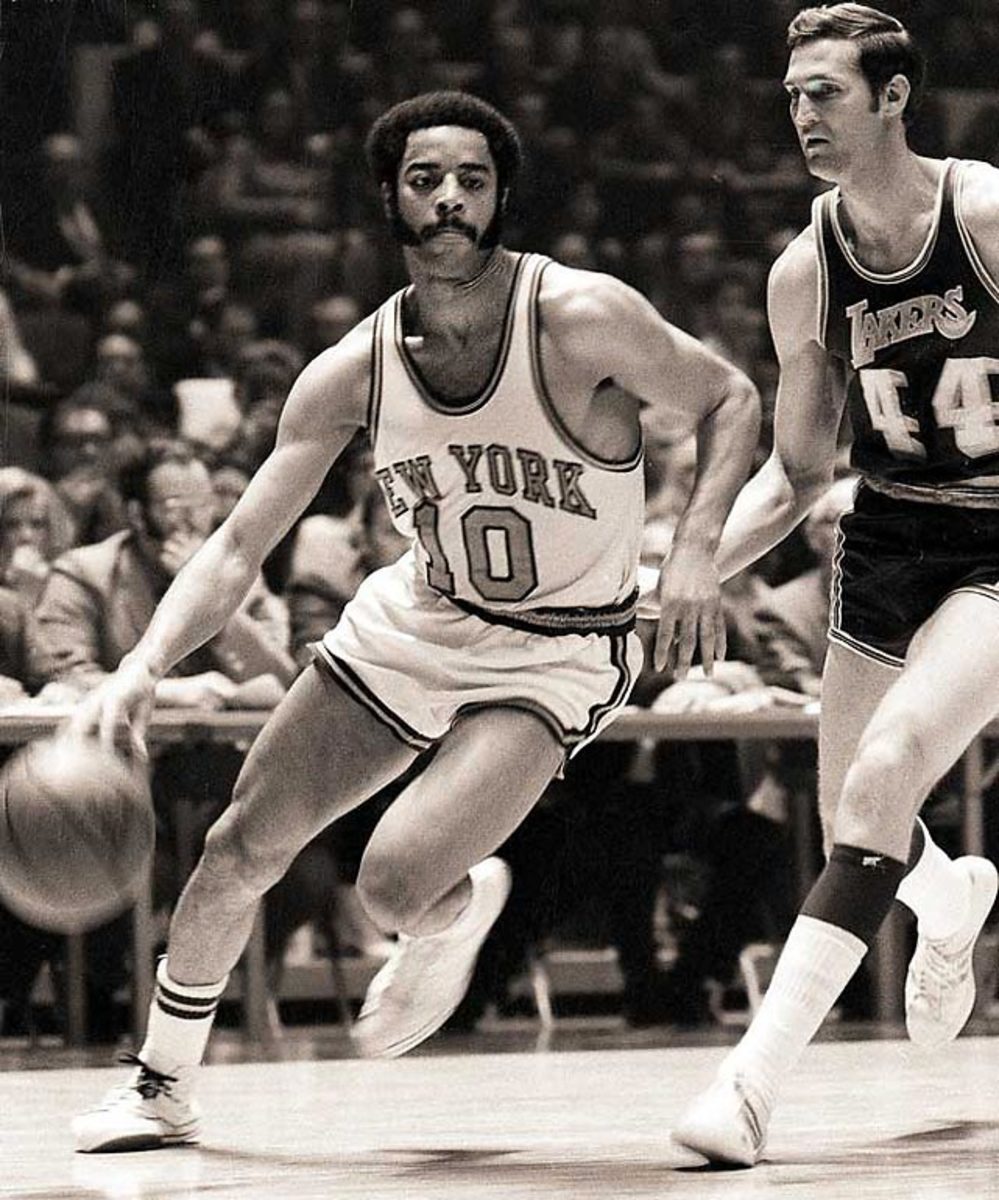
Reed got the crowd excited, but it was Walt "Clyde" Frazier, whose 36 points and 19 assists propelled the Knicks past the Lakers 113-99 to win the championship.
1969
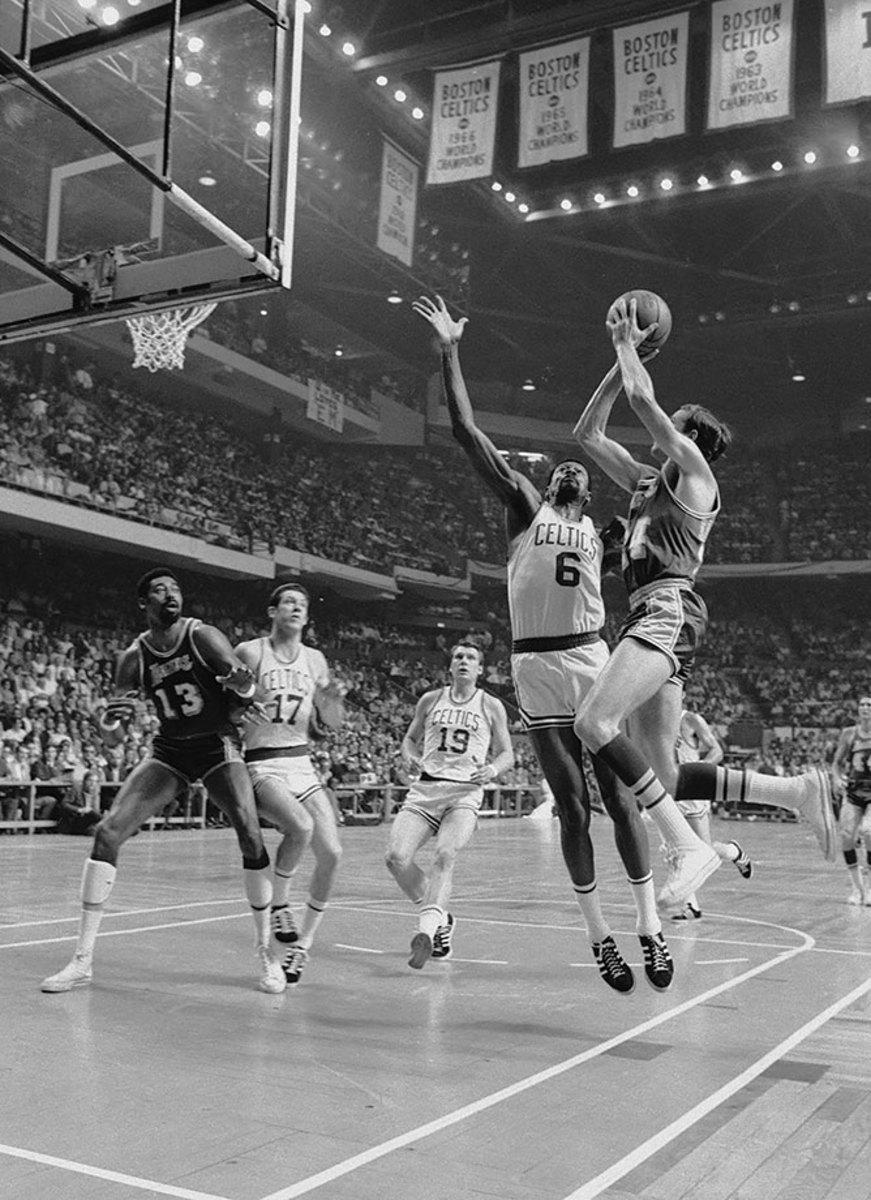
Bill Russell attempts to block Jerry West in Game 3 between the Celtics and Lakers. The Lakers were heavily favored (West averaged 38 points in the series on a squad that also had Wilt Chamberlain) and jumped out to an early 2-0 lead, but the Celtics came back to hand player-coach Bill Russell his final championship.
1969
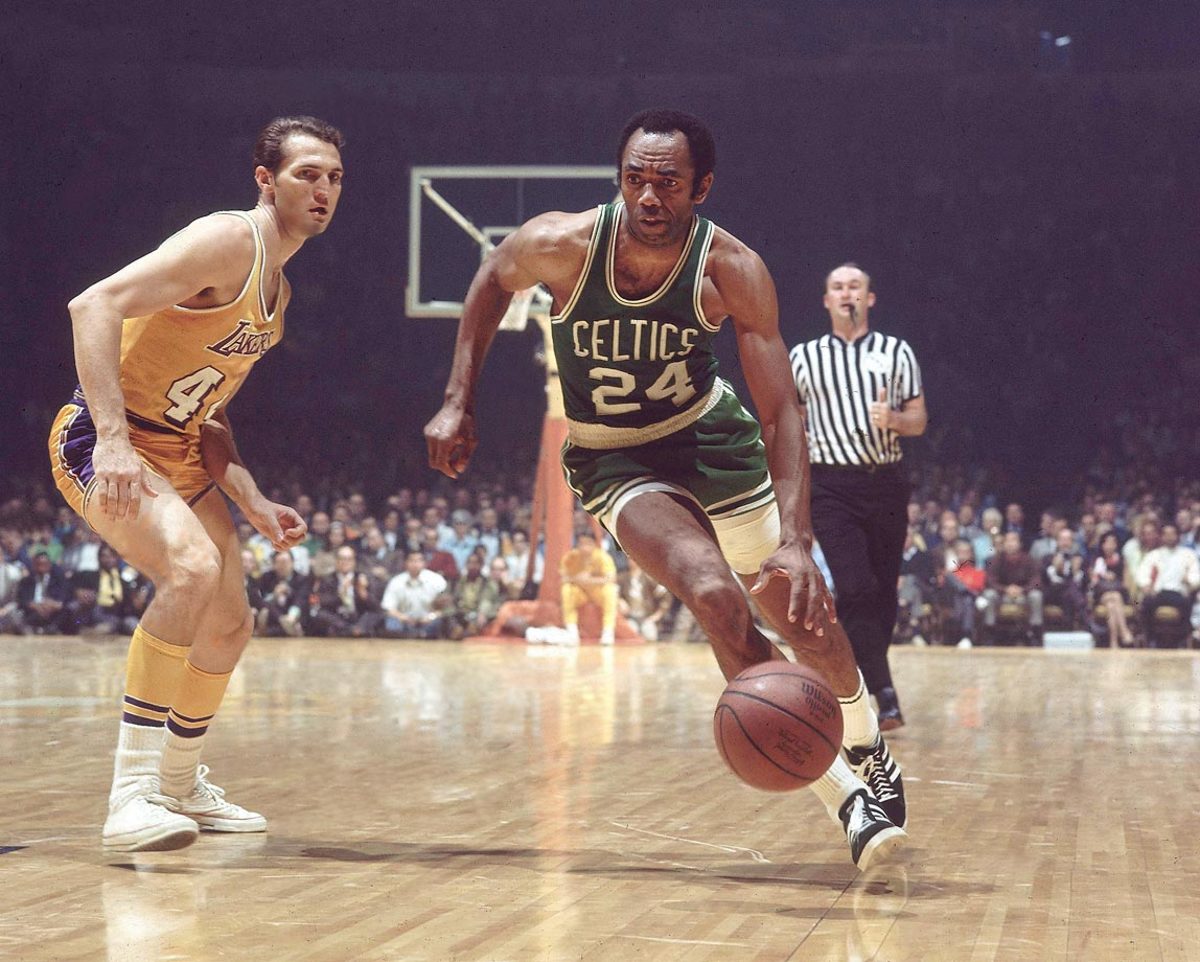
Sam Jones of the Celtics dribbles around Jerry West of the Lakers. Jones would hit the game-winner in Game 4 of the 1969 finals to even the series at two games. Boston would go on to take the title in seven.
1968
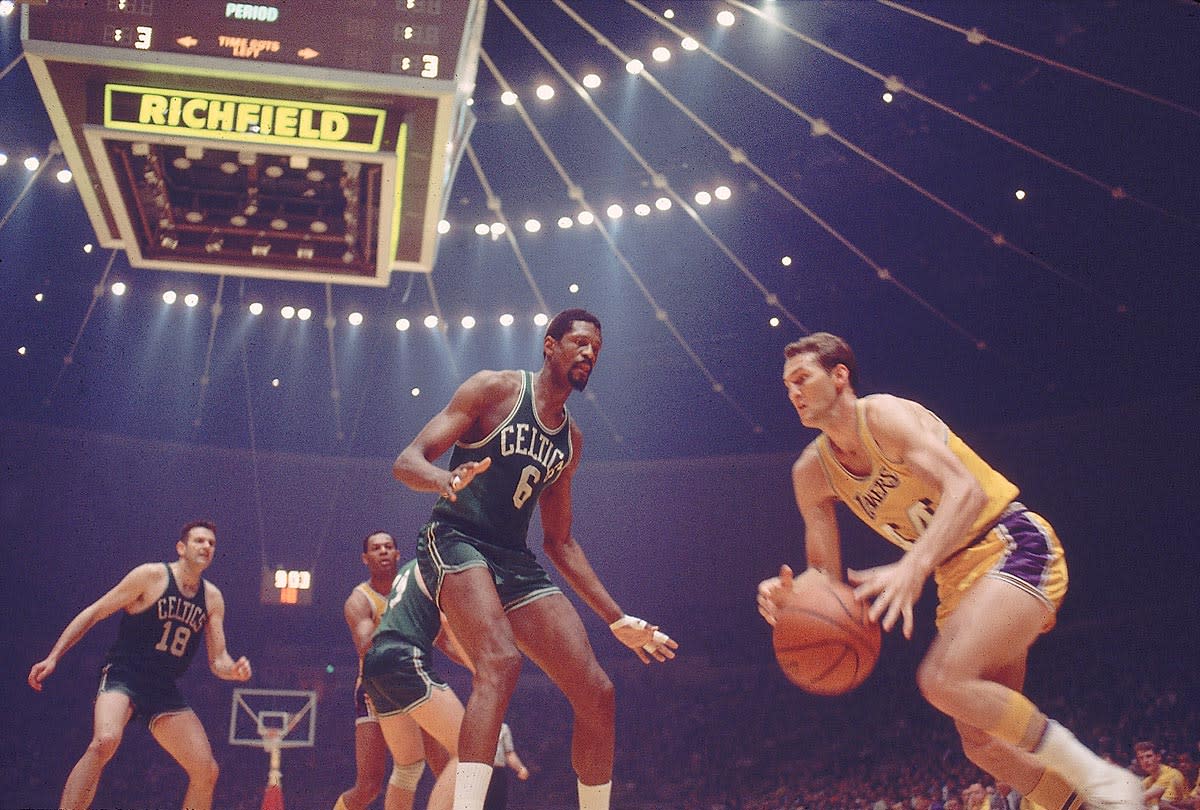
Lakers guard Jerry West drives past Celtics center Bill Russell in Game 6. Boston went on to a 124-109 win at the Forum to clinch the series 4-2.
1966
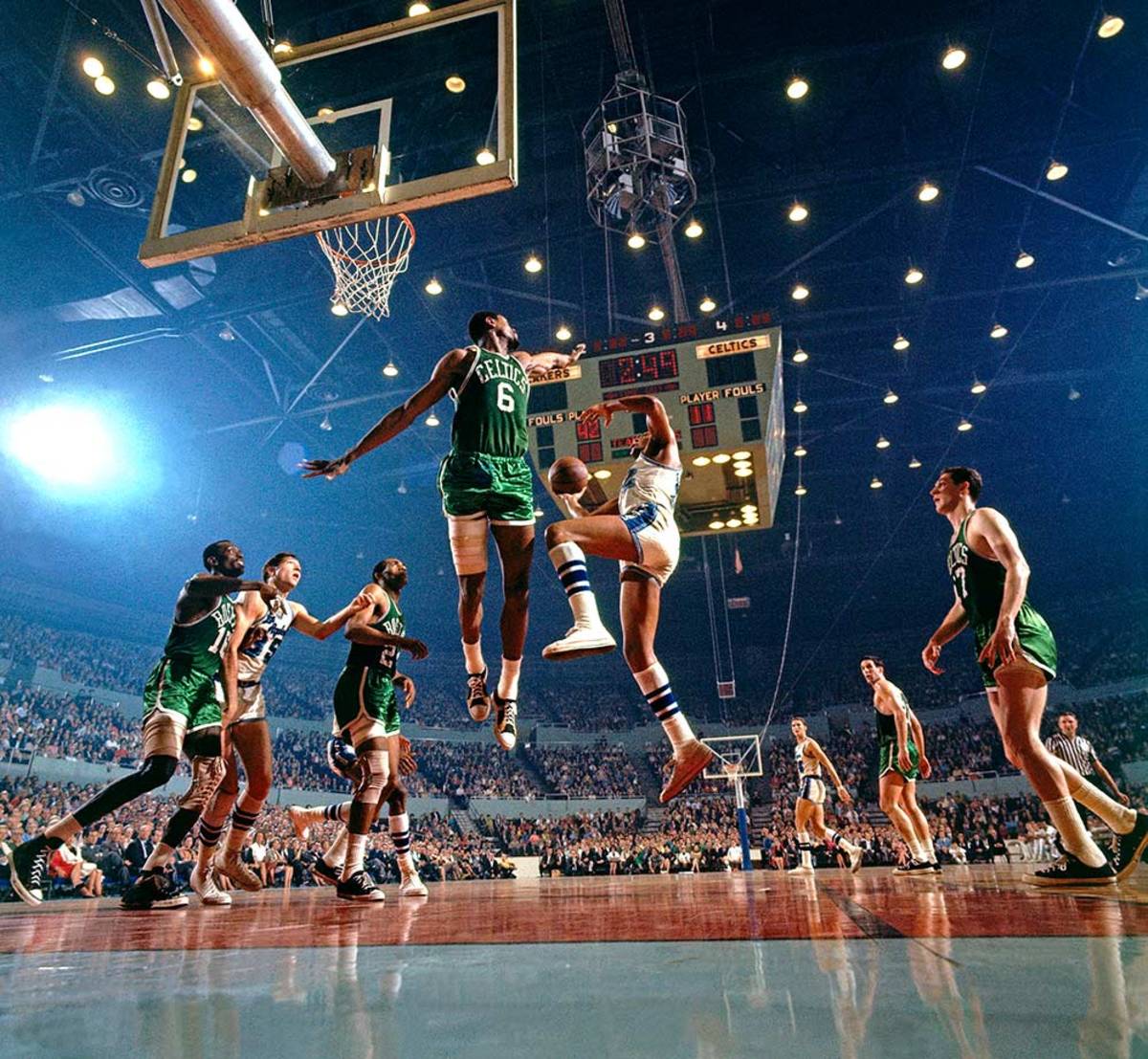
Bill Russell leaps to block Elgin Baylor. Russell and the Celtics were a constant thorn in the Lakers side, defeating them for five of their eight straight titles (1959-66).
1966
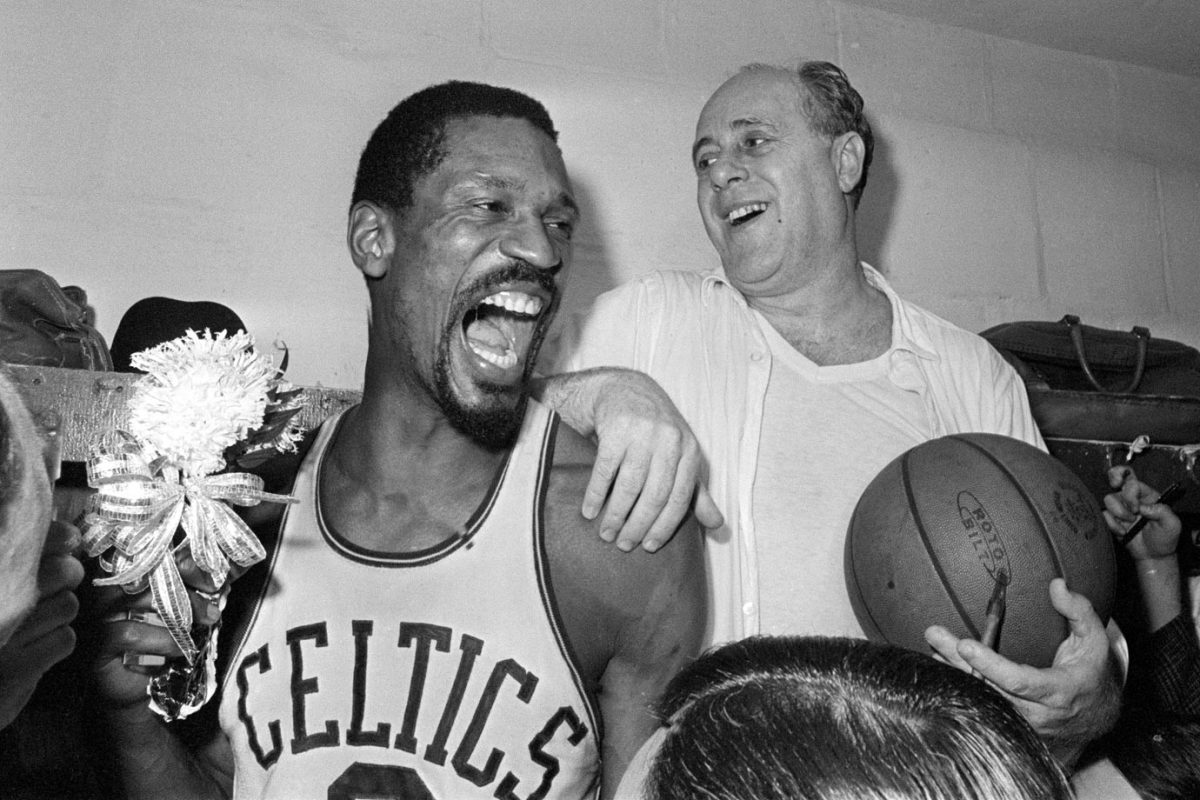
Bill Russell holds a corsage sent to the dressing room as he celebrates with Celtics coach Red Auerbach after defeating the Lakers, 95-93, in Game 7 to win their eighth-straight NBA championship.
1962
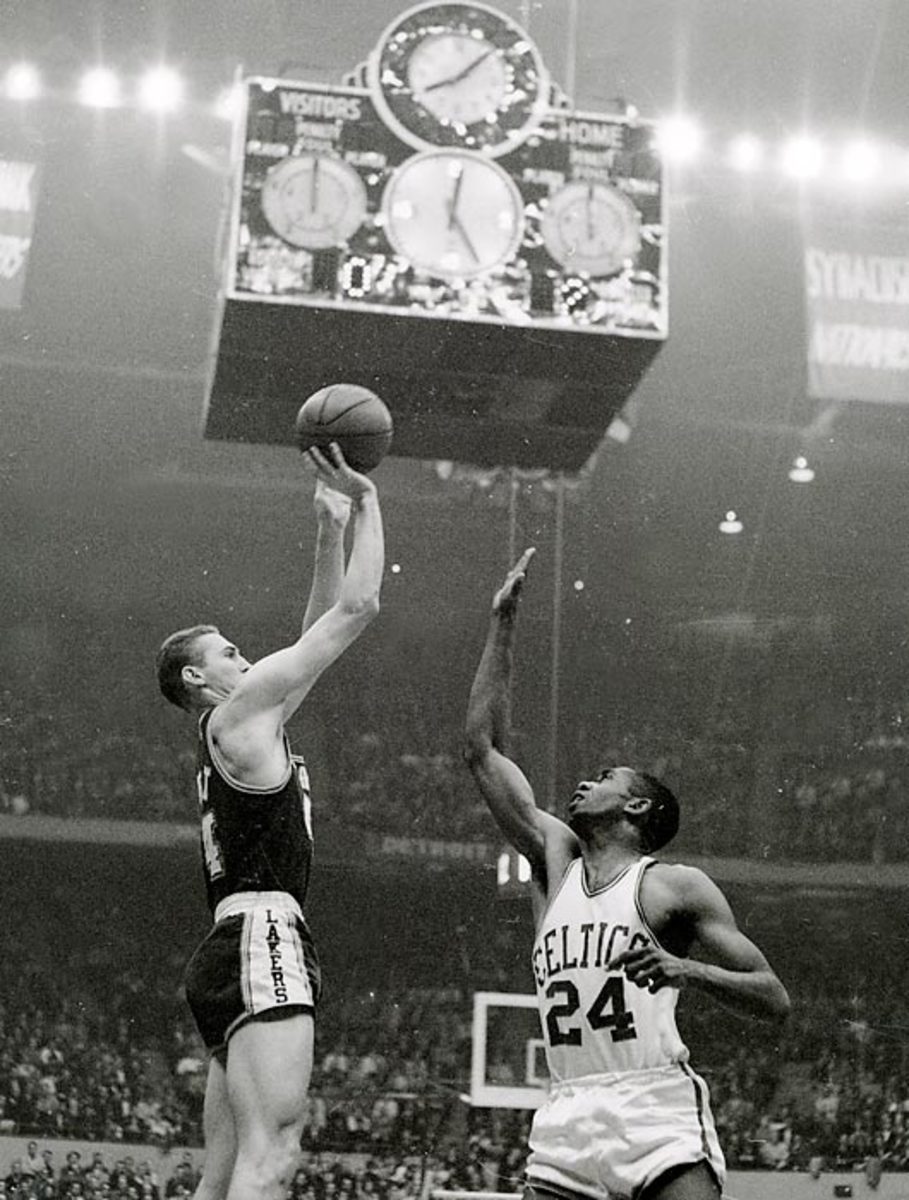
Jerry West of the Lakers elevates for a jumper in Game 7 against the Celtics. West scored 35 points, but Boston would win the game and the series.
1962
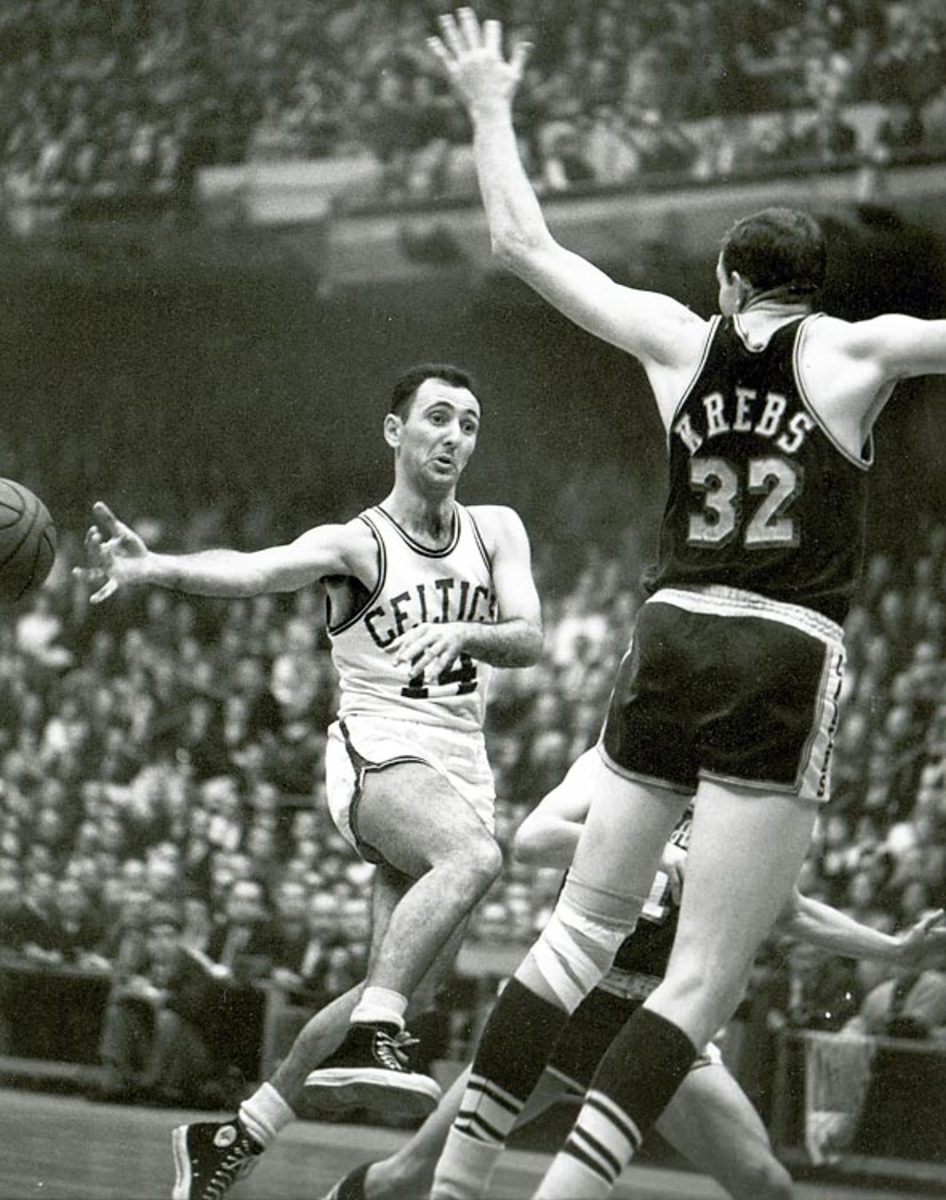
Celtics point guard Bob Cousy (14) throws a no-look pass in Game 7. Later that game, he would famously elude several Lakers and dribble out the clock to deliver Boston the title.
1962
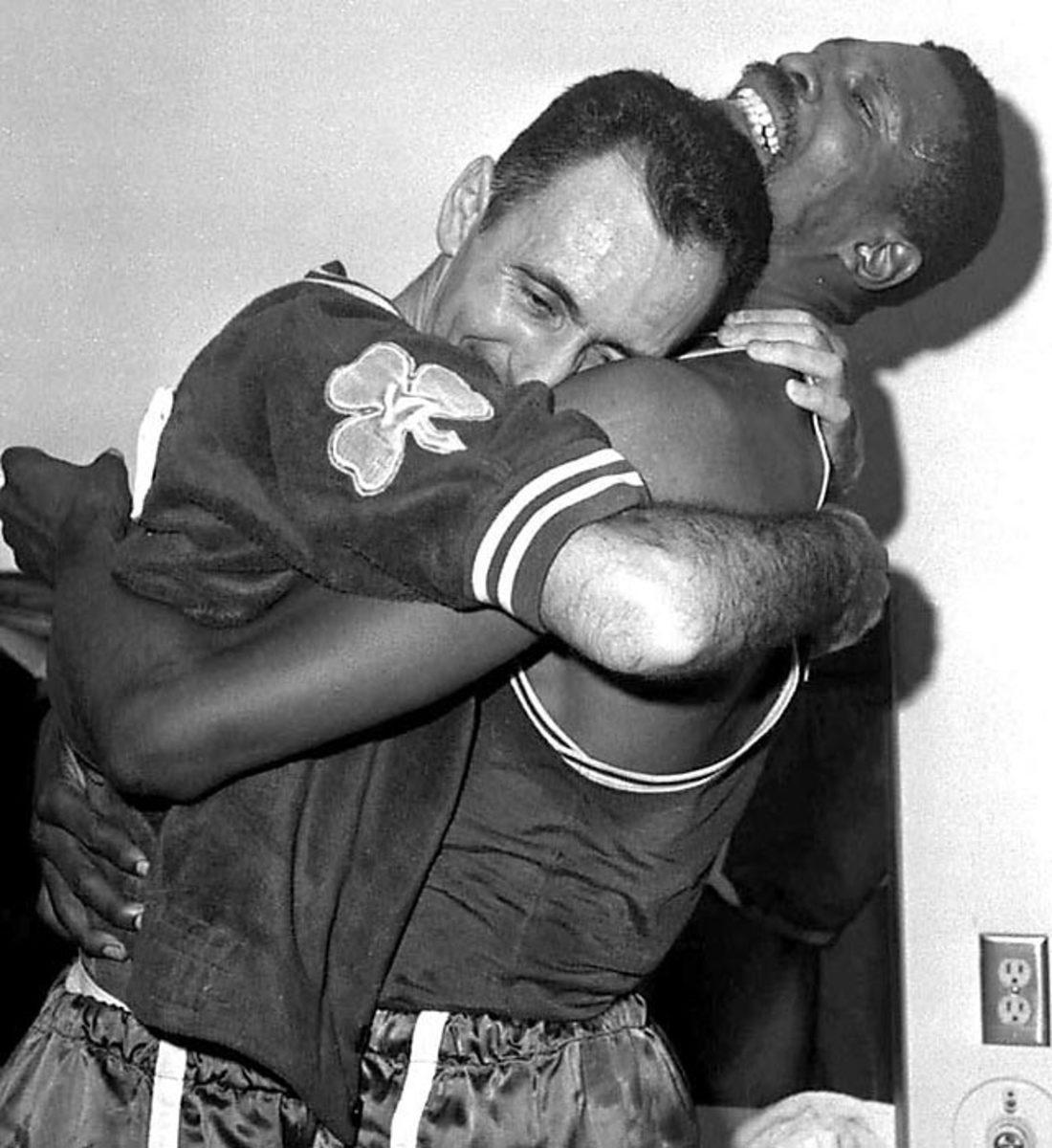
In one of the greatest winner-take-all games in NBA history, the Celtics beat the Lakers for the title, 110-107 in overtime, behind Bill Russell's 30 points and 40 rebounds.
1962
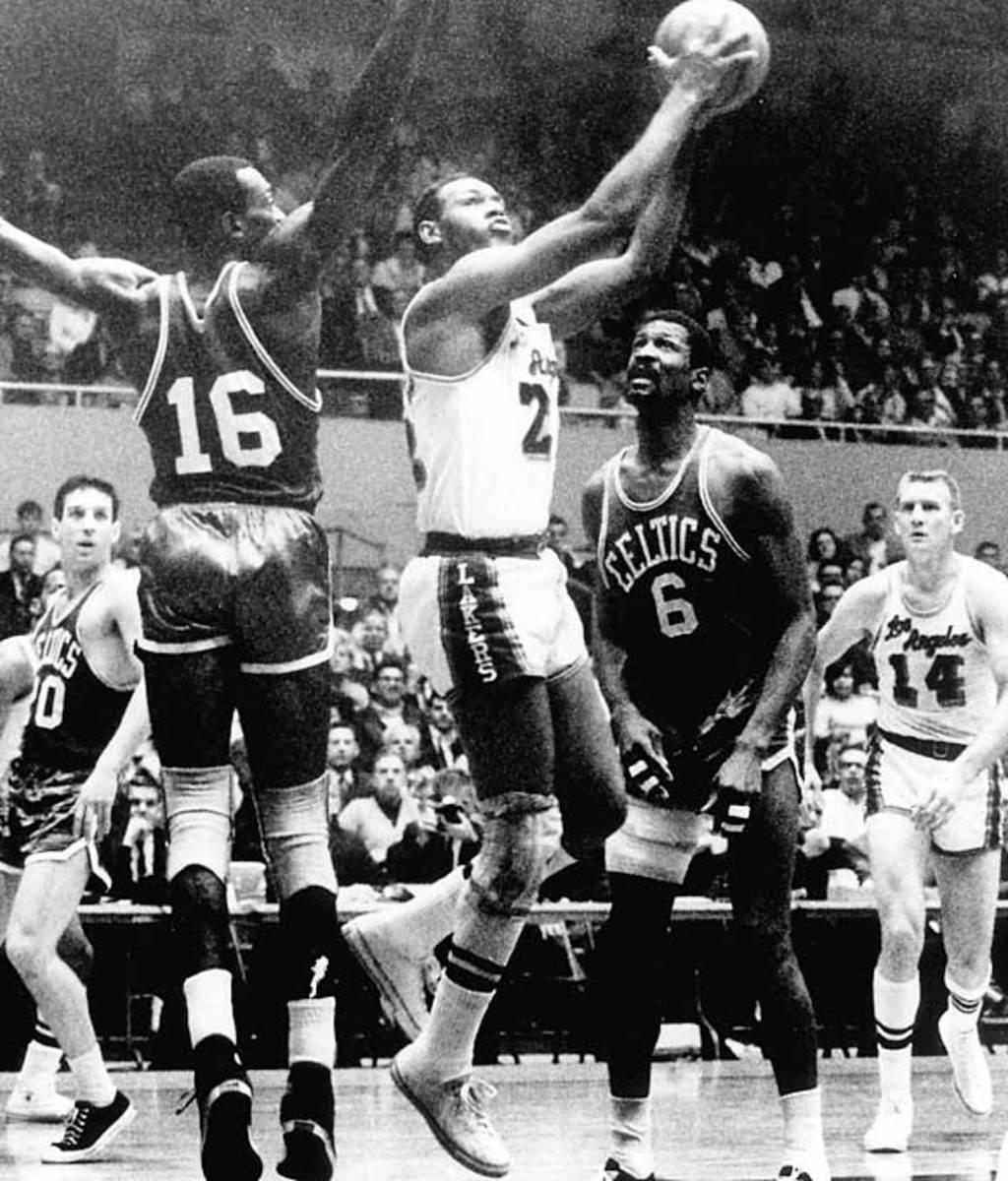
Elgin Baylor of the Lakers erupted for a Finals-record 61 points and grabbed 22 boards against the Celtics in a 126-121 Game 5 win at Boston Garden. The Lakers took a 3-2 series lead in what became a classic first finals meeting between L.A. and Boston.
1957
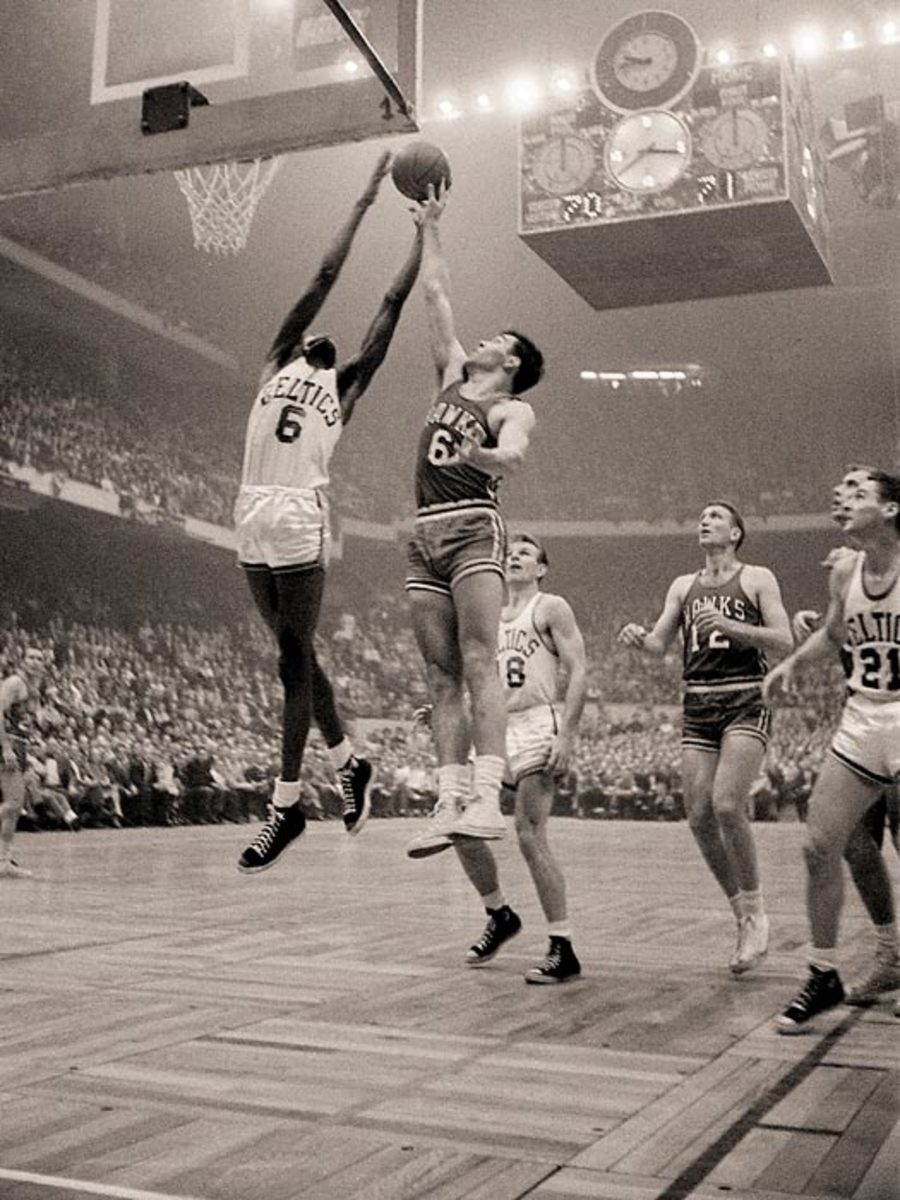
Bill Russell of the Celtics grabs a rebound over Cliff Hagan of the Hawks in Game 5 of the 1957 finals. The Celtics won the game 124-109 and took the series in seven in Russell's rookie year after acquiring his rights in a trade with ... St. Louis.
1949
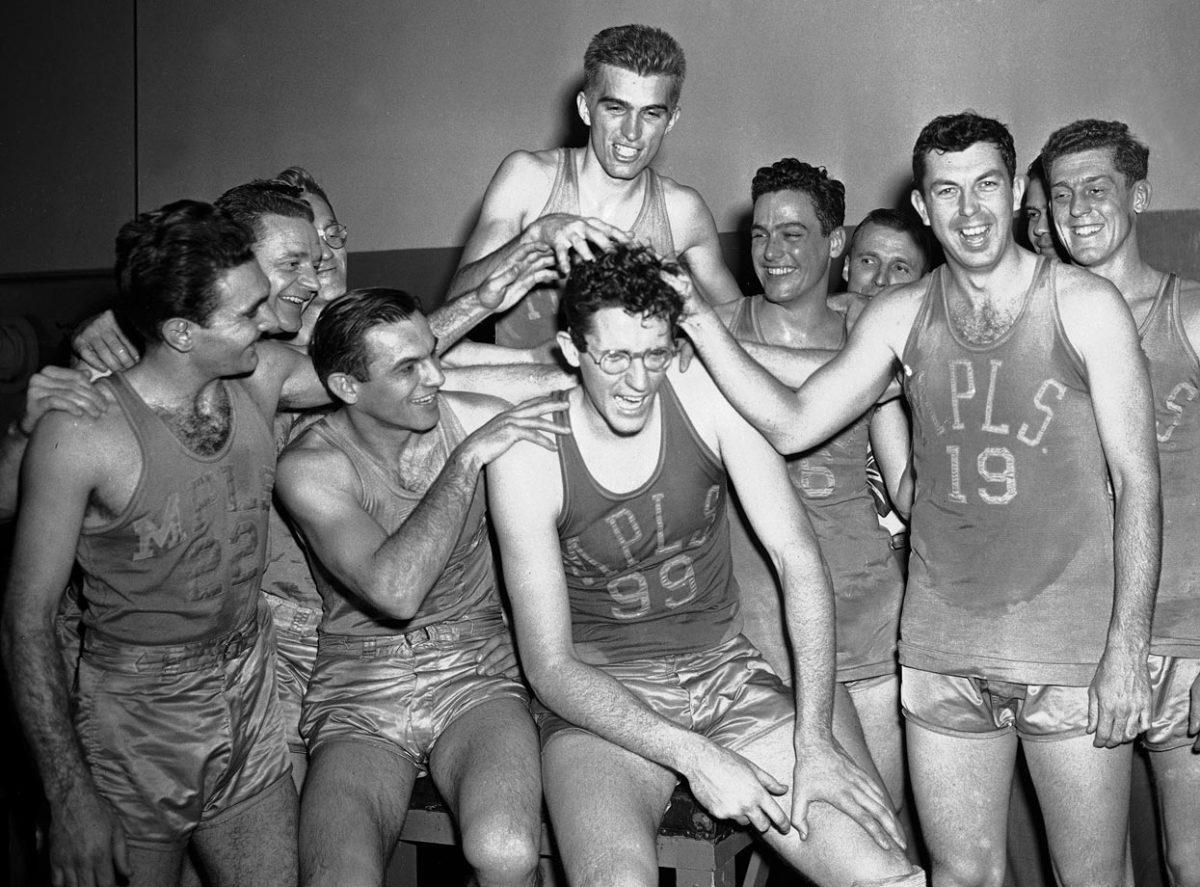
Lakers center George Mikan (99) gets his hair mussed by teammates after leading Minneapolis to its first-ever championship. Mikan set a Madison Square Garden scoring record with 48 points in a 101-74 victory over the Knickerbockers. The Lakers' 101 points also set an all-time team high scoring mark at the Garden.
Not two minutes had passed in the third quarter before Golden State’s rotation twisted further. Andrew Bogut, after leaping to swat away a J.R. Smith runner, came down awkwardly in the same space as Smith. Bogut’s left knee buckled with the contact. He never made it up the floor on the ensuing Warriors possession, nor was he able to get back to his feet when the Cavs returned looking to score. Bogut, who is no stranger to serious injury, writhed instead on the baseline, clutching his left knee. Bogut exited with what was later diagnosed as a left knee sprain and did not return—forcing Golden State to make do without its two best defensive bigs. Losing Draymond Green for the night sapped the Warriors of their flexibility. Losing Bogut, too, denied them their best conventional option as well.
Warriors coach Steve Kerr responded by having his team go even smaller than usual, employing a lineup of Stephen Curry, Klay Thompson, Shaun Livingston, Andre Iguodala, and Harrison Barnes for critical stretches. That group suffered defensively, as one might expect, but also never found a particularly dangerous rhythm to its offense. There’s something to be said for the way that Green balances the offensive operations of the Warriors’ best lineups that can’t be easily replicated. He’s not the best shooter nor the quickest off the dribble, and yet Green fills space and roles in such a way that even a versatile guard like Livingston can’t quite imitate his function.
• MORE NBA:Watch complete highlights from Cavaliers’ Game 5 win
#http://www.120sports.com/video/v183840678/cavaliers-take-game-5
Those lineups, too, tussled the Warriors’ matchups by Kerr’s own choice. Rather than dedicate Iguodala to James, Golden State opted to have him guard Kevin Love in order to protect the thinner Livingston. That arrangement did little but to marginalize what Iguodala does best and position Livingston for a different kind of vulnerability. With neither Green nor Bogut available to provide needed help, the Warriors couldn’t rally behind and around their least favorable matchups.
Golden State needed tremendous efforts from a handful of players—Curry, Iguodala, Thompson, and Barnes, most notably—to finish the series in Green’s absence. The Warriors lost because they failed to get them. Sometimes basketball is as simple as that, and as straightforward as to be determined by stellar achievement in the absence of specific, counterbalancing personnel.
